Westminster

BULLETIN | SPRING 2023
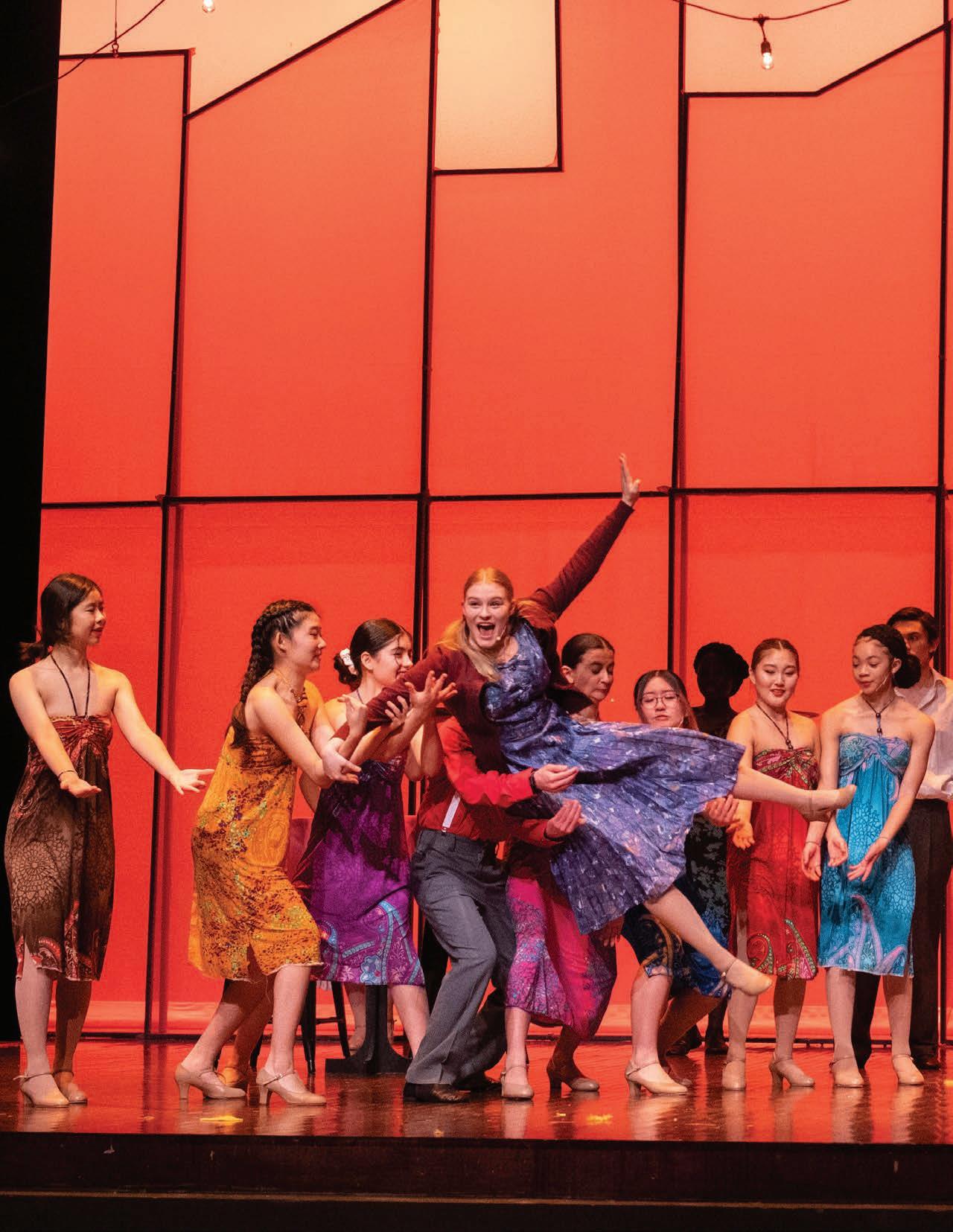

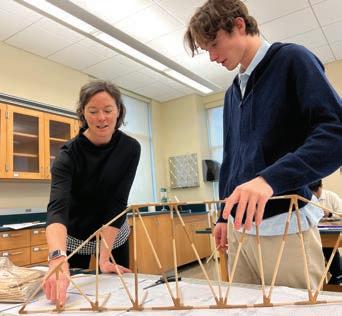
Westminster
| SPRING 2023 Mark de Kanter and Kathleen Devaney Departing 20 Three New Elective Courses Offered 24
BULLETIN
On the cover: Tomasina Pearman ’23 works in the lab during biotechnology class. See article on page 24.
Photo by Kelly Lucas.
On Feb. 17, Dramat performed the musical “Guys and Dolls”. View more images of the production on page 8.
2 Head of School Message
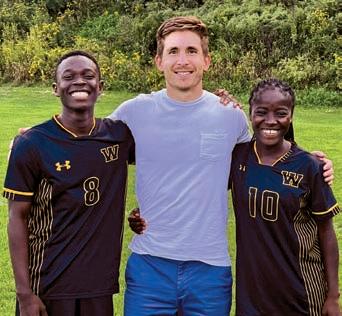
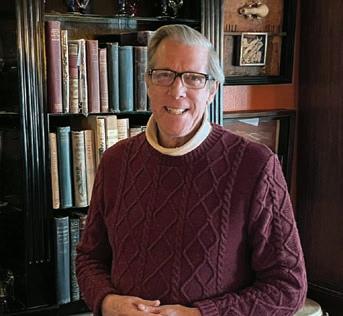

3 Hill Headlines
12 Athletics
14 Trustees Changing Roles
30 The Road to Westminster
40 Janet Bowler Bates ’01, P’24, and Women in Construction
47 Reader Survey
48 From the Archives
49 Supporting Westminster
56 Class Notes
60 In Memoriam
64 Closing Thoughts
Spring 2023 1
Alumni Authors Write on Timeless Virtues 42 Will Smith ’10 Expands LEAD Edu 34
Dear Westminster School Community,
As my early morning flight climbs in the sky out of Bradley International Airport, the sun peeks over the horizon, an auspicious gesture given my destination. I am en route to the Horizons National Conference where I will support Kathleen Devaney, Executive Director of Horizons at Westminster, in her presentation on “Recruiting, Sustaining & Retaining Your Key Players — Horizons Summer Staff’’ to a national audience. My traveling companion is recently retired faculty member Amy Stevens, who is also the incoming board chair for our Horizons Advisory Board. Since the inception of our Horizons at Westminster program, Kathleen and Amy have been two of many integral, instrumental and essential players in its success.
This summer, our Horizons at Westminster adds a sixthgrade class, which will usher in a new challenge –– the creation of a middle school — in addition to the current elementary K–5 enrichment program. This is certainly an exciting and perhaps — at times — frightening proposition; after all, middle schoolers are navigating change as they move from childhood to adolescence, and that ride can be equally exhilarating and awesome, tumultuous and turbulent.
As I think about the principal stories in this Spring Bulletin, I am struck by their thematic connection to middle school: So many of these stories are marking a moment in time of distinct change for Westminster — the matriculation of Booker Bradshaw Jr. ’58 as the first Black student and graduate; the transfer of board chair from Brad Raymond ’85, P’19, ’20, ’24, ’24 to Renée Lynch Carrel ’84, P’19, ’21; the departure of Kathleen Devaney and Mark de Kanter ’91, P’19, ’22 dedicated and transformational faculty who between them count 51 years of service on Williams Hill. While these features are about progress and evolution, about taking on the next challenge as a school or as an individual, they also reflect a certain level of uncertainty, which, while not at the mercurial middle school level, takes some time to settle.
Still, these are moments of strength for Westminster; this is when our motto of Grit & Grace, and our core values of Community, Character, Balance and Involvement serve us so well. This is certainly true regarding Booker Bradshaw. Despite not knowing how to navigate the matriculation of the first Black student at Westminster, the school assured Mr. and Mrs. Bradshaw that Booker “would, like any other boy, get recognition according to his own merits,” which he indeed earned with grit and grace as he navigated the challenging landscape of change during his time at Westminster.
There is a connection, too, between Booker Bradshaw and Horizons at Westminster. Booker Bradshaw and the many students of color who followed him helped Westminster to understand its own need to evolve. In that evolution, Westminster, under the leadership of Headmaster Peter Keyes, became a founding member of SPHERE, a consortium of Hartford area independent schools that endeavored to become and remain culturally diverse, inclusive, and responsive environments for teaching and learning.
As an outgrowth of this commitment, civics and history teacher Todd Eckerson P’09, ’11, ’17, ’21 created the Crossroads Cooperative Learning Program in 2011, which he lovingly shepherded for close to two decades before that vision morphed into our Hartford Partnership, the goal of which remains the same as the CCLP: to serve the young people of Hartford by extending Westminster’s core value of community into the city. Horizons at Westminster is at the center of our Hartford Partnership, which includes our volunteer service at Loaves and Fishes and our Spring Break in Hartford extended service program, and many of our students volunteer at our Horizons’ Saturday Academies during the school year or volunteer at our six-week summer enrichment program. It is through the Hartford Partnership that we make manifest our mission to help students “to commit to a life of service beyond self” — which, I might note, Will Smith ’10 embodies through Monrovia Football Academy.
It is not a stretch to think that Booker Bradshaw was the first step to Horizons at Westminster. As my plane touches down and I head to support Kathleen and Amy at the conference, I am grateful for our commitment to evolve, to embark on journeys that may be uncertain at times, and to embrace the evolution and the journey with grit and grace.
With Grit, Grace & Gratitude,
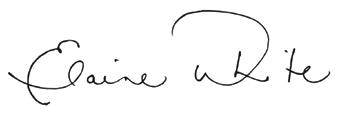 Elaine White Head of School
Elaine White Head of School
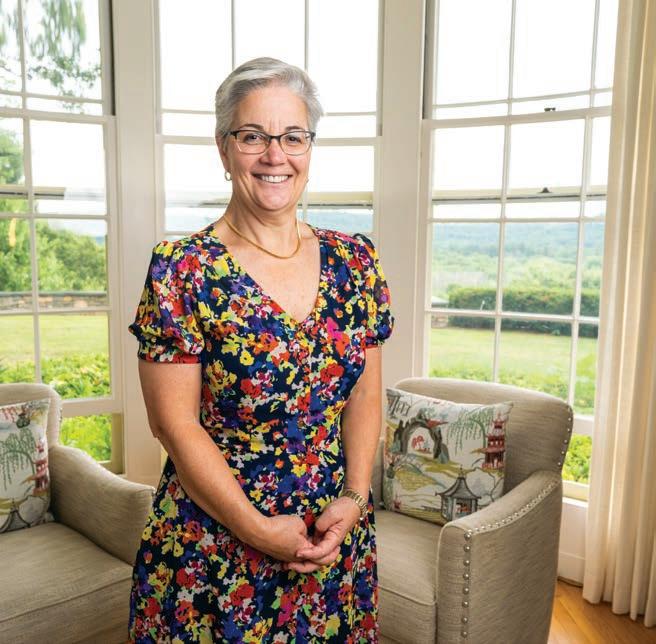
Westminster Bulletin 2
From the Head of School
Westminster Launches Strategic Planning Process
A successful strategic planning process not only informs a school on what it does well and where there is room for improvement, but also provides a blueprint for future growth and development. With this ambitious objective in mind, last May Westminster School launched its first strategic planning process in almost a decade.
The Strategic Planning Committee (SPC) is chaired by Renée Lynch Carrel ’84, P’19, ’21, vice-chair of the board of trustees, and Charlie Griffith III P’11, ’14, ’17, Coumantaros Family and William V.N. Philip History Department Chair and director of the Westminster Teaching Initiative. In addition to the chairs, the committee consists of 21 members of the Westminster community, including the department heads of college counseling, advancement and business; several faculty and staff members; members of the board of trustees; alumni; and current parents. Two subcommittees, one focused on Westminster’s academic program and the second on the afternoon program, are led by Academic Dean
Betsy Heckman and Athletic Director
Tim Joncas ’00, respectively.
“We want to know what Westminster is doing well and what uniquely defines the Westminster experience for our students, parents, alums and faculty,” said Carrel when the process began last spring. “We also want to know what they feel is missing or could be improved in terms of academics, skills, experiences and culture — so that Westminster can provide the best educational experience, stay relevant and competitive and attract the best students.”
For Griffith, the most noteworthy feature of the current process is its inclusiveness. “This process,” he said, “is broad, inclusive and transparent, and that is by design.”
Griffith continued, “We have intentionally included a wide range of voices in the process, so that we come away with a sense of where Westminster as a community needs to go, what direction it must go, and we have good, productive assessments from all those different groups. We have so many people here who are talented, bright and thoughtful and have worked here for a long time or have worked at other schools. There are lots of voices we want to incorporate into the process.”
The first phase kicked off last May with a survey that asked board members, faculty and current students how they would characterize the “ideal Martlet.” Then, over the summer, representatives of The Association of Boarding Schools (TABS) led workshops that walked committee members through the principles of sound strategic planning. Carrel and Griffith worked with Head of School Elaine White to home in on a plan that focuses on uncovering the school’s “Why?,” the compelling higher purpose that motivates the Westminster community.
During this process, which concluded this winter, educational consultant Drew Casertano, formerly the head of school at Millbrook School, led a series of focus groups with current students, staff, day parents, boarding parents, recent alumni and alumni of color, and conducted one-on-one interviews with educational consultants and veteran faculty at peer schools. Then, the committee reviewed the data.
“We are now moving into the realm of identifying specific strengths, weaknesses, opportunities, and threats, also known as SWOT, and trying to prepare for a diagnosis of what is keeping Westminster from maximizing our strengths and taking advantage of the opportunities we see and, on the other hand, managing or even correcting our weaknesses and anticipating and preparing for threats,” said Griffith. In February, the committee completed a broad community survey to quantify strengths and opportunities for growth and will share its analysis with the board of trustees.
Finally, using its analysis of SWOT, the committee will identify a few key priorities on which the school will focus its efforts. At that point, Griffith explained, “We will have honed a handful of initiatives that support our ‘Why Statement’ and that embody the unique identity and purpose of Westminster.”
In the final phase of the process, the committee will draft a plan, including specific tactics and goals that will be shared with the community next fall.
It will include a list of initiatives to be carried out over a three- to five-year period. “There will obviously be more initiatives that we will have to winnow down. We will have to make some choices, we will have to prioritize, we will need to see what’s meaningfully achievable, what’s achievable in two years, what’s achievable in five years,” said Griffith.
Griffith said the focus groups and interviews indicated a tremendous amount of support for Westminster and its identity — and particularly as that identity reflects its motto of “Grit & Grace.”
“That’s not to say that several of those constituencies didn’t have pointed, valuable, and important criticisms,” he said. “Many of these we were already focused on and are always working on. Like every institution in America, we are keenly aware of critical issues of diversity, equity, and inclusion as they affect the faculty, as they affect the student body, as they affect everything.”
“There was also,” he continued, “an affirmation of productive, healthy relationships at Westminster between faculty and students, between faculty and parents — that when we talk about community here, when we talk about relationships, when we talk about faculty involvement in the holistic education of the child — those are real things.”
Spring 2023 3 Hill Headlines
ideal martlet ideal martlet authentic communicative aware authentic empathetic responsible resilient resilient responsible accountable engaged collab ative collab ative accountable kind kind social itical-think problem-solv community-minded community-minded individual individual mindset mindset curious curious grateful grateful social plann itical-think problem-solv plann risk-taking risk-taking engagedaccountableengaged empathetic aware idealmartlet independent team-player respectful purposeful listen self-aware growth competent courageous explorative independent creative self-aware innovative integrity growth balanced balanced courage communicative independence purposeful culturally-aware courageous interpersonal respectful interpersonal compassionate compassionate culturally-aware skills soft identity soft team-playerindependence passionate creative skills explorative passionate innovative competent integrity
Building an Inclusive Environment
By Devonna Hall P’25 Dean of Diversity, Equity and Inclusion
Westminster began the 2022-2023 school year with a renewed determination to develop a community in which every member feels a powerful sense of belonging. Creating a welcoming, inclusive environment for everyone in our community, including all backgrounds and identities, impacts the overall well-being of our community, our collective strength and our ability to engage and fully learn from each other.
In June 2020, following the global outcry over police brutality against Black Americans and the outpouring of stories from alumni who have experienced racism at Westminster, the Board of Trustees established a Diversity, Equity and Inclusion (DEI) Committee composed of trustees, administrators, faculty, staff and alumni. It is charged with supporting the work of the school in devising and implementing ongoing changes to create a fundamentally inclusive institution. As such, the DEI Committee supports the school in admissions and financial aid, faculty hiring and training, curriculum and pedagogy, alumni engagement, parent engagement, community life and student experience. The focus is to build on the school’s progress and growth over the past few years with a more proactive and intentional strategy to address the emerging needs of our students, faculty, staff and alumni.
Faculty and staff have opportunities to enhance their cultural competencies through professional development, faculty meetings and direct support from the Office of Diversity, Equity and Inclusion. They are active in helping students build skills in critical thinking, empathy, and understanding. Students also have demonstrated their commitment to fostering a sense of belonging through leading school programs and affinity spaces and taking an active role in school initiatives.
This year, Westminster collaborated with the YWCA, National Alliance for Mental Illness (NAMI), Courage to Speak and the AntiDefamation League (ADL) to create programming that supports our initiatives. Our Peer Leaders and Prefect Board members arrived on campus in late August to participate in a three-day ADL peer training program. They learned how to lead group activities and discussions with their peers on anti-bias related issues, relationships, bullying, diversity, current events and social justice. They began meeting with their groups during Opening Days. Peer Leaders continue to build a strong presence on campus, and their leadership capabilities have had a positive impact on the community.
We also implemented a new discussion format called “home groups” that allows students to engage in deeper conversations in smaller groups. This provides a space for student-led conversations and activities related to our all-school programming. Each group is led by our Peer Leaders, Prefect Board members and the student-led
No Place For Hate Committee, a program designed to fit the school’s culture and needs.
In October, Dr. Rydell Harrison, program associate at The Connecticut Center for School Change, addressed students on fostering a sense of belonging, identifying the barriers to belonging and how to combat those barriers. Following Dr. Harrison’s message, students debriefed in their home groups facilitated by Peer Leaders. On Martin Luther King Jr. Day, the keynote speaker, Dr. David Stovall, professor in the departments of Black studies and criminology, law and justice at the University of Illinois at Chicago, addressed faculty and students and provided deeper historical context to Dr. King’s post-1963 speeches. Following his message, Dr. Stovall met with faculty members and provided them with tools to continue his message in their classrooms and advisory meetings. Students also met in their home groups, and Peer Leaders facilitated further discussions about Dr. Stovall’s presentation.
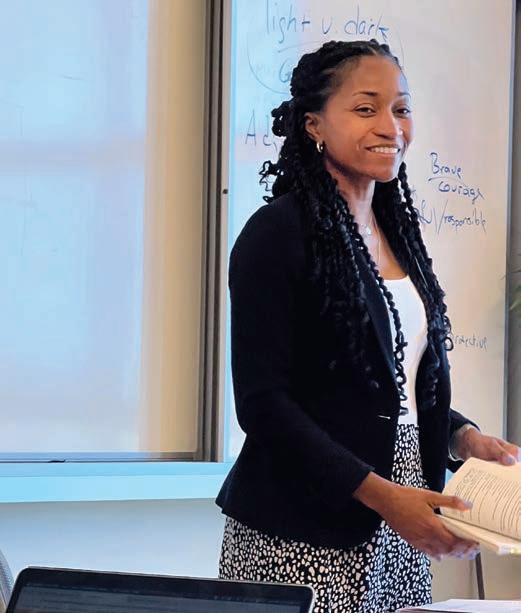
Our Community Conversations, which began last year, provide a forum for students to authentically share their concerns, aspirations and thoughts on certain issues. Our monthly conversations have covered issues of homophobia, racism and antisemitism. These events allow students to have vulnerable conversations and are essential for creating a deep sense of belonging. Faculty and staff are also part of these community-wide conversations.
Westminster continues to support the school’s various affinity and alliance groups, which are particularly vital for our underrepresented students. Led by our students and faculty, these groups take an active role in planning programming for the entire community and in creating opportunities for these groups to meet in safe spaces.
As we move toward the end of the academic year, we remain committed to this year’s theme of belonging and strengthening as a community that listens and learns from each other.
Westminster Bulletin 4 Hill Headlines
Adventure Author Will Grant Shares His Story of Riding the Pony Express

Cowboy and journalist Will Grant visited Westminster May 4 to speak to the community in an all-school assembly about his horseback journey following the 2,000-mile route of the Pony Express. The experience is captured in his recently published book, “The Last Ride of the Pony Express” (Little, Brown and Company). While at Westminster, the Colorado native also visited an English class to talk with students about adventure writing and eco-writing.
Grant, who is the brother of Newell Grant Jr. ’99, Westminster’s director of advancement, traveled the entirety of the Pony Express route with his two horses, Chicken Fry and Badger. The frontier mail service spanning the American West was in operation during the 1860s and only ran for 18 months. It required riders to carry mail on a grueling schedule between St. Joseph, Mo. and Sacramento, Calif., through a vast and mostly uninhabited wilderness.
In his book, Grant writes that he undertook the epic journey as a “largescale exercise in horsemanship with the goal of achieving a boots-on-the-ground understanding of the famed Pony Express mail service. I also wanted to make a transect of the cultural West. I wanted to meet the people and learn about their lives in all the places that I’d never been to along the trail.”
While other authors have written extensively about the Pony Express, none has ever taken on the challenge of riding the route on horseback. Pony Express riders did not keep journals about the trek, and there are few details to illustrate what it was really like to complete the journey.
To recreate the experience, Grant had to gain permission from landowners on the private property through which much of the original trail runs until Wyoming where it traverses public land, and he had to secure campsites along the way from ranchers and farmers where he and his horses could overnight. Already an expert horseman, Grant was prepared for long days in the saddle, covering up to 25 miles a day with his pack horse trailing behind him.
The original Pony Express riders would ride one horse 15 miles to a station, then get a new horse and continue riding, completing the journey in roughly 10 days. The fastest delivery in the history of the Pony Express was seven days and 17 hours.
It took Grant five months to complete the journey. Horses at a walk travel about 3 miles per hour. En route, Grant had to slough through deep mud, torrential downpours, parched tumbleweed desert land and he had to fend off a wild stallion and sidestep rattlesnakes before he reached Sacramento, where he ended his ride at the Pony Express monument.
During the ride, he observed how the ecosystem of the West has been forever changed by invasive species and human intervention. But he also was heartened by people he met along the way and by his own resilience.
“The hospitality of people gave me faith in humanity,” he said. And he learned that when it got rough, if he put his head down and plowed through it, it would get better. His book includes encounters with the ranchers, farmers, historians and business owners, creating an intimate portrait of how the West has evolved from the roughand-tumble 19th century to the present day.
For his next riding adventure, Grant says he is exploring riding horseback on the Silk Road, the ancient trade route connecting China to the West, which covers roughly 4,000 miles across some of the world’s most formidable landscapes, including the Gobi Desert and the Pamir Mountains.
Scan to watch a video of the presentation.

Spring 2023 5
Viewing Art and Architecture Firsthand SEEING IS BELIEVING
Fifty-five architecture and art students visited Yale University earlier this year for a firsthand look at work they have been studying throughout the year. Back on campus, they also had the opportunity to listen to a lecture by Gregg Pasquarelli P’25, founding principal of SHoP Architects, an innovative practice creating new models for design, master planning and real estate development.
Providing students with stimulating experiences outside the classroom is an essential part of the learning process, said architecture teacher Rebeccah Tuscano-Moss P’20.
“I can show pictures of a building from many angles and provide detailed drawings,” she said. “However, looking at mere images isn’t the same awe-inspiring experience as standing under the single concrete arch, spanning 75 feet in the air, that holds the entire whale-shaped roof of Yale’s famous Ingalls Arena.
“The echo of voices in the vaulted space, the chill of the ice, the gritty feel of the concrete and the smell in the air of stale popcorn, aged wood and a hint of sweat, make it come alive,” she continued. “These out-of-the-classroom moments provide the multi-sensory learning experiences.”
Architecture student Kade Smith ’23 concurred: “In class, we look at and talk about extravagant pieces of architecture, but the problem is that we can only see them online, so going to Yale in person was amazing. It allowed us, as students, to understand how architecture can change how you feel. Looking at facilities like the Ingalls Arena or Kroon Hall online does not do them justice.”
While touring Yale’s art galleries, students studied artwork within a historical context. Every art object is a product of materials, intentions and outcomes that reflect a time and place. “The museum is set up beautifully for students to understand the
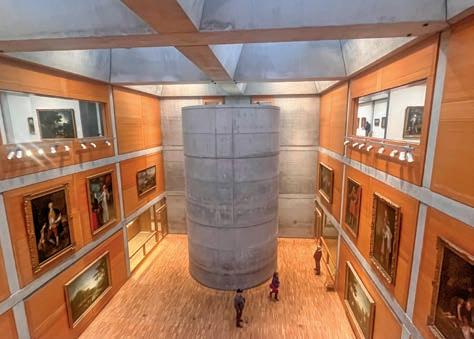
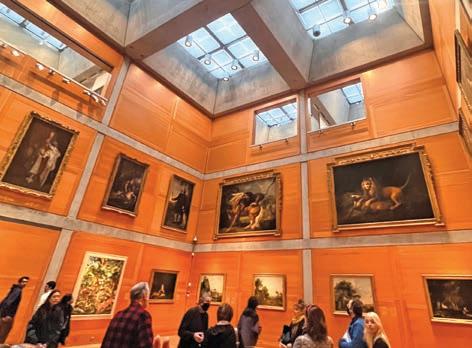
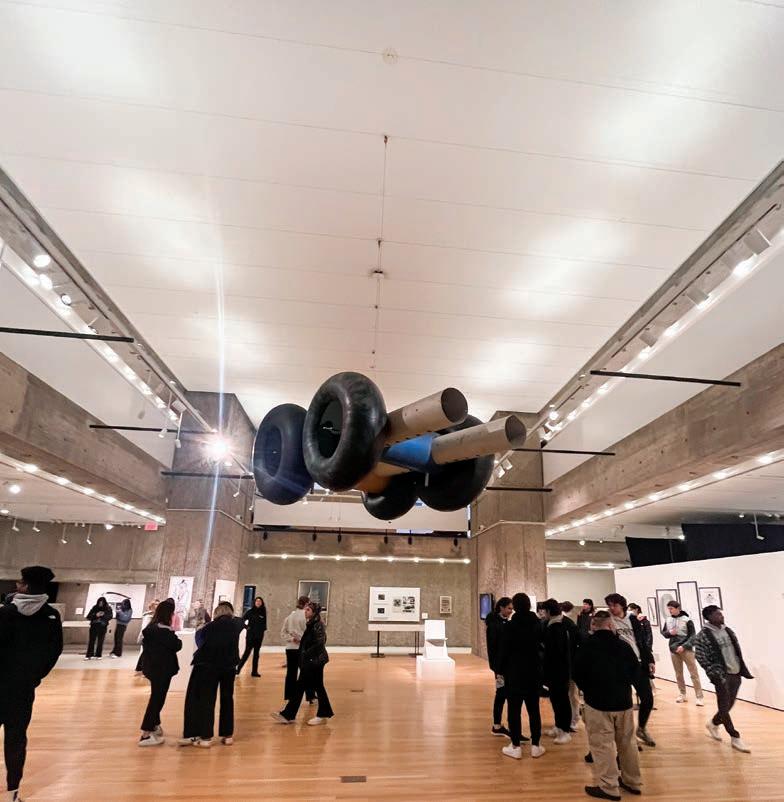
evolution of art and how it changed and adapted throughout history,” said art teacher Kerry Kendall. “There is an excellent collection of work, ranging from elaborate African masks and jewelry, Asian prints and vessels, and Italian Renaissance pieces to Impressionism and contemporary works.”
Art students took black-and-white photographs of the architecture and wrote responses to three selected works from the Yale Art Galleries and Yale Collection of British Art, commenting on the style, subject matter, historical context and how each piece inspired them.
For Emma Mason ’23, viewing art objects up close and personal was eye-opening. “Seeing so many different time periods and styles expressed was so helpful when we returned to our own work in the studio,” she said.
Architecture student Wills Erda ’24 enjoyed the deep dive into architecture, especially the lecture by Pasquarelli. “He did a wonderful job showing us what modern architecture is and the processes behind it,” Erda said.
Pasquarelli has garnered many awards and his firm has designed complex and dynamic projects, including The Porter House, Barclays Center, the East River Waterfront Esplanade and Pier 17, the American Copper Buildings, and the second-tallest tower in Manhattan, 111 West 57th Street.
In the classroom, “it can sometimes be hard to get a sense of how a career or job in architecture would work,” said Erda. “The lecture really illuminated for me what that is like and inspired my love of the subject. In class, we often work on smaller, different projects; the lecture really allowed me to see how all of it can fit together to create an impressive building or project.”
Westminster Bulletin 6 Hill Headlines
Poetry Reading by Margaret Gibson
The transformation of personal grief into environmental grief was a recurring message in an all-school reading by poet Margaret Gibson in February.
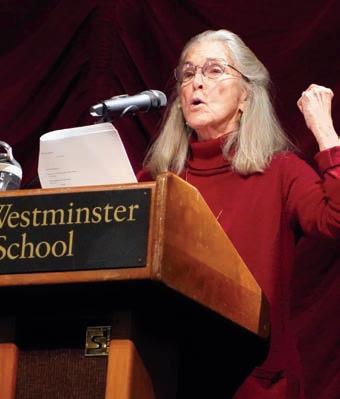
Gibson, a professor emerita at the University of Connecticut and a nationally and internationally renowned poet, visited the school Feb. 26-28 as part of the Westminster Poet Series, which began in 1999. Each academic year, the school welcomes a poet to campus for twoday visits, which includes a reading and class visits. Gibson lives in Connecticut and is currently finishing a three-year appointment as the poet laureate for the state of Connecticut, during which time she has chosen to focus on poetry and the environment during the climate crisis.
During her reading, Gibson stressed the interconnectedness of all things: death and life, human nature and the natural world. She read poems from her latest trilogy, reflections and observations that chronicle the diagnosis of her husband, the writer David McCain, with Alzheimer’s disease; the progression of the illness; and
his passing and how it also reflects our tenuous and symbiotic connection to the natural world.
In the face of global climate change, she urged students to have the courage to go out and act. The emphasis of her recent work, she said, “is to write more about the interdependence of the inner and the outer world.”
MUN Makes an In-Person Comeback
On Jan. 19, Westminster students traveled to Yale to participate in the Model United Nations, which was held in person for the first time since the start of the pandemic three years ago. As a result of the COVID hiatus, this year’s event was an entirely new experience for students, many of whom did not know what to expect.
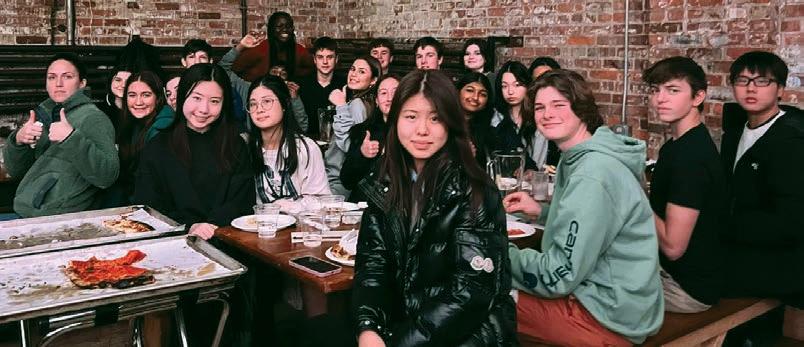
“They returned having had an outstanding experience,” according to Betsy Heckman, Model U.N. advisor, history teacher and academic dean.
The Martlets joined over 1,500 students from around the world to debate global issues from the past and the present. Special kudos to Wills Erda ’24, who earned “Best Delegate” honors in his committee, which focused on the “Troubles” in Northern Ireland. While students met in committee sessions for more than 15 hours during the weekend, they also took some time to explore New Haven and the Yale campus.
Her poem “It Doesn’t Take Much” is a reflection on finding what appeared to be a lifeless frog on her doorstep. In the final verses, she reveals how the limp frog rebounded. “Is it a harbinger of things to come?” she ponders.
Or is the dead frog an ambassador sent from the wetland world?
I lift it gingerly, the frog still limber, no rigor mortis, not yet,
and I put it aside, in a paper bag, to take out later for burial—
I have a dog with a keen nose. But when I come for it, the paper bag is rustling, is jumping— alive!
And so I carry the frog far down to the pond’s edge and settle it into the shade of the cattails. When death arrives on your door stone, you think about it.
When death turns out to be life, injured life, you’re glad. And turn back to your own.
A highlight of the weekend was a group dinner at one of New Haven’s famous pizza joints. While the group was exhausted by the end of the conference, they were also elated and excited to return next year. With this experience in the books, the young but eager Westminster MUN delegation has developed the confidence and skills for future successful conferences, said Heckman.
Spring 2023 7
Dramat’s Guys and Dolls
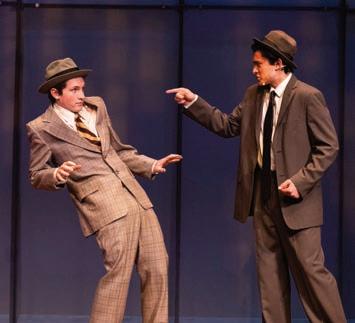
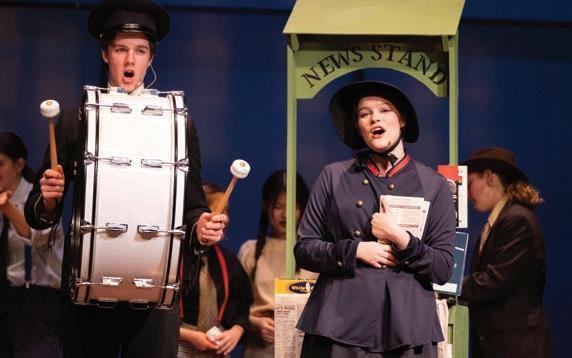
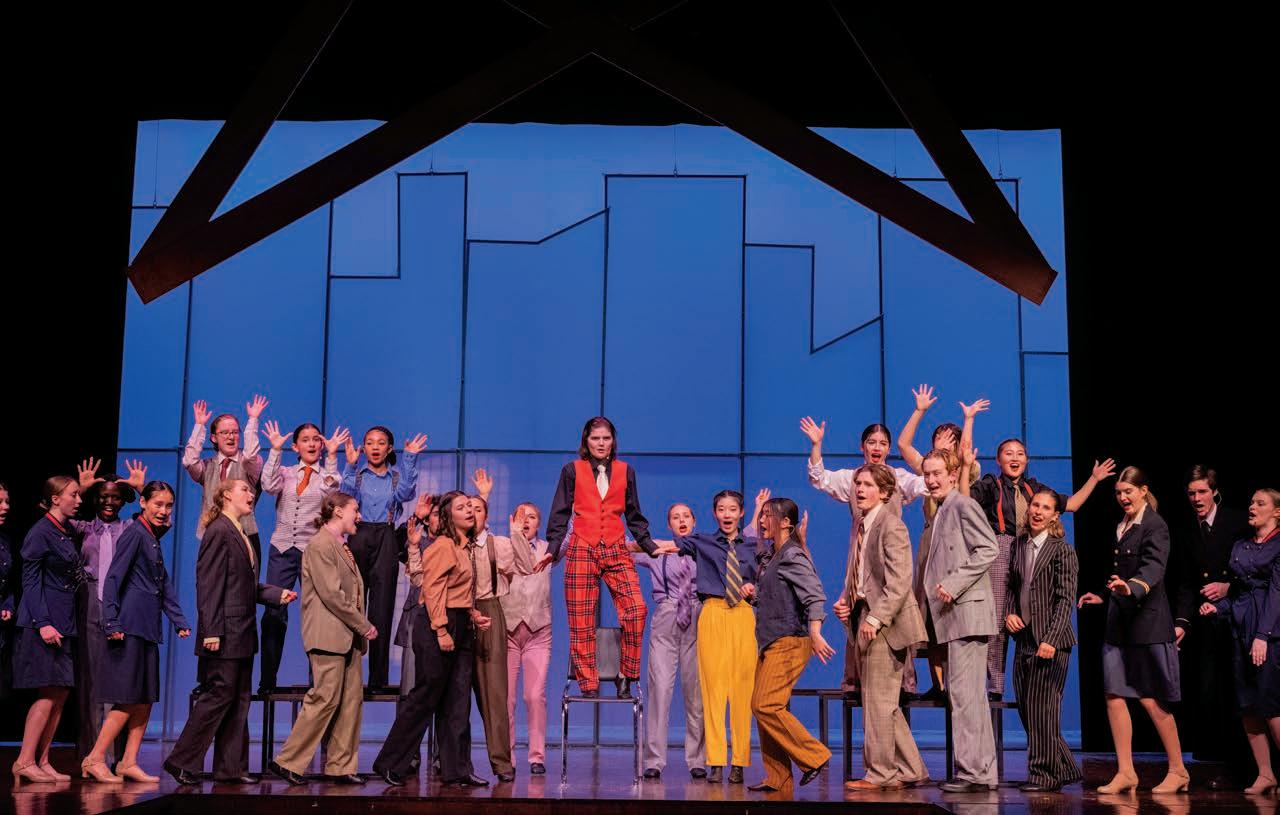
The Westminster dramatic association marked the first performance held on the Booker T. Bradshaw Jr. Stage in the Werner Centennial Center since the stage was named last spring in honor of Bradshaw, the first Black student and graduate from Westminster. The production took place Feb. 17-19 and featured a pre-performance dinner for parents Friday evening in the dining hall. The cast showcased its talent in its own rendition of this Tony Award-winning play which premiered on Broadway in 1950 and brings to life 1920s and 1930s gangsters and gamblers of the New York underworld.

Westminster Bulletin 8
Hill Headlines
Winter Performing Arts Festival
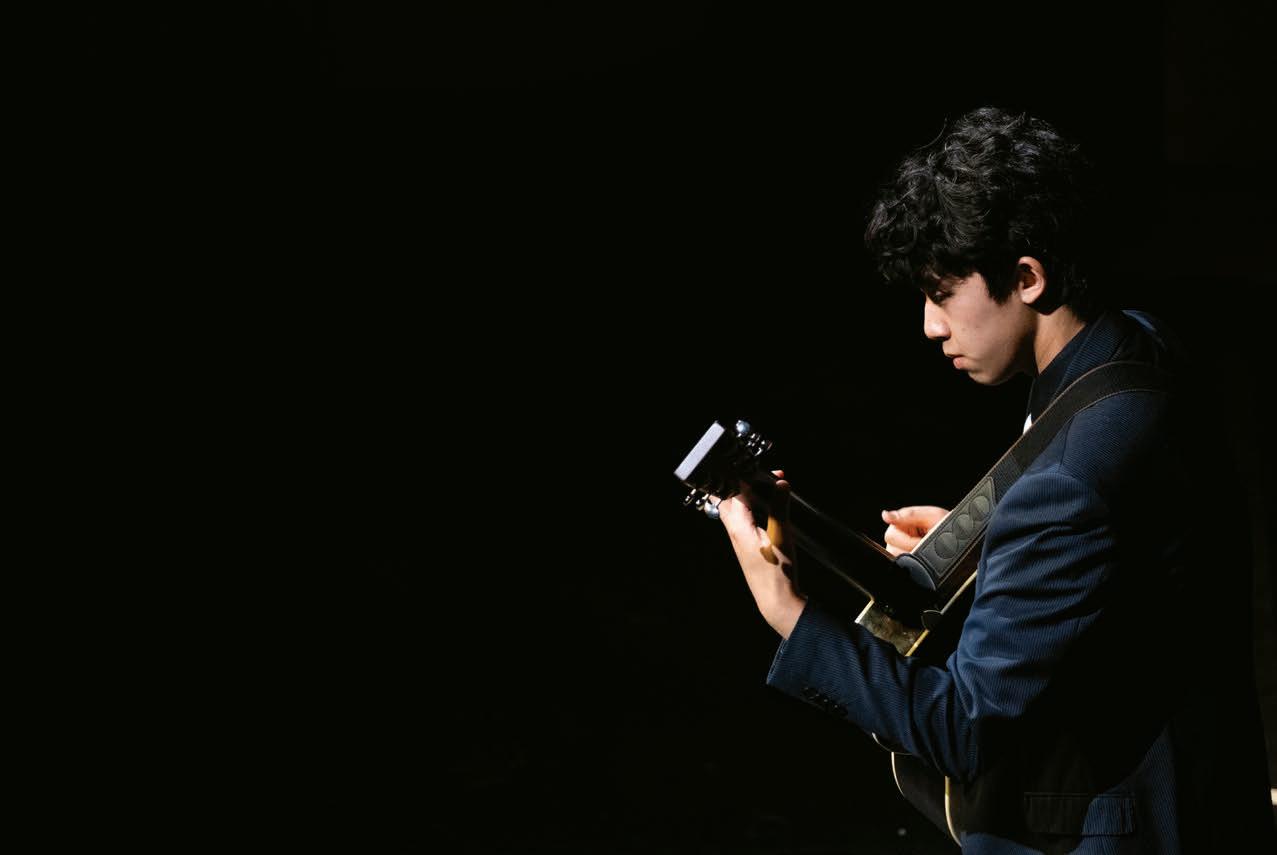

On March 2, members of the Concert Band, Jazz Band, String Ensemble, Westminster Belles, Chamber Choir, and Chorale took to the stage for the annual Winter Performing Arts Concert.

Spring 2023 9
Fourth Formers Compete in the Eighth Annual Public Speaking Contest
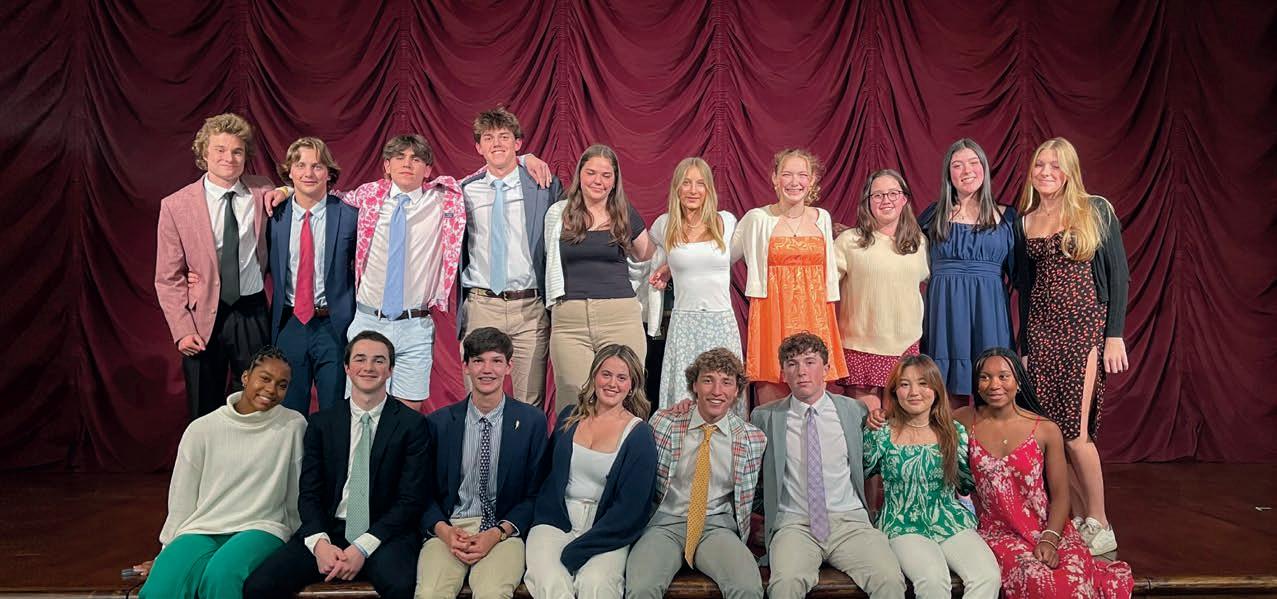
Eighteen finalists competed in this year’s Westminster School Fourth Form Public Speaking Contest held May 1 in Werner Centennial Center. Sophie Grace Stevenson, whose speech focused on striving to do what you are passionate about, earned first place. Honorable Mentions were awarded to Maddie Clark and James O’Connell.
The finalists for 22 –23 Westminster School Fourth Form Public Speaking Contest were: Maddie Clark, Declan Cody, Sarah Eddy, Nyla
Francis, Chip Genung, Adrienne Hall, Zac Jainchill, Easton Masse, Ben Norten, Camilla Norton, James O’Connell, Hugh Olson, Elise Park, Lily Raskind, Lila Smith, Sophie Grace Stevenson, Ben Swift, and Lucy Wainwright.
The competition was the culmination of the work Fourth Formers completed in the Speech Writing and Public Speaking course that they took during the winter and part of the spring trimesters. Each student selected a topic of their choosing and then was asked to try to relate it to one of the themes from their civic engagement course last fall.
On April 6, the Westminster community enjoyed a dynamic performance by Tablao Flamenco as part of the Graham Gund ’59 Visiting Artists Series. The cultural enrichment program is sponsored by the Gund family in honor of Graham Gund, Class of 1959. Following the performance, dance and music students participated in a master class with the artists.
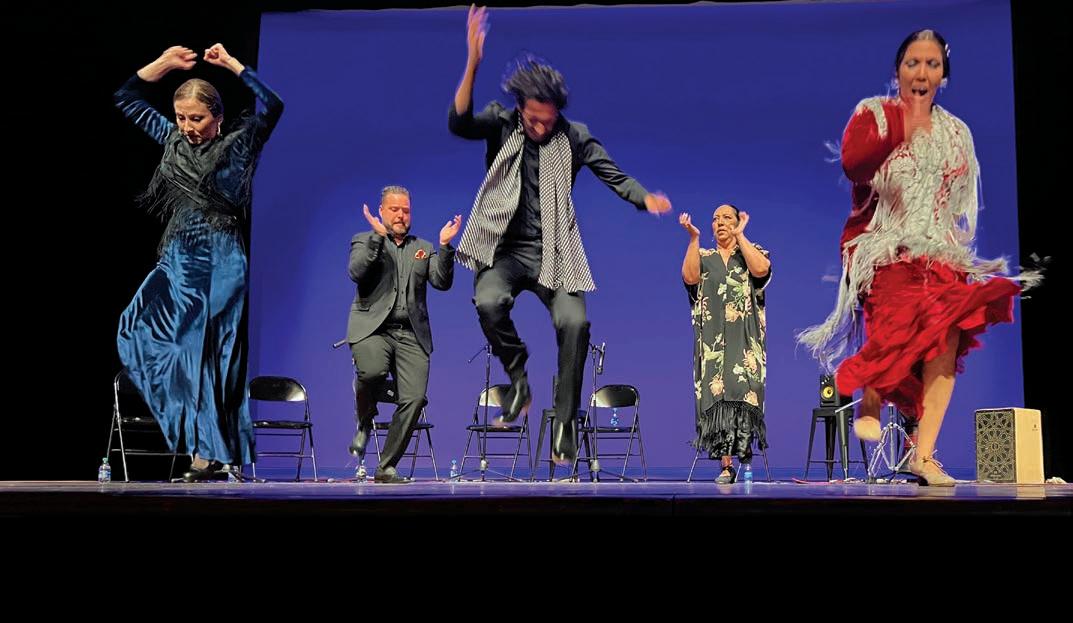
Westminster Bulletin 10 Hill Headlines
!Olé!
Mental Health Fair Gives Students a Chance to Just “Be”
Martlets took some time to recharge, revitalize and rest Jan. 25 during Westminster’s inaugural Mental Health Fair. The program featured 35 different hourlong sessions for students to choose from, ranging from relaxing activities like yoga, crocheting and journaling to high-energy exercises like shadow boxing, dodge ball and martial arts.
Students had an opportunity to take a winter hike, join a pit fire circle, ice skate, visit the observatory, play math games and do puzzles. For those with a sweet tooth, baking and making ice cream cakes were hands down the most popular options.
“You can work out your aggression,” joked Head of School Elaine White, who hosted the ice cream cake session in Pratt House. Students did just that, pummeling candy bars into toppings and smashing cookie crumbs into crusts.
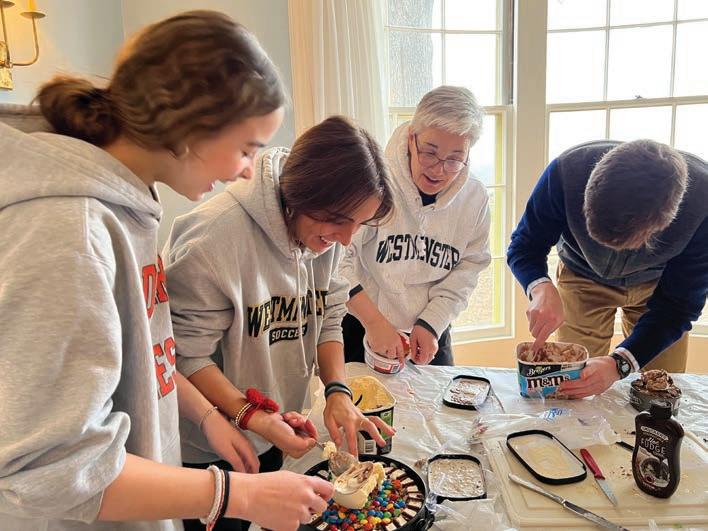
The aim of the school’s mental health fair was to not only give students a break from their studies, but to help them discover fun and healthy ways to reduce stress.
“We wanted the kids to have a day to play and just be,” said Amy Raskind, the health center’s mental health coordinator.
“The idea for the fair grew out of recognizing that students need nurturing in order to be the best versions of themselves,” she continued. “Westminster believes in the importance of supporting the whole child, which includes supporting their overall mental health and wellness.”
To prepare for the fair, the health center collected feedback and ideas from dozens of students and faculty alike, and
the student clubs Bring Change 2 Mind and Wellness were also instrumental in helping to organize the event, Raskind said.
Some students took the opportunity to challenge themselves by learning swing dancing and needlepoint or practicing meditation and mindfulness.
In Armour Academic Center, students fawned over a trio of visiting therapy dogs, and in Baxter Gallery, where a small petting zoo was set up, they held baby pigs and rabbits.
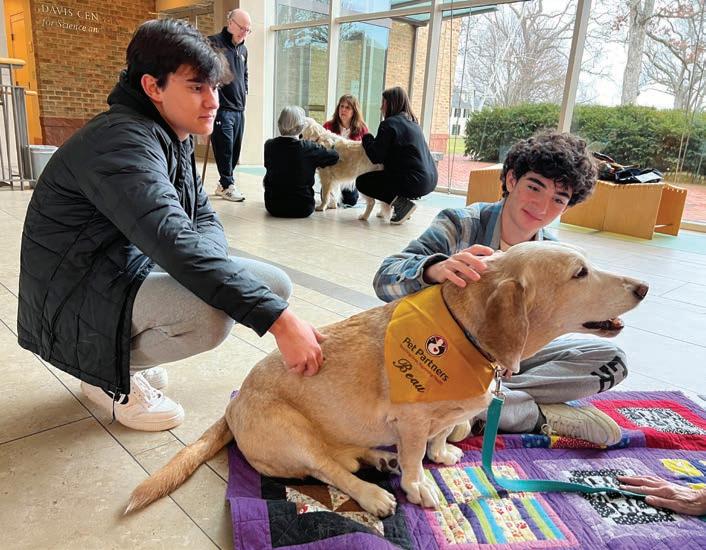
“It makes me feel super calm,” said Fifth Former Elizabeth Pruellage, who cradled a calico-colored baby rabbit in her arms.
In Cushing’s Fearn Hall, a group of students gathered near the fireplace were quietly coloring geometric shapes and mandalas. Shana Russell, John Hay Society advisor, Chapel coordinator and associate director of college counseling, explained that coloring books aren’t just for kids; adults can benefit from them, too.
“It is an activity that gives these students an opportunity to focus and be mindful of what is in front of them and not what is going on around them,” she explained.
Similarly, in Hinman Reading Room, physics teacher Amanda Rappold instructed students in crocheting.
“It is a process that requires you to be present, to listen and to participate in something with others… and not escape inside of your cellphone,” she said.
Spring 2023 11
FROM THE SIDELINES: Fall 2022 Season Highlights
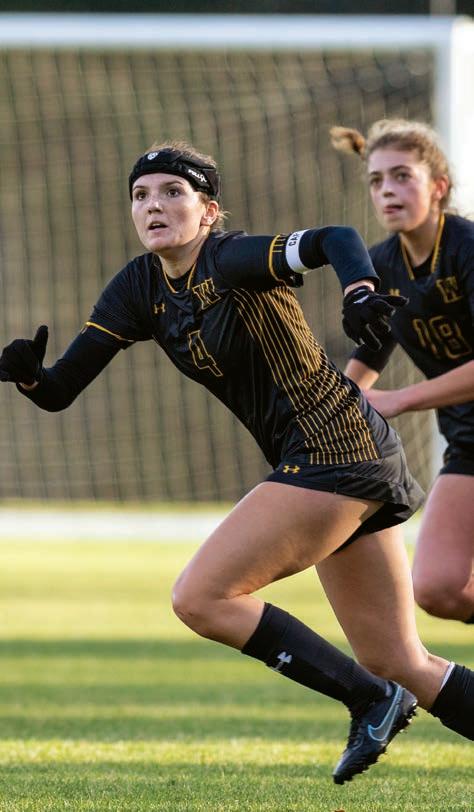
Boys’ Varsity Soccer
The 2022 fall season for Boys’ Varsity Soccer was another very successful campaign. The season started off in Barcelona with the boys’ and girls’ teams traveling abroad again for preseason as they did in 2019. The team battled through injuries and illness but finished the season strong and made the NEPSAC playoffs again as the fifth seed. The team bowed out of the tournament in a tight overtime game against Noble and Greenough School that ended in a score of 1-0. The team was led by a solid senior class, many of whom will go on and play NCAA soccer next year. Lawrence Taylor ’23 and Parker Sinclair ’23 were awarded All-New England, All-League and CT All-State. Tommy Cramer ’23, Jaden Goodsell ’23 and Abraham Monsee ’25 were elected All-League. Most Improved Player: Henry Warner ’25;
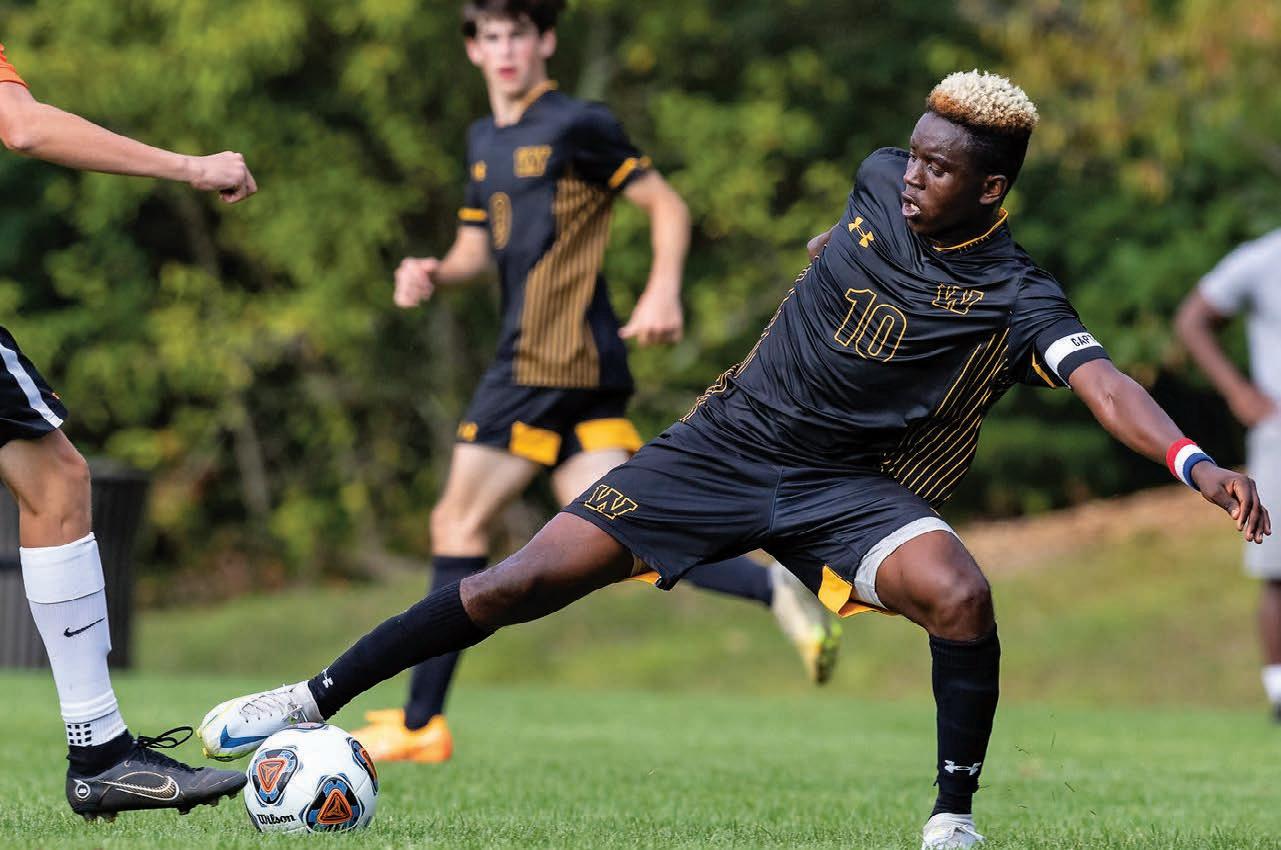
Most Valuable Player: Lawrence Taylor ’23; Squibb Bowl: Parker Sinclair ’23; Founders Award: Kade Smith ’23 and Mason Clarke ’23
Girls’ Varsity Soccer
The 2022 season for Girls’ Varsity soccer was a memorable one both on and off the field. The year kicked off with a preseason trip to Barcelona for the boys’ and girls’ teams. A perfect combination of soccer and fun in the sun helped set the tone for the season. The team hit the ground running with a 4-0 start and ended the season with an impressive 16-3 record. The regular season success granted the team a third seed in the Class A NEPSAC Tournament, where they defeated Thayer Academy in the quarterfinals and then Choate in the semi-finals, earning a spot in the Class A New England Final for the first time since 2010. The squad was led
Westminster Bulletin 12
Lawrence Taylor ’23
Jillian Gregorski ’24
by a terrific senior class (Bianca D’Onofrio, Liz DiBlasi, Kalilah Akbar, Amber Caruso, Paige Smith, Gabby Haughton, Elizabeth Symonds and Mari Camara) and saw a lot of individual successes. Jillian Gregorski ’24 was named AllAmerican for the second year in a row. Bianca D’Onofrio ’23 was named All-Region and Elizabeth DiBlasi ’23 (with 20 shutouts in two years) was named All-State for the second year in a row. More important than any success on the field, the Girls’ Varsity Soccer team is composed of 25 incredible humans who thoroughly enjoyed each other’s company day after day. Most Improved Player: Catherine Graves ’24; Most Valuable Player: Jillian Gregorski ’24; Squibb Bowl: Kalilah Akbar ’23; Founders Award: Kalilah Akbar ’23 and Haley Cramer ’24
Water Polo
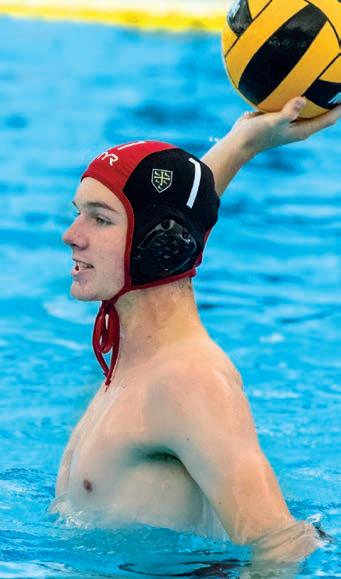
Westminster’s fifth season in Founders League and New England Prep water polo came with some necessary rebuilding following the loss of several four-year players. At the start of each season there is a learning curve for new players as they adapt to the nuances of a physically demanding sport. Westminster has an incredibly challenging schedule and the start of every season against Deerfield and
Andover is always an anticipated tri-match. The Martlets powered through most of the season, looking to keep matches close and to learn the game. Anchoring the group this year with All-Founder’s Honorable Mention honors was Wills Erda ’24, who buoyed himself and his team through many matches. His aggressive, confident, consistent play kept teams guessing and frustrated opponents. With Sixth Formers Mason Zottola and Chris Paolella graduating, the group looks to build upon their success this year during the 2023-24 campaign. The team always looks forward to matches with Wilbraham & Monson, Deerfield, Loomis and others. As the league expands, the Martlets will face off with other stalwarts in New England and have an opportunity to improve and compete with the best in the league. Most Improved Player: Simon Stambaugh ’26; Most Valuable Player: Wills Erda ’24; Squibb Bowl: Mason Zottola ’23; Founders Award: Jason Hu ’25 and Andrew Pang ’24
Varsity Field Hockey
The 2022 fall season proved to be another outstanding effort for the Varsity Field Hockey team. Led by a strong Sixth Form class, the team started the season 8-0-1, finding its stride early and realizing its potential as a group. A regular season record of 11-5-1 through a competitive Founders League and NEPSAC schedule once again earned the team a spot in the Class A tournament, where the Martlets played at the top of their game, falling just short to the defending champions. Westminster’s success in 2022 and throughout the past four seasons was due to incredible efforts from the Class of 2023 players, including Dylan Bloom, Mckenzie Bloom, Emma Budke, Olivia Fernandez, Ava Lynch and Amelia Molin. Dylan and Mckenzie Bloom were named WNEPSFHA All-Stars and earned spots on the All-NEPSAC team, while Olivia Gordon

Spring 2023 13
Dylan Bloom ’23
Wills Erda ’24
’24 and Cassie Goundrey ’24 were named AllNEPSAC Honorable Mention. The Martlets are looking forward to enjoying experiences with returning players both on and off the field next season. Most Improved Player: Amelia Molin ’23; Most Valuable Player: Mckenzie Bloom ’23; Squibb Bowl: Dylan Bloom ’23; Founders Award: Ava Lynch ’23 and Dylan Bloom ’23
Girls’ Cross-Country
Although cross-country has a reputation for being an individual sport, the captains and coaches worked hard to dispel that idea in practices and in races. The team’s top finisher rotated nearly every race –– a testament to the breadth and depth of the squad. On several occasions, athletes reported running alongside a struggling teammate (for the length of the race) to encourage her to finish the race. The team’s consistent top finishers included Madison Khuu ’24, Saskia Mattiko ’23, Emma Mason ’23, Catie McGuigan ’23, Hayden Schneider ’25, Chiamaka Kanu ’23 and Simone Routledge ’23, all of whom earned varsity status for their performances this season. Officially, the team finished first in three of its five dual meets, seventh at Founders, and 15th in the NEPSTA XC Championships. The coaches emphasized
the importance of celebrating each other’s successes –– that no one person is more important or instrumental to the team than another person. The girls upheld that idea by praising all of the various victories of their teammates on a given day (Varsity or JV, meet day or workout day). They also enjoyed the practices spent at McLean Game Refuge and Stratton Brook Park and opportunities to run off campus and get onto the trails. The positive team culture the girls developed was an enormous highlight of the season. The girls are eager to train over the summer and to encourage both the younger runners on the team and the incoming athletes to work hard, stay positive, and to put their teammates first. Most Improved Runner: Simone Routledge ’23; Most Valuable Runner: Emma Mason ’23; Squibb Bowl: Catie McGuigan ’23; Founders Award: Simone Routledge ’23 and Emma Mason ’23
Boys’ Cross-Country
This year, the Varsity Boys’ Cross-Country season was marked by rebuilding talent, celebrating PRs throughout the season and surveying a significant portion of the landscape around Simsbury. The team traveled weekly for long runs to McClean Game Refuge, pioneered a few point-to-
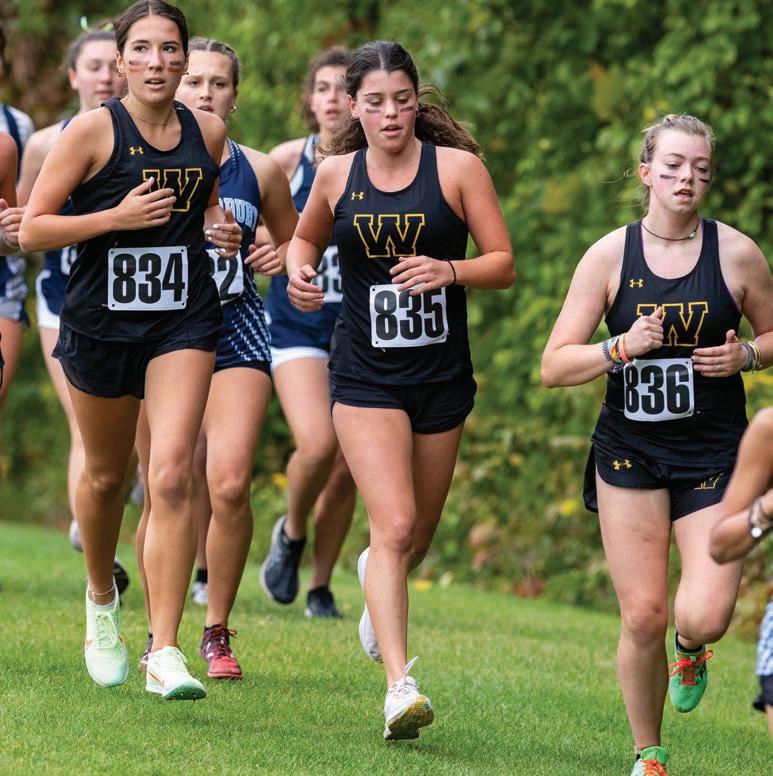
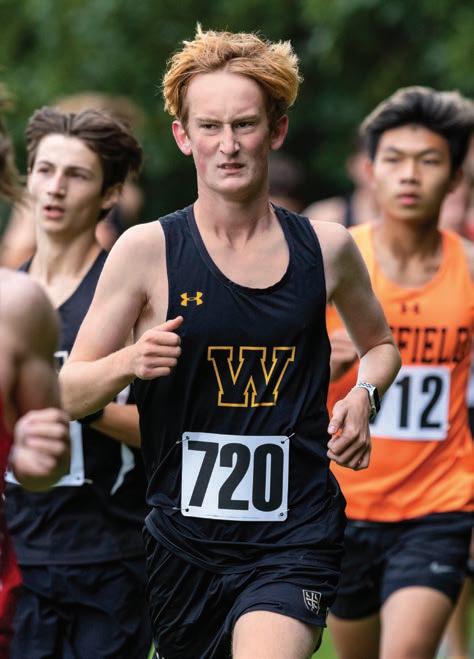
point runs along the Simsbury bike path and explored the local community. The teams training consisted of a blend, including track work, sustained long intervals and timed fartlek runs. Meets were a high point each week for the team, and the Founders League season was bookended by meets on the Choate Rosemary Hall course, a loop where a number of runners set both their first cross-country time ever and their personal best during the same season. James O’Connell ’25, Rhys Marschke ’24 and Jakub McKinney ’23 earned high regard in the ranks, joining captains Sam Bradley ’23 and Jay Henry ’23 as the top five varsity runners each meet. The team enjoyed meals together and appreciated the generosity of friends and family of the team providing feeds and meet-day snacks. The last meet of the season, a NEPSTA DII Championship meet, was held at St. Mark’s; many of the top runners prevailed on an unseasonably warm day, though the humidity and temperature alongside fierce competition made the race a true challenge to end the season. Next year, the team looks to recruit new energy and spirit as the boys work together to improve their running.
Most Improved Runner: James O’Connell ’25; Most Valuable Runner: Sam Bradley ’23; Squibb Bowl: Rhys Marschke ’24; Founders Award: Jay Henry ’23 and Sam Bradley ’23
Westminster Bulletin 14
Jay Henry ’23
Catie McGuigan ’23, Hayden Schneider ’25 and Simone Routledge ’23
Winter 2023 Season Highlights
Girls’ Varsity Squash
After a strong showing at the High School Nationals, the girls finished their season with a .500 record — a good showing for a team that included four Third Formers. The competitiveness of the schedule was highlighted by the fact that just four (two wins) matches ended up with 7-0 scores, while seven of the matches on the season — four of them wins — ended up 4-3, including the takedown of No. 2 seeded Nichols School at Nationals. All but two of the team’s losses were against larger schools, and all of the players on the team were at least within two wins of a winning record on the season. The best record was achieved by Emily Fonner ’26, who went 13-5 playing at No. 6.
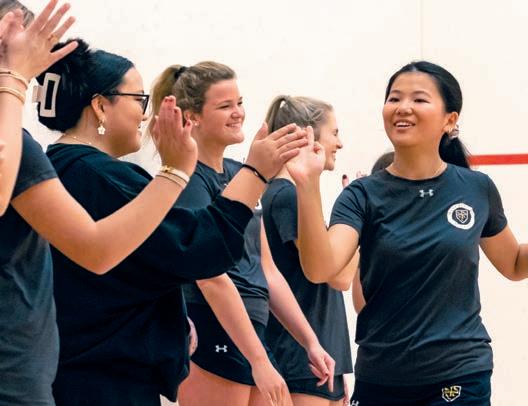
With so many young players on the team, Sixth Form leadership was key. Newcomer Maggie McCarthy ’23 brought her perpetual positive energy and was a model of hard work, determination and sportsmanship. Second year team member Chandler Green ’23 was like a second captain, demonstrating how hard work and fun are not mutually exclusive while playing with grit at No. 4. Captain Nicole Smith ’23, capping off a four-year career — her second year at No. 1 — showed how one can be fiercely competitive while displaying humility and grace. The responsibility of maintaining the positive team culture will be in the capable hands of rising Sixth Formers Margaret Dilks and Alice Tao. Most Improved Player: Alice Tao ’24; Most Valuable Player: Nicole Smith ’23; Squibb Bowl: Margaret Dilks ’24; Founders Award: Nicole Smith ’23 and Maggie McCarthy ’23
Boys’ Varsity Squash

The team was much stronger this year than last year, which was most evident against Loomis Chaffee and Avon Old Farms. Last year, all six matches with those schools ended 4-3 or 3-4. This year, the team beat Loomis 5-2 twice and AOF 6-1. In New Englands, the team beat host Exeter 5-2 to finish higher than their seeding in Class B. At High School Nationals, the team finished 30th out of 104, 20 places higher than last year. Co-captain and No.1, Julio Palomino-Perez ’23, played with passion and skill all year long with some stunning victories against Hopkins and Exeter. Co-captain Gabe Lugo ’23 led the team in sportsmanship, grit and grace, setting a wonderful example during practices and matches. Sixth Former George Hartmann had key victories against Exeter at New Englands and The Hill School at HS Nationals. Returning players include James Teng ’26, Mason Abbate ’24, Jason Hu ’25, Andrew Pang ’24 and Cisco Lilien ’24, any of whom could have won most-improved this season. Regular season record was 9-8, coming seventh in Class B NE and 14th in DII Nationals. Most Improved Player: Mason Abbate ’24; Most Valuable Player: Julio Palomino Perez ’23; Squibb Bowl: Gabriel Lugo ’23; Founders Award: Andrew Pang ’24
Girls’ Varsity Basketball
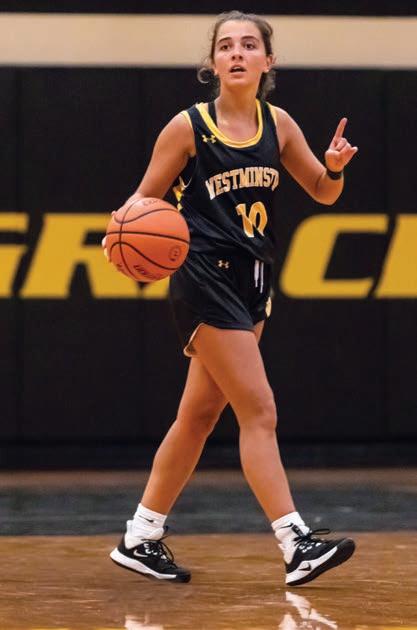
The team finished its season with a 5-16 record. In the final week of the season, the team went 2-1. Those two wins included a senior day victory over Pomfret, with two seniors scoring their career highs in their last
games. Bianca D’Onofrio ’23 finished with 20 points and Mather Thompson ’23 finished with 14. The other win was over Deerfield. Trailing since the second quarter, the squad rallied for a come-from-behind victory in the final seconds. Five three-pointers from Lauren Neuman ’25 throughout the game and back-to-back threes from Mariama Camara ’23 in the final minutes fueled the Martlet comeback. Down by one, in the final possession, D’Onofrio grabbed an offensive rebound with seven seconds left and finished a put-back as she got fouled.
With a small roster, the squad adjusted to injuries and navigated changing roles throughout the course of the season with love for one another and gratitude for the opportunity to compete in a Martlet uniform. Ruthie Haims’ ’23 stat line boasts multiple
Spring 2023 15
Gabriel Lugo ’23
Lauren Neuman ’25
Alice Tao ’24
20-plus rebound games. But from a scoring standpoint, each game saw a different leading scorer, reflecting the selflessness of this team. Thank you to the team’s four incredible seniors for their leadership throughout the season, and congratulations to the end-of-season award winners: Most Improved Player: Lauren Neuman ’25; Keyes Foul Shooting Award: Bianca D’Onofrio ’23; Most Valuable Player: Haley Cramer ’24; Squibb Bowl: Mather Thompson ’23; Founders Award: Ruthie Haims ’23 and Mariama Camara ’23; All NEPSAC Honorable Mention: Haley Cramer ’24
Boys’ Varsity Basketball
The Boys’ Varsity Basketball team finished with a 6-16 record. The Martlets have one of the toughest schedules for a Class B team. However, eight of our opponents made the postseason in both Class B and Class A combined. The team showed a lot of grit during the holiday tournament, where it went 2-1 on the weekend. The team also picked up several wins down the stretch against Watkinson, Kent (Class A) and Master’s School (Class AA.) Both captains had stellar seasons for the Martlets. Marcello Demerski ’23 averaged 17 points, five assists, five rebounds and two steals per game. His counterpart, Dorian Paki ’23, averaged a double-double on the season with 20 points, 10 rebounds, three assists and two blocks a game. Sixth Former Jack Darnowski started a handful of games and contributed on both ends of the court throughout the season. The team stayed together impressively through a good amount of turmoil. The Fourth Formers showed a lot of promise as well. Jayden Reid
’25 averaged 10 points and eight rebounds. The Martlets continue to make strides as a program. Before his injury, Jake Carbone ’24 was a catalyst for the Martlets; as a starter, he was a lockdown defender all season long.
Underformers Wills Lown ’24, Johnny Hadden ’24, Matthew O’Connell ’25, Declan Cody ’25 and Alex Wood ’25 deserve recognition for their efforts. Managers Joey Scrofani ’23 and Cole Raycraft ’23 are amazing young men. The Martlets finished the season as the 11th ranked team in Class B. Most Improved Player: Jack Darnowski ’23; Keyes Foul Shooting Award: Marcello Demerski ’23; Most Valuable Player: Dorian Paki ’23; Squibb Bowl: Marcello Demerski ’23; Founders Award: Marcello Demerski ’23 and Dorian Paki ’23; All NEPSAC Honorable Mention and named to the AllFounders League second team: Dorian Paki ’23
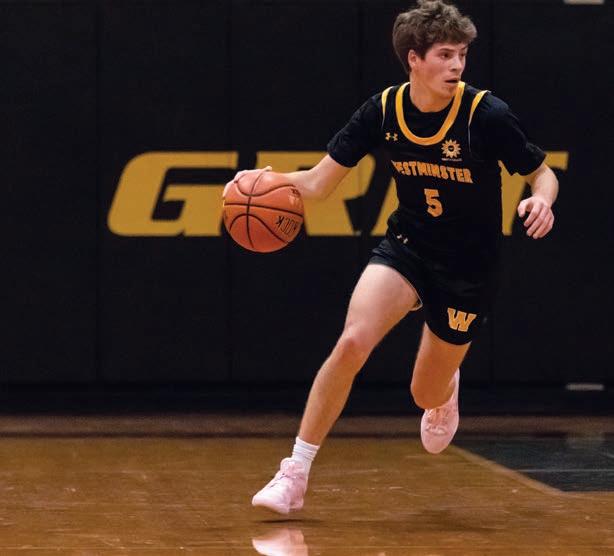
Boys’ Varsity Hockey
Boys’ Varsity Ice Hockey wrapped up its winter season 17-8. Despite heading into 2023 at 3-4, the team finished its final 18 games at 14-8. The team went 8-1 in its final nine games of the season to earn the opportunity to play in the Elite 8 Tournament. The team earned the No. 7 seed, ultimately falling to the No. 2 seed Avon Old Farms in the quarterfinal game. The team racked up some big wins over the course of the season, including over Taft, Salisbury, Loomis Chaffee, Kent, Belmont Hill and, in an early season overtime game, Brunswick. The team finished third overall in the Founders League and seventh overall in New England. Ryan Shaw ’24 was also named to the All NEPSAC team by the New England Prep School Ice Hockey Coaches Association.
Most Improved Player: Nicholas Tsatas ’25; Most Valuable Player: Ryan Shaw ’25; Squibb Bowl: Wade Volo ’23; Founders Award: Matteo De Luca ’25 and Hayden Raycraft ’23
Girls’ Varsity Hockey
The Girls’ Varsity Hockey team wrapped up its season with a 12-10-3 record. The team started the season strong, going 4-0 in the first two weeks. The team continued to play well against strong opponents through
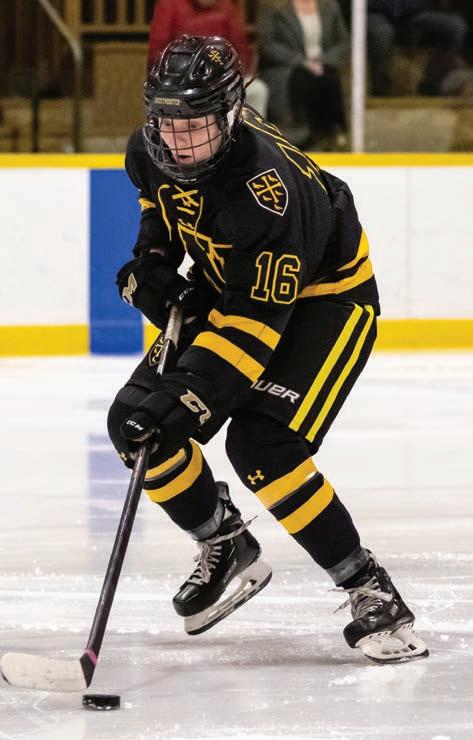
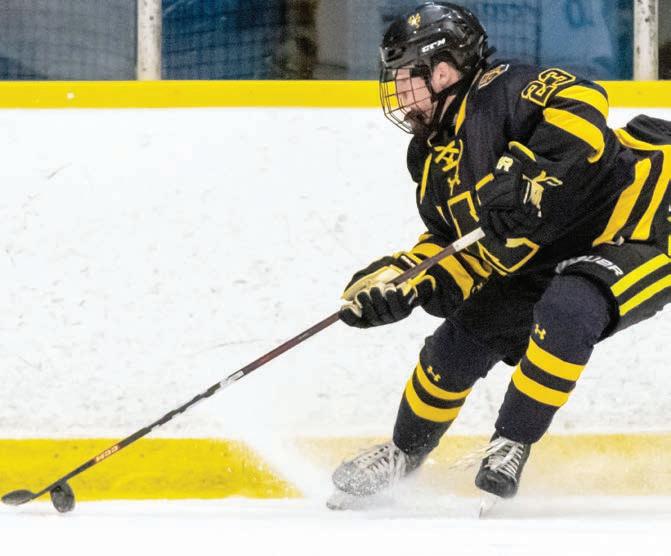
Westminster Bulletin 16
Wade Volo ’23
Marcello Demerski ’23
Hailey Tullo ’23
a challenging schedule at the Harrington Tournament. Toward the end of January, the team was able to clinch the Founders League title with wins against Kent, Loomis, Taft and Choate and a tie with Hotchkiss. With the strong start to the season and more wins throughout, the team earned the second seed in the Patsy Odden (Large School) Tournament. This seeding gave the team a bye to the semifinal game, where they faced off against third-seed Taft. After a hard-fought game, the team ultimately fell to Taft 2-1. The team showed incredible grit throughout the season and are coming away with the Founders League title. Thank you to the seven seniors who will be missed next year: Mckenzie Bloom, Emma Budke, Callie Dermody, Liv Fernandez, Amelia Molin, Shannon Moran and Hailey Tullo. Most
Improved Player: Callie Dermody ’23; Most
Valuable Player: Shannon Moran ’23; Squibb Bowl: Alex Whalen ’24 and Amelia Molin ’23; Founders Award: Hailey Tullo ’23 and Amelia Molin ’23; All NEPSAC Honorable
Mention: Olivia Gordon ’24 and Shannon Moran ’23
Girls’ Swimming and Diving
Girls’ Swimming and Diving finished the regular season with a 7-0 record. Throughout the season, the team developed both in individual performances and team camaraderie. In the final few weeks of the season, the team faced some of its toughest competition during the senior meet, Founders Championships and New England Championships. During its senior night meet, the team raced against Miss Porter’s School,
which would be its toughest competition at the New England Championships. During this dual meet, both the 200-medley relay and the 200-freestyle relay smashed the school records. This team was made up of Lucy Benoit ’23, Margaret Breen ’23, Chiamaka Kanu ’23 and Marin Benoit ’26. This team would go on to break the 200-medley relay record again at Founders League Championships. Throughout the season, every athlete achieved personal best times, and many accomplished these times at Founders League Championships. The team finished fifth at Founders League Championships, 26 points behind Miss Porter’s School.
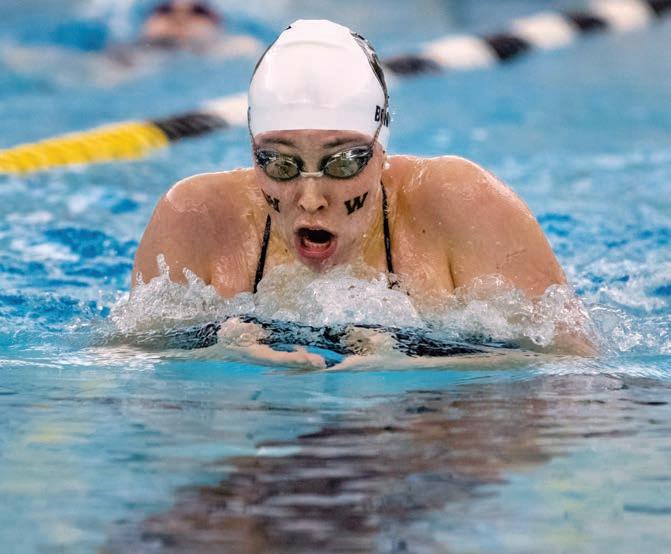
During the New England Championships, the team came together with an undeniable sense of purpose. The girls spent the entire meet uplifting each other and finding ways to support each other. Captains Margaret Breen ’23 and Lucy Benoit ’23 displayed phenomenal leadership, and underclassmen, including Marin Benoit ’26 and Hayden Schneider ’24, showed up with drive and determination. The team finished first place in the New England Championships, which was a direct result of the support, heart and encouragement they offered each other during the final weeks of the season and at the championship meets. The team won the Frederick D. Houghton Award for the Westminster team with the best season. Most Improved Swimmer/Diver: Cecily Belford ’24; Most Valuable Swimmer/ Diver: Lucy Benoit ’23; Squibb Bowl: Chiamaka Kanu ’23; Founders Award: Lucy Benoit ’23 and Marin Benoit ’26; Grace Robertson Award: Lucy Benoit ’23
Boys’ Swimming and Diving
Boys’ Swimming and Diving finished their season with a 2-5 record. Despite having fewer than 10 swimmers and only one diver, the team approached every meet with confidence, drive and an established sense of purpose. This determination is due in large part to the leadership of captain Mason Zottola ’23. Owen Huang ’24, who is a returning member of the team, also did a phenomenal job of modeling expectations and hard work for the new team members. During the season, every athlete on the team achieved personal best times, and many finished races that they had never competed in before. Simon Stambaugh ’26 swam in a championship final at New Englands in the 200-freestyle, a race he had only done two times before. The team finished fourth at the Founders League Championships and fifth at the New England Championships. This accomplishment was supported by the astounding individual performances of swimmers — both John Dwyer ’26 and Owen Huang ’24 won individual events — and the fantastic performances of relay teams at the meet. The team showed incredible heart and spirit throughout the season, even with small numbers, and its accomplishments are a testament to that effort. Most Improved Swimmer/Diver: Simon Stambaugh ’26; Most Valuable Swimmer/Diver: John Dwyer ’26; Squibb Bowl: Mason Zottola ’23; Founders Award: John Dwyer ’26 and Owen Huang ’24

Spring 2023 17
Lucy Benoit ’23
Owen Huang ’24
Changing Roles
Beginning in the 2023-24 academic year, Renée Lynch Carrel ’84, P’19, ’21 will become the new board chair, replacing Brad Raymond ’85, P’19, ’20, ’24, ’24.
As alumni, experienced board members and Westminster parents, Brad and Renée bring a wide variety of perspectives to the school. They recently shared their thoughts about the impact Westminster has had on their lives and their children and the challenges and opportunities for the school in the years ahead.
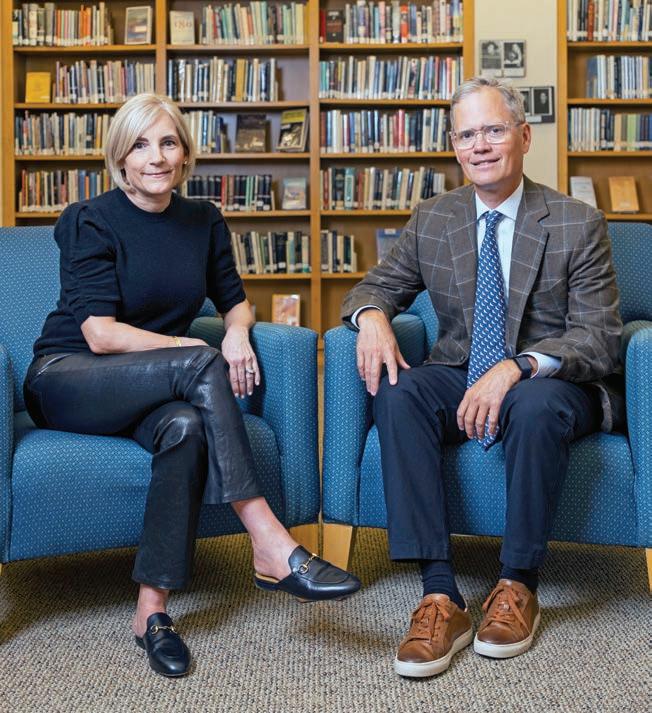
As alumni, can you share how Westminster impacted your lives?
Renée: I always tell people that Westminster was one of the best things that ever happened to me. Not only was it one of the happiest times of my life, but it was the experience that has most profoundly influenced who and where I am today. I arrived at Westminster a shy, quiet kid and left a more outgoing, confident young adult. And that was because of the incredible faculty, the strong community and the nurturing, but challenging, environment that allowed me to find my voice and gain confidence.
Brad: I grew up in Providence, R.I., and was the first person in my family to go to boarding school. Really, I didn’t know what to expect. But Westminster is by far the institution that has had the greatest impact on my life. And I think a lot of that had to do with the culture, the structure of the school and the expectations that were put upon me. It was a phenomenally transformational period in my life.
Was there a teacher who was particularly helpful or inspiring during your time on the Hill?
Brad: One of the people that really impacted my life was Mr. [David H.] Hovey, and not just on the lacrosse field, not only in the dorm, but in Algebra II, which was not a strength of mine. He had a policy where you could retake tests until you got it right. And sometimes I had to take those tests three and four times. But I did, and he kept pushing me to take them and gave me a sense that if I dug in deep enough and worked hard enough, I could achieve and accomplish whatever I wanted. I think out of that came a level of determination and perseverance that I clearly didn’t have before, and it has served me well academically and over the course of my career.
Renée: Several teachers impacted me at Westminster. I spent three years in Miss [Priscilla] MacMullen’s French class. She was an excellent and demanding teacher who inspired me to follow in her footsteps and spend my junior year in college studying in France. I was also fortunate to have the wise and steady support of Mr. [Robert] Rodney as both my dorm parent and advisor and the incredible kindness and encouragement of Mr. [Michael] Jackson ’49 — who gave everyone the confidence that they could conquer calculus.
Brad, how long have you served on the board, and what drew you to volunteer?
Brad: This will be my 17th year serving on the board, and I have been board chair for seven years. Westminster was hugely impactful for me, and I was determined to give back to the school in some way. Over the years, I hadn’t lost touch, but I hadn’t been terribly engaged with the school for about a decade after college. Then I went to Westminster Today about 20 years ago, and joined the board a year or two after that. It’s been a great way to reconnect with the school and stay involved, and it’s been fun to have two children graduate and two still here.
Brad, you led several committees as chair. What are some of the leadership challenges that come with the chair position?
Brad: When you are board chair, you’re basically on every committee. Prior to becoming chair, I chaired the faculty and student committee, which I really enjoyed because it gave you insights into the workings of the school and the culture and dynamics of the school. As the board chair, one of the things we were very focused on was the last capital campaign, and that was a very important part of the development of the school and a big priority for Bill Philip, who was head of school then.
Westminster Bulletin 18 Trustee News
Renée, you co-chaired the committee for Westminster’s 50th Anniversary of Coeducation and have served on several other committees. What has your experience been like?
Renée: The coeducation committee was interesting because I started at Westminster in September of 1981, exactly one decade after Westminster welcomed its first female students. At that point, I had no idea that I was entering Westminster in the early stages of coeducation. Forty years later, as an alumna and mother of two daughters who graduated from Westminster, it was incredible to reflect on the school’s growth during its 50 years of coeducation. As for other committees, I also co-chair the Advancement and Marketing Committee and serve on the Diversity, Equity and Inclusion Committee and the Committee on Trustees. Overall, being on the board has given me a deep understanding and appreciation for the work and dedication of the faculty, staff and school.
What do you see as the most important functions of the board?
Renée: First and foremost, the board is responsible for maintaining Westminster and ensuring that the school is fulfilling its vision and mission. Second, the board focuses on setting the long-term strategic priorities to sustain and advance the school.
Brad, do you have any advice for Renée?
Brad: My first piece of advice is to have fun. Being deeply involved with the school is fun and fulfilling, but at times it will be challenging. Also, realize that it’s not all going to go smoothly. Elaine and her team are overseeing 430 teenagers, which, as we all know, can result in bumps in the road. I worked hard to build a strong working relationship with Bill and now Elaine. That is critical to achieving success in this role.
What are some of the major issues facing independent schools currently?
Brad: Rising tuition. It’s expensive to send our children to boarding school, and it’s hard to figure out how people are going to continue to make the math work. Also, I think the level of specialization that is in today’s world cuts against what boarding schools stand for in general and Westminster in particular. For example, athletics: Historically, we’ve had students play three sports. Now, kids who are strong in one sport may choose to stay at their day school where they can focus exclusively on it. There are some bigger schools that are allowing more specialization than we do, and this is also true in the arts and academics.
What are some of the school’s priorities going forward?
Renée: We are currently working on Westminster’s next strategic plan, which will ultimately define the school’s key priorities for the next three to five years. One priority that will remain is continuing to build the school’s endowment. We’ve made huge strides here thanks to the incredible generosity of the Westminster community. But we will continue to focus on growing the endowment in order to invest in the people and programs that set the school apart and to increase financial aid and access to a Westminster education.
What are the qualities that make Westminster special?
Renée: There are many things that make Westminster special, but on the top of my list are the strong community and the incredibly dedicated, engaged faculty. These are two hallmarks of the Westminster experience that we will stay focused on preserving and strengthening as the school moves forward.
Brad: I agree with Renée — the sense of community and faculty are the two pillars that make Westminster so special.
You are both parents of Westminster students. Why did you choose Westminster for them, and how has it worked for you and them?
Renée: We raised our daughters in Minneapolis, where very few kids go to boarding school and where our girls were very happy. So boarding school wasn’t a consideration. During a trip back East to visit family, we happened to stop at Westminster to see our nieces on the way to Bradley Airport. As we drove down Williams Hill that day, we could see and hear the girls’ excitement. That last-minute visit made a big impression. Both of our daughters decided they wanted to go to Westminster, and they had a great experience.
Brad: Similarly, my kids weren’t really thinking about boarding school, but they knew a lot about Westminster. They came here for games, so it was very natural for them to come. It was a great experience for the two that have graduated, and the two that are here — so far, so good.
What pops into your head as one of your favorite memories from your time at Westminster?
Brad: Beating Hotchkiss in the nine times I played them in soccer, hockey and lacrosse. The one time we didn’t win (in hockey), we tied. Renée: The first thing that comes to mind are Hill Holidays. I just loved how special those days felt and how the whole school seemed to come together to pause and enjoy all that was wonderful about Westminster.
Brad, do you plan to stay involved with Westminster, and are you involved in other volunteer work outside the school?
Brad: Westminster will continue to be part of my life. I also serve on the board at PowHERful Foundation, a nonprofit that my wife and I started 12 years ago that helps to support young women scholars in college, and I plan to find another nonprofit cause to be involved with as well.
Renée, what do you look forward to as chair?
Renée: I’m looking forward to working closely with Elaine and supporting her as she leads Westminster forward. I’ve appreciated her strong leadership, her straightforward approach and her focus on connecting with students and their families, empowering faculty and staff and building an even stronger Westminster community. Elaine’s enthusiasm for Westminster runs deep and so does her understanding of the school and its ethos. I’m excited about her passion for moving the school forward — all while staying true to what makes Westminster special.
Spring 2023 19
Long-Serving Faculty Members
Kathleen Devaney and Mark de Kanter Departing
At the end of the current academic year, Kathleen Devaney H’02 and Mark de Kanter ’91 P’19, ’22 will be leaving Westminster, following 51 combined years of service. Throughout their time on Williams Hill, they have been community role models in balancing leadership positions and raising a family. Kathleen and Mark met each other shortly before coming to Westminster. They were married in Andrews Memorial Chapel and raised their family on campus. Emmett ’19 is a junior at Harvard University, and Samantha ’22 is a freshman at Boston College.
Kathleen and Mark have approached their work as a team, consistently embodying the school’s motto of “Grit & Grace” and are always willing to step up to the plate when asked to do more. In turn, they have expressed gratitude to Westminster for the dedicated faculty, staff and students who have helped to shape them into highly regarded educators and academic leaders. This spring, they will deliver the keynote address at Commencement, marking the end of their long tenure. On July 1, Kathleen, executive director of Horizons at Westminster, will assume her new position as Head of School at The Hill School in Pottstown, Pa.
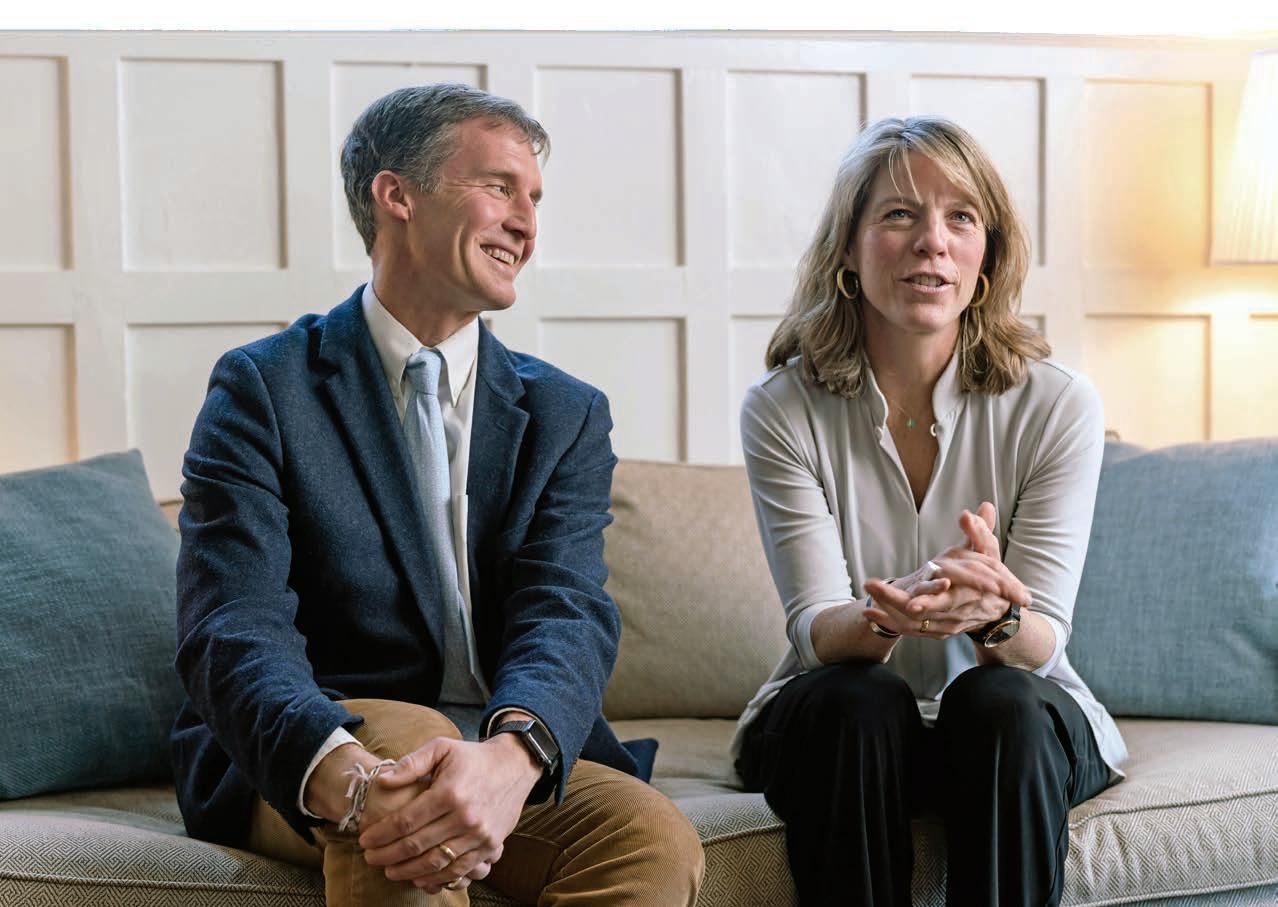
Westminster Bulletin 20
The Bulletin sat down to talk with Mark and Kathleen about their life and careers at Westminster.
Kathleen and Mark’s careers in independent school education began in Deerfield, Mass., in the mid-90s. Mark was teaching science and photography at Eaglebrook School, and Kathleen was teaching German and serving as an admissions officer at Deerfield Academy. Mark jokes he waited for his younger brother Seth ’97 to graduate from Westminster before he applied for a faculty position teaching biology in 1997. He moved into an apartment in the original Squibb House, the first of what would become many campus homes. A year after he arrived on Williams Hill, he and Kathleen were married, and Kathleen joined the Westminster faculty as a history teacher, Varsity Girls’ Lacrosse coach and dean of students.
In those first years, Kathleen had a lot on her plate, and she was grateful to faculty members who guided her early on, including Richard Miller P’01, Peter Briggs ’71, P’01, ’05, ’07, Nancy Urner-Berry ’81, P’11, ’16 and Dick and Barb Adams P’93 — a list that continued to grow as the couple settled into school life.
Westminster offered Mark and Kathleen many opportunities to grow — not only professionally, but as a family. They felt extremely fortunate to have given their children the benefit of growing up on campus and attending Westminster. “It wasn’t perfect all the time, but we felt very comfortable having our family embedded in the life of the school. Our kids had a wonderful experience here, and we are forever thankful to Westminster for all that it gave our children,” said Kathleen.
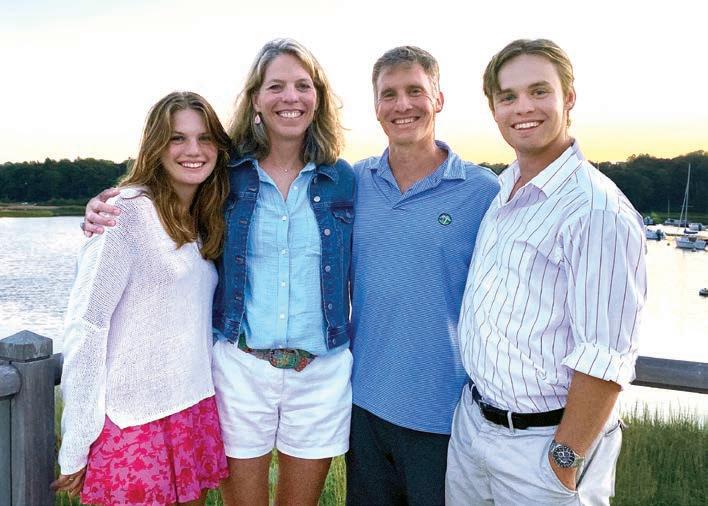
As parents and as educators, Mark and Kathleen have supported each other in their roles, often acting as each other’s sounding board when it came to making difficult decisions, brainstorming or just bouncing around ideas. But they are quick to note the knowledge and experience they gained through the many roles they held and relationships they have forged with colleagues during their tenure.
“Working in the dean’s office was an incredible experience,” said Kathleen. “When I started in 1998, our office was in a small room, which is now the bathroom in Fearn Hall. Over the course of 16 years, I had the opportunity to work with people who were really different from me — in terms of age, background and perspective. I couldn’t have done the job without them. In that office environment, one develops an important camaraderie, a shared experience. I feel very lucky to have had the opportunity to have learned from and collaborated with such great people.”
Kathleen remained in the dean’s office for four four-year rotations. She also relished the opportunity to serve as the director of student life and, ultimately, as assistant head of school for seven years. During that time, she worked with history and civics teacher Todd Eckerson P’09, ’11, ’17, ’21 on Westminster’s Crossroads Learning Program, a precursor to Horizons at Westminster.
“I found the partnership work Todd was doing in Hartford incredibly important, and the experience I gained while serving on the board broadened my perspective on education, civic engagement and educational equity. So, when former Head of School Bill Philip P’06, ’09 decided to create Horizons at Westminster, I was excited to step into the role of executive director. It is an incredible program, and I am proud of the partnerships we have created in Hartford,” she said.
For his part, Mark said that the relationships he formed with members of the faculty and administration opened many doors for him.
“One of my best early friends at Westminster was a wonderful teacher and human being named David Walton, who had been the associate head at another boarding school before coming here as a math teacher. Dave was able to build databases, and his ability was immediately recognized by Westminster. He built the academic and admissions systems that we used for well over a decade. I was always looking over Dave’s shoulder while he was doing that database work; when he and his wife, Kristin, left in 2002, I took over as the local database administrator. That move, along with my own pre-existing interest in incorporating technology into my teaching, opened my work with school technology and, eventually, my role as the director
Spring 2023 21
“Being a dorm parent allowed us to have a supportive role with our students, and many of our best memories were forged there.”
— Mark de Kanter
of academic technology. Meanwhile, attending Westminster Teaching Initiative, an internal professional development group built off Todd Eckerson’s work and run by former colleague Tim Quinn ’96, opened an opportunity to direct that program when Tim left Westminster, and my work in that area helped prepare me to put my hat into the ring for dean of faculty when that role opened in 2018. Over the years, working with other people in support of their initiatives helped set me up for other roles.”
The couple also came to understand that boarding schools have a long runway, and it takes time for faculty and students to fully hit their stride. “When Third Formers or new faculty members arrive, sometimes their growth might not happen until after a year or two, so it is important to understand the length of the runway, both for students and adults. It’s not a short game, it’s a long game,” said Kathleen.
That long-term dedication requires spending time with students beyond the classroom — in the dorm, in the dining hall and as a coach.

“I loved coaching swimming and cross-country. As exhausting as it was, those were some of my deepest and
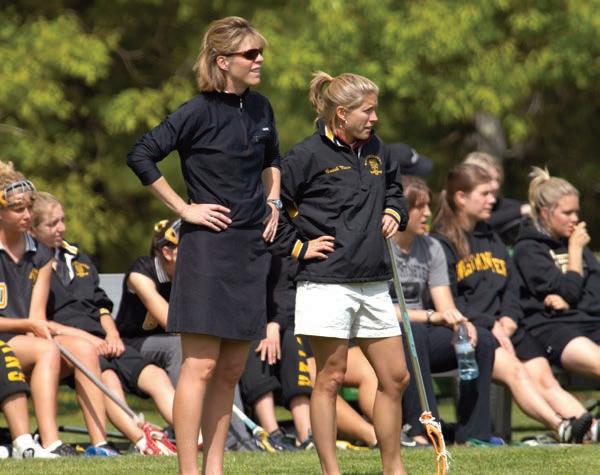


most meaningful connections with students,” Mark said.
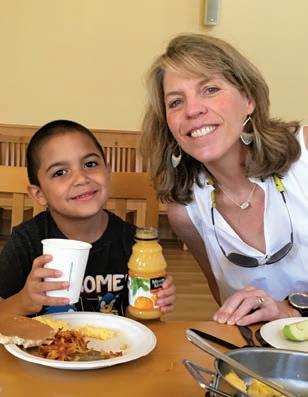
The time they spent living together as a family in the dorm also strengthened those bonds. “Those spaces allowed us to connect with students in an organic, unscripted manner … they came to talk about their day, complain about their homework, play ping pong in our apartment and to play with our dogs and kids,” said Mark. “Being a dorm parent allowed us to have a supportive role with our students, and many of our best memories were forged there.”
Faculty members at Westminster have to be present in students’ lives in different ways. “Westminster has done very well in nurturing that idea,” Mark added. “There needs to be lots of organic touchpoints for learning that happens in the margins, in the seams between different experiences,” he said.
At the same time, the couple learned it is important to step back and give themselves grace. As Mark put it: “You are being pulled in so many different directions, in so many ways, and you are doing lots of different jobs. So, when you’re trying to do those as perfectly as you can, and you’re holding high standards for yourself, you also have to learn how to give yourself grace when you can’t do it exactly how you chose to. Sometimes we fall short, and we have to allow ourselves to learn and move forward.”
Mark and Kathleen credit faculty and staff members who have not only generously provided them with the advice and guidance in their careers, but with whom they have developed deep friendships.
“We have learned so much from the good people who were our mentors,” Kathleen said. “Peter Newman ’80, P’16, Bill Sistare P’04, Lee Huguley P’19, ’26, Jess Keough, Betsy Heckman, Sara Mogck, Colleen Joncas ... that’s the beauty of this community: You get to have all these people in this space. Emily Neilson on the playing field, Peter Ulrich P’09, ’10, A-men Rasheed, people who have opened their spaces to you to let you learn … those are just a few of the many who come to mind. And Elaine and Chris White, I don’t think we realized what a gift seeing them do what they’ve done for two years was going to be
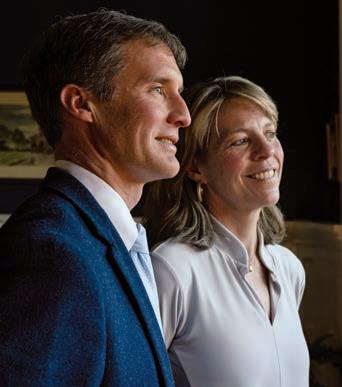
Westminster Bulletin 22
to us. We’re grateful for that.”
Mark added, “We also learned from the students. How different students have approached challenges in their life has helped us think about how we approach our own challenges.”
Over the years, they have witnessed the campus change physically with the addition of the Armour Academic Center and the new Armstrong Dining Hall and how those changes impacted the school.
“When I think about moving from Baxter to Armour Academic Center, I just remember thinking, ‘Oh, my gosh, look at what our school is doing,’” said Kathleen. “But very specifically, moving into the new dining hall, and feeling how the whole school fit, and coming together, and having round tables where you could talk to people. It felt so good to be in a place where physical and programmatic structures support the work you are doing.”
Mark continued: “We are so honored to share the school with our children as well as my brothers, Nate ’95 and Seth ’97, and sister-in-law Courtney ’97. We were lucky to be here with the previous heads of school, Graham Cole H’09 and Bill Philip P’06, ’09, and love the work and energy which Elaine has already invested into this school.”


“Now that Elaine’s tenure is well established,” he continued, “it is an appropriate time for other good people to come in and support her vision and that of the collective Westminster community.”
Kathleen added: “We really love our jobs. We love this place, we love our community. Nothing is pushing us or pulling us away. The opportunity came when it was right, and that’s why it feels good.”
As they contemplate their departure, they know they will miss the community and the campus spaces that have been so
much a part of their lives: their home — where they have lived the past 16 years — the cross-country course, the overlook, the chapel, the dining hall and many more.
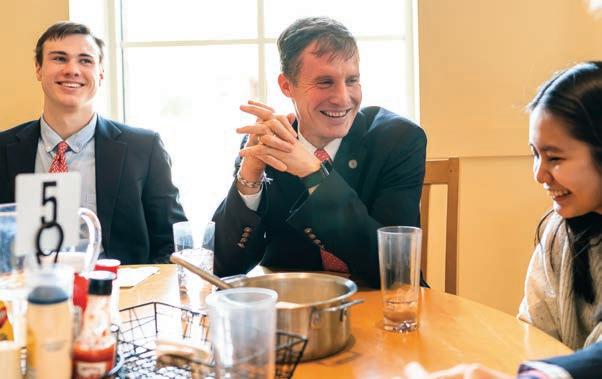
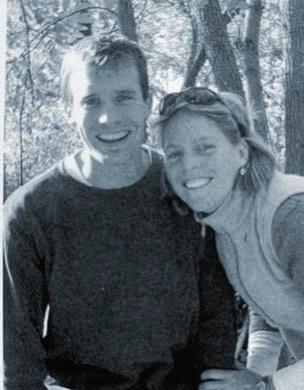

But for them, Westminster is much more than just a place.
“We are rooted here in so many different ways,” said Mark. “The connections we have made, some of those people are now at other places or they’ve graduated, but that gives us the opportunity to stay involved with Westminster events as alumni faculty,” said Mark.
“That is something else we’ve learned from our time at Westminster,” added Kathleen. She recalled advice she got from Dick Adams, a 43-year faculty veteran, who told her early in her career that working at Westminster was all about building relationships. “Those are things you don’t leave behind,” said Kathleen. “You lean in, you work on them, and you stay in touch.”
“...moving into the new dining hall, and feeling how the whole school fit, and coming together, and having round tables where you could talk to people. It felt so good to be in a place where physical and programmatic structures support the work you are doing.”
Spring 2023 23
— Kathleen Devaney
Fluorescent plasmid, giant robotic bugs and mining history
Three new elective courses were added to the curriculum this year to offer students more hands-on learning, in-depth study and problem-solving opportunities to better prepare them for the challenges of college and beyond.
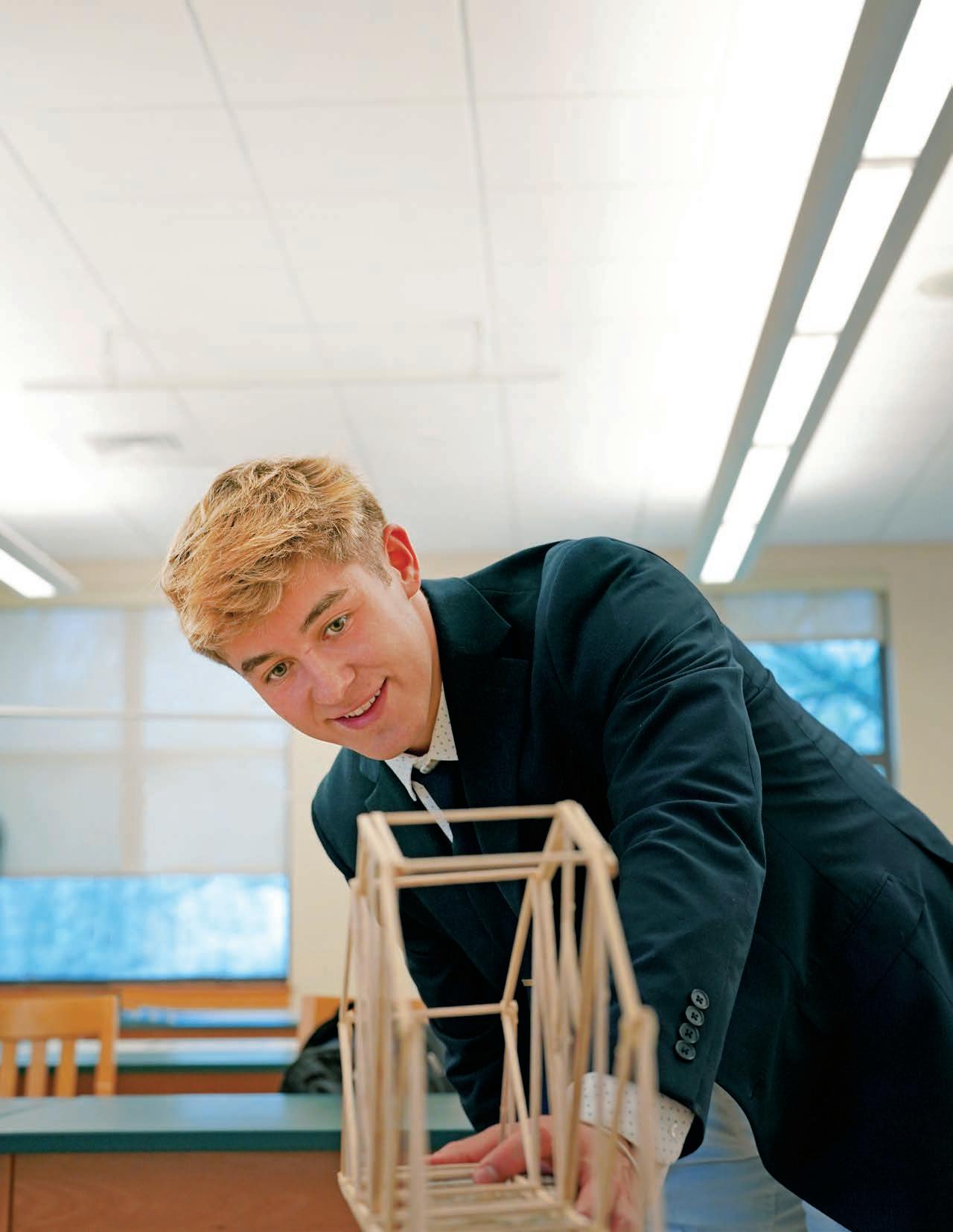
Westminster Bulletin 24
Hayden Raycraft ’23 at work on his bridge in Advanced Engineering and Design
In Kelly Lucas’ Advanced Biotechnology class, students used their own DNA to determine whether they tended to be early birds or night owls. In Sara Mogck’s Contemporary World History class, students discussed how the ramifications of the Haitian revolution continue to play out today. In Susie Bailey’s Advanced Engineering and Design class, students designed, built and tested model suspension bridges. Those were just a few of the topics covered in the new courses introduced last fall aimed at piquing students’ interests, broadening their understanding of real-world issues and expanding their skills.
All three teachers designed their course curriculum last summer, with support from The Head of School’s Faculty Support Fund, established by Sixth Form parents in the Classes of 2018, 2019 and 2020.
In the Lab
When Kelly Lucas was studying science in college, she found she often wasn’t as well prepared for the lab portion of the courses as she wanted to be.
So when she set out to design the curriculum for the new biotechnology elective introduced last fall, she wanted her students, especially those interested in science, to have highlevel lab experience.
Last summer, she completed several biotech webinars and researched different types of labs while preparing the coursework for the new biotechnology elective.
Creating the course from scratch was rewarding for Lucas, but the real bonus has been sharing her passion for cellular and molecular biology and biotechnology with her students.
Although the new course is labintensive, it’s not all test tubes and petri dishes. Students learn how biotechnology can play a role in their everyday lives. In the fall and early winter, the class worked on honing their biotechnology skills, focusing mainly on the basic techniques of polymerase chain reaction (PCR) and gel electrophoresis, the fundamental lab tools used to amplify target DNA sequences and visualize DNA. After mastering these techniques, they conducted a lab exercise that allowed them to determine their own genotypes for a gene associated with either being a morning or night person.
“It’s cool because we’ve actually put our own DNA to use, which is really interesting,” said Bianca D’Onofrio ’23.
For Jaden Goodsell ’23, the lab experiment was a surprise. It showed that he tended to be a night person, which was the complete opposite of what he thought he was going to be.
The class then delved into a discussion of recombinant DNA technology, another biotechnology tool that involves joining together DNA molecules from various sources. To explore this technique, the students conducted a transformation lab, in which they successfully inserted a foreign segment of DNA into
bacterial cells. The foreign DNA was a plasmid that contained the gene for green fluorescent protein, adding a visual element to the learning experience.
In a unit on genetically modified organisms (GMOs), students explored the topic by bringing in a variety of foods and conducting DNA extraction and lab testing to determine if the food has been genetically modified, which led to a discussion about the pros and cons of GMOs.
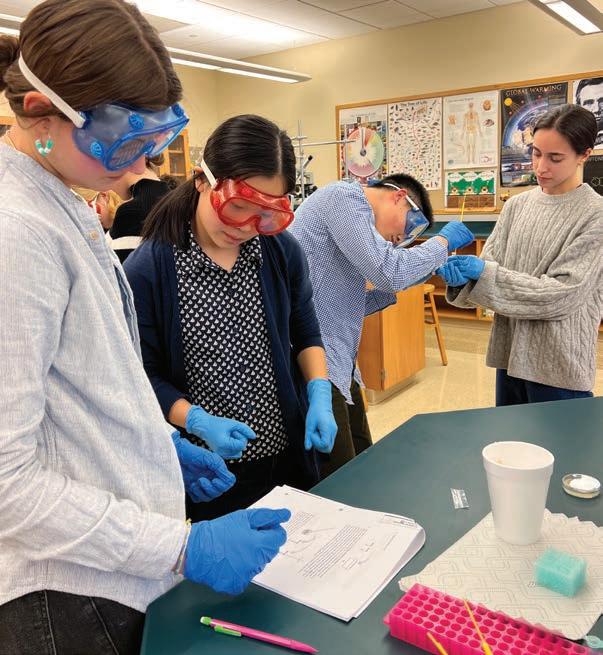
Continuing on the topic of food, the class did some of their own detective work into the current mislabeling of food products, specifically fish, in a unit on DNA sequencing.
“In New York City and other urban areas, a big issue has been the misrepresentation of certain fish in markets, where they are falsely labeled as higher-priced varieties. As a result, people are paying more for fish that is not, in fact, what it claims to be. We’re investigating whether or not this is a problem in Simsbury,” said Lucas.
As part of the process, the students collected fish samples from local grocery stores and markets. Then, they extracted DNA from the fish tissues, amplified a specific DNA sequence, and outsourced the DNA sequencing. After receiving the results, the students employed bioinformatics tools to genetically determine the specific fish species based on the DNA sequences.
Later in the year, students studied DNA sequencing and learned about the gene-editing tool CRISPR. They also read “How to Clone a Mammoth” and discussed the controversial process of de-extinction and the ethical concerns surrounding this technology.
“We take a holistic approach to science; students not only learn biotechnology but consider the ethics behind it,” said Lucas.
Spring 2023 25
“We take a holistic approach to science; students not only learn biotechnology but consider the ethics behind it.”
– Kelly Lucas
From left to right, Tomasina Pearman ’23, Tia MacDonald ’23, Allen Zhou ’23 and teacher Kelly Lucas working in the lab
A Global View
Sara Mogck introduced Contemporary World History as a Fourth Form elective last fall to replace AP European History. The new course is just as rigorous as the AP course, but students don’t spend the bulk of their time memorizing material for a nail-biting test at the end of term, explained Mogck. Instead, they have more time to be thoughtful and dig deeper into the course material.
The current trend in secondary school education is for students to take a broader view of history. So when Mogck worked on designing the new curriculum last summer, she focused on providing a global perspective, connecting those moments in history that continue to impact the world today.
She cites the impact of the Haitian revolution in 1804, which was the first successful slave revolt in history. Twenty years after the French granted Haiti independence, they demanded that the country pay reparations in exchange for its freedom. Haiti was forced to take out huge loans from French, U.S. and German banks and didn’t finish paying off its debts until 1947. The debt burden resulted in the Haitian government becoming chronically insolvent and contributing to the socioeconomic and political instability from which the country still hasn’t recovered. Today, the country’s increasing violence and a string of natural disasters have led to the tens of thousands of Haitians refugees fleeing the country, many of them heading to the U.S.
Haiti is just one example of the domino effect of historical events. “I want students to understand how events that happened 100 years ago can continue to affect the world,” Mogck said.
She also designed the course to help students become better readers, writers, speakers and critical thinkers. Without the anxiety of AP test taking, students can concentrate more on developing appropriate college-level skills.
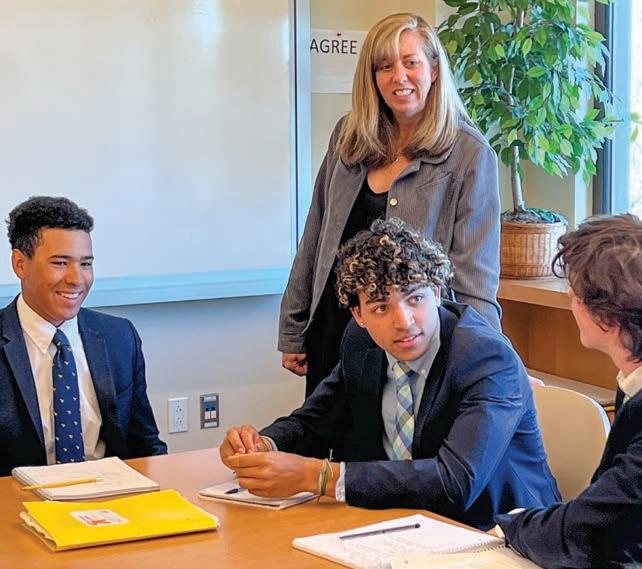
“For instance, if we’re studying Turkey, we might look at who the leader was at that time and what rights people had under him. Then, we would research the lives of people who were actually living there at that time, and find out what they had to say. It is the type of work that involves digging deep into a topic, using primary and secondary sources,” she said.
“We also work on writing and discussion skills. The Fourth Formers taking the course this year were in middle school during the pandemic, when classes were not in person, so we talked about how to build a good argument, how to present yourself and what to do and not to do.”
Heated debates take place in the classroom on topics that have included whether formerly imperialized nations should receive reparations or if controversial historical figures should be commemorated with statues.
Building Bridges, Bio-Inspired Robots and Human-Centered Design
Designing a curriculum for the new Advanced Engineering and Design elective gave Susie Bailey an opportunity to draw from her own professional experience, including 15 years working as a bridge engineer. Up until this academic year, she had taught physics exclusively with an eye toward adding an engineering course. Then, during COVID, she had the opportunity to earn a teaching certificate in high school engineering through an online 18-month course from Tufts University’s Center for Engineering Education and Outreach.
In her class, students work on projects following steps in the engineering process, which involves taking a project from an idea to brainstorming, prototyping, testing, feedback and iterating that testing process over again.
“It’s by far the most hands-on class that has real world applications,” said Sixth Former Hayden Raycraft, who plans to major in engineering in college. He was working on a project for a model bridge competition held by the Boston Society of Civil Engineers that required students to work in pairs and build the model bridges according to specific width, height and length requirements, using only straws and tape provided in a kit. The trusses were tested to determine their weight-bearing capacity.
“There is an academic piece involved in every project we do,” Raycraft said. “You have to do the math behind it first. With the bridge, we needed to determine how much weight each area of it could support before transitioning into building the model.”
A bridge engineer at heart, Bailey said she enjoyed teaching the technical and structural aspects of the project. Along the way, she also imparts practical knowledge to students,
Westminster Bulletin 26
“The Fourth Formers taking the course this year were in middle school during the pandemic when classes were not in person so we talked about how to build a good argument, how to present yourself, and what to do and not to do.”
– Sara Mogck
Left to right: In Contemporary World History class, Max Williams ’25, Carn Freeman ’25 and Alex Mihailovich ’25 discuss the Cuban missile crisis.
including basics like making sure projects are consistently presented neatly and legibly. “In the real world, those little things matter,” she said.
In the robotics unit of the course, students learned about biomimicry, the study of the biological functions of an animal. Using Lego Spike robotic kits, students created a structure that mimics a creature’s movements. This lesson came from Susie’s teaching certificate course at Tufts and is part of creating a set of tools for the students to use throughout the year.
Students also worked on projects for the Connecticut Science Fair that focused on human-centered design. “It’s very close to the engineering design process, but it is more interactive in that students reach out to the people who will be using their product and ask for their feedback during the process,” Bailey explained.
Another group of students was building a drone that could potentially deliver food to campus. “Building it is just one part of the project,” said Bailey. “But then there are essential questions: Where will it fly? Who will operate it, and how will the team navigate the project?”
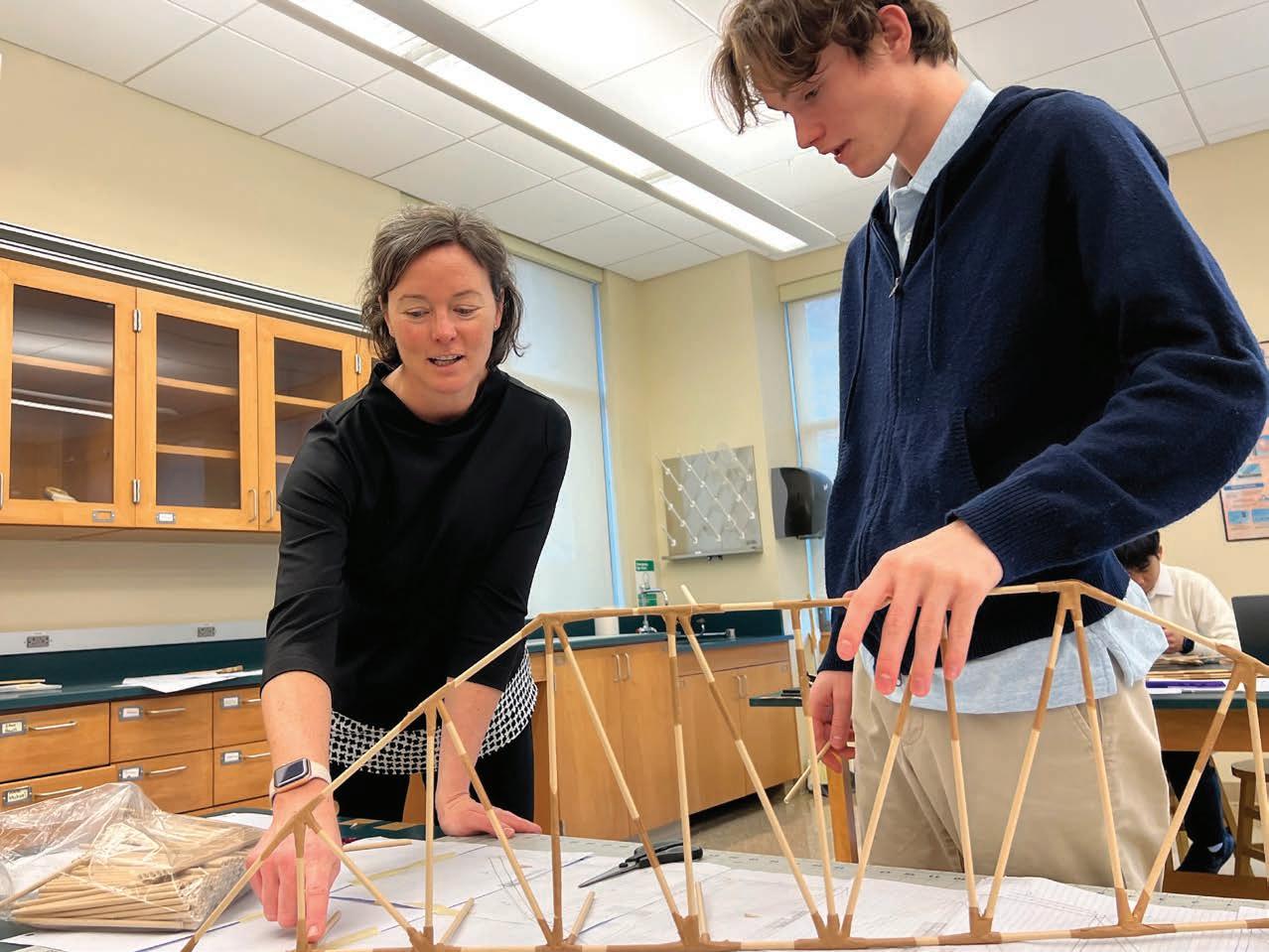
Another team is working on a mental health app that would allow students to share their workloads in order to help students and teachers navigate through the peaks of stressful weeks.
“It’s been a fantastic first year of this course,” said Bailey. “My students are curious and invested in their hands-on projects. They are learning new skills to take with them to the next level, and at the same time, they bring new ideas to class and are able to explore and share with each other. What could be better?”
Spring 2023 27
“My students are curious and invested in their hands-on projects. They are learning new skills to take with them to the next level and at the same time they bring new ideas to class and are able to explore and share with each other. What could be better!”
– Susie Bailey
Hewitt Shelton ’23 gets some helpful advice from teacher Susie Bailey.

Westminster Bulletin 28
Ella Ungerman ’24
Click! Capturing the Big Apple

Photography instructor Rachel Russell traveled with Advanced Placement Photography students to New York City in February, where they spent the day focusing on street scenes. Students researched a street photographer of their choice, such as Elliot Erwitt, Saul Leiter and Eugene Atget, and captured images that emulated their work.
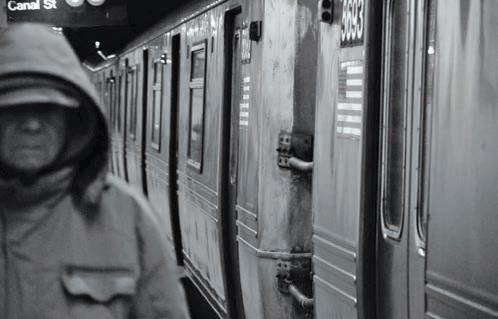



Spring 2023 29
Kelly Youngman ’24
Bryan Carey ’24
Nora Davis ’24
Kelly Youngman ’24
The Road to Westminster
Booker T. Bradshaw Jr. ’58, Westminster’s first Black graduate
The First Step
Booker T. Bradshaw’s road to Westminster began in Richmond, Va., where he was born and raised. His parents, both college graduates, recognized their son’s talents early on and wanted Booker to attend a private school beginning in eighth grade.

They turned to the National Scholarship Service and Fund for Negro Students (now the National Negro College Fund), which identified and placed Black students in boarding schools. The organization recommended they contact Westminster School. On Feb. 27, 1953, the Bradshaws wrote to Westminster asking for an application and a catalog.

At that time, the headmaster also served as the chief admissions officer and development officer. Only a month before receiving the Bradshaws’ letter, he had spoken with the director of student counseling services at the National Scholarship Service and Fund for Negro Students, who had recommended Booker as a candidate for Westminster.
Westminster’s response was encouraging, but also candid. In a letter to the Bradshaws, the headmaster wrote that the school “never had a Negro student and that [he] would have to consult with the board of trustees as was the case with any new policy.”

He continued, “I am persuaded that both faculty and students would be enthusiastically favorable.” He also wondered whether “the youngster who was the only representative of his race could feel fully at ease in the intimate family atmosphere of a relatively small school.” In conclusion, he wrote, “There is no question in my mind about his finding a warm and friendly welcome here.”
Soon after, Booker made his first visit to the campus for an interview, and the notes from his interview were kept in his school records.
Acceptance to Westminster
In a letter dated April 28, 1953, Westminster offered Booker a place at the school. At that time, the Bradshaws and the school agreed that an announcement of Booker’s attendance at Westminster should not be publicized.

Booker was excited to join the community and requested to live in a double. At first, the school said it might be a more difficult adjustment for Booker, since he was an eighth grader
The Bradshaws requested an application and a catalog after a recommendation from the National Scholarship Service and Fund for Negro Students.
Westminster Bulletin 30
Manager of First Tennis President of Choral Club
and new to the school. However, Booker’s father persisted, and the school eventually agreed. In September, 12-year-old Booker arrived on the Hill and quickly immersed himself in campus life.
An Exemplary Student
As a young man at Westminster, Booker quickly made his mark by excelling academically and athletically. He was an honor student, president of the choir, captain of the debate team, photo editor of the school newspaper, manager of the tennis team and captain of the football and hockey teams. He was awarded prizes for excellence in Latin, chemistry, general scholarship and public speaking.
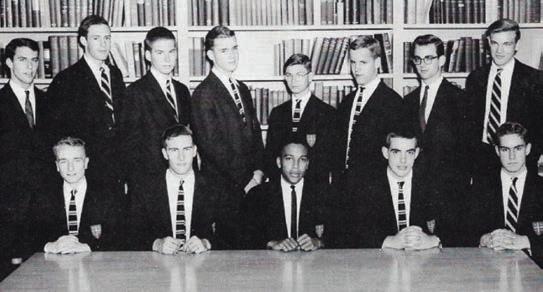
And he was well-liked by his classmates. Upon news of Booker’s death in 2003, the school received remembrances that provide a glimpse into his Westminster experience. In a letter informing the school of his death, his family attorney wrote that Booker “always spoke highly of his time at Westminster School, it was a true inspiration to his life.”
Gerald Fassett ’58 wrote: “We roomed across the hall from each other in Memorial in our Third Form, and Booker quietly established a sense of normality rather than discord which became my everlasting comfort level from then to now through a lot of life.”
Another classmate recalled that everyone in his class liked him, and his humor was contagious. “I appreciated Booker

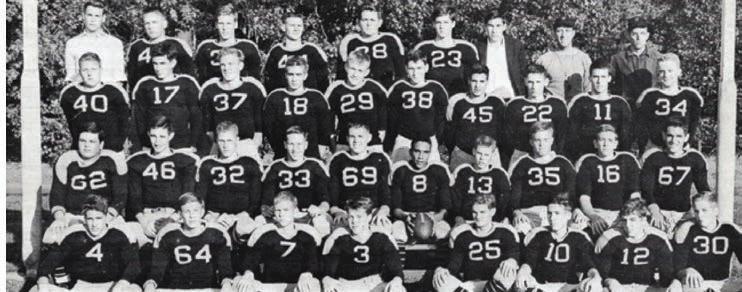
Spring 2023 31
“I truly admire how he was given the opportunity to succeed. He created a path for Black youth at Westminster and others to follow in his footsteps.”
— Alaiyo Bradshaw, Booker’s daughter
President of Religious Discussion Group
Captain of Second Football
Bradshaw’s convincing and heartfelt laughter,” wrote Herrick Jackson ’58.
Bertil Hille ’58 wrote that he and Booker were roommates for their last three years. “I looked up to Booker. He was strong, handsome, cool, proud, self-confident, smart and quick to answer cleverly, well-dressed, savvy, and sometimes expressed his emotions strongly. He had a Wollensak stereo tape recorder, a fine record player and a vast collection of jazz and vocal recordings that shaped my taste for the Modern Jazz Quartet, Dave Brubeck, Ella Fitzgerald and many others. We sang in the choir, and he taught himself to play the guitar.”
Hille also wrote that as a naive teenager, he had no perception of what it must have been like for Booker as the only Black student on the Hill. He did not recall ever discussing race with him. But he shared one memory: “We had a dance, perhaps with The Ethel Walker School, and I had signed up my ‘date’ for two dances with Booker. As it turned out, she was from the deep South, and it was 1956, so this pairing did not go well.”

After completing his Westminster education, Booker graduated from Harvard University in 1962 and from the Royal Academy of Dramatic Art in London in 1964. He had a successful career in show business as a television and movie actor, screenwriter, folk singer, record producer and Motown
executive, who managed the Supremes and other Motown acts on their first European tours. As one of the few Black people in entertainment at the time, he broke many barriers in the industry.
To honor Booker as the first Black student to attend and graduate from Westminster, the school held a dedication of the Booker T. Bradshaw Jr. Stage in Werner Centennial Center during reunion weekend last June. His daughter, Alaiyo Bradshaw, a painter, printmaker and professor of fine arts at Parsons School of Design in New York, attended the ceremony.
“I truly admire how he was given the opportunity to succeed,” she said. “He created a path for Black youth at Westminster and others to follow in his footsteps.”
Booker shared his love of jazz music with his classmates.
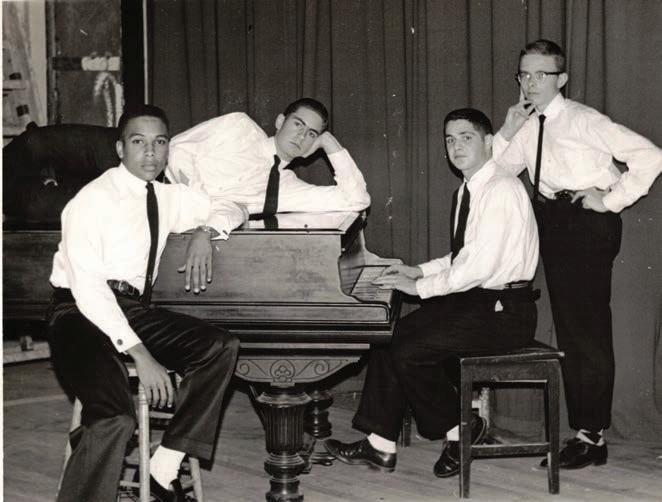
Westminster Bulletin 32
Booker’s senior yearbook page.
“I looked up to Booker. He was strong, handsome, cool, proud, self-confident, smart and quick to answer cleverly, well-dressed, savvy, and sometimes expressed his emotions strongly.”
— Bertil Hille ’58
What It was Like to be the First Black Student
In the early 1980s, Booker wrote for the Bulletin describing what it felt like to be the first Black student in an all-white world on the Hill.
By Booker Bradshaw Jr. ’58
I can remember my first day at Westminster as clearly as though it was yesterday. My parents had just driven away and left their only child — a 12-and-a-half-year-old Black boy — standing alone and lost on the Hill. “Remember, you don’t have to stay,” were my father’s last words. It was a moment of truth, a coming of age for a Black boy in white America. From that point on I was on my own. But on my own with a choice! Ironically that same choice would face me the rest of my life. And based upon my decision, I would either advance into maturity or retreat and remain a child.
In preparation for that first day, my farsighted parents had given me the advantages of world travel, a loving home life, and exposure to their cross-country circle of friends. As a result, I had a keen sense of who I was. It was only where I was that worried me. Despite their warm reception and assurances of the headmaster and the school staff, I was still about to step out of the shelter of an all-Black, segregated public school in Richmond, Va., and take the precarious giant step of becoming the first Black student at Westminster. Not to over-dramatize the situation. This was not Little Rock and there were no Federal troops or racist demonstrators. But, hell, I was only 12 and the moment was traumatic. “Why me, Lord?” I couldn’t help thinking. But as I looked around at the sea of white faces that were to become my future friends, I found myself returning their smiles with the comforting thought: “The Lord must have loved white people, ’cause he made so many of them.” What the hell, I figured, the sooner I learn to live with ’em the better.
That was the start of my Second Form year. And, for better or worse, over the next five years the Westminster experience taught me the basics — friendship, trust, healthy competition, self-reliance and self-respect — to stay my life on and be staid. Most importantly, the school set a tone by which I have tried to live out the rest of my life: “Virtute et Numine” — with grit and grace. Because I didn’t have to stay … I chose to stay. I am certain that was one of the most important and one of the best choices I ever made. I am thankful for the opportunity for that choice, proud of my decision, and enriched by the thought that because I stayed ... I made it possible for other minority students to follow.
The years that have passed since my graduation have been basically a succession of choices like that first day at Westminster. Because I didn’t have to … Harvard College, the Royal Academy of Dramatic Art in London, a professional singing career that took me around the world several times, a business career with various record and film companies, an acting career that carried me from Broadway to Hollywood and a current writing and producing career in TV and films. All because I didn’t have to. All because I was able to choose. All because of the wisdom of my parents and the preparation of Westminster. Thanks to that first, correct choice of Westminster, the rest have been easy. At the risk of sounding like saccharine and old jockstraps, I’m proud to be one of your sons, Westminster. In the words of Lord Buckley, “Would it embarrass you very much if I were to tell you that I love you?” I hope not, because I do.
Spring 2023 33
Here’s a glimpse of the school’s diverse student body today. 25%/75% Day/Boarding Students 15% International Students 20 Countries Represented 25 States Represented 25% Students of Color 425 Number of Students 50%/50% Boys/Girls in Student Body
With a Can-do Attitude, Will Smith ’10 is Changing the Future for Youth
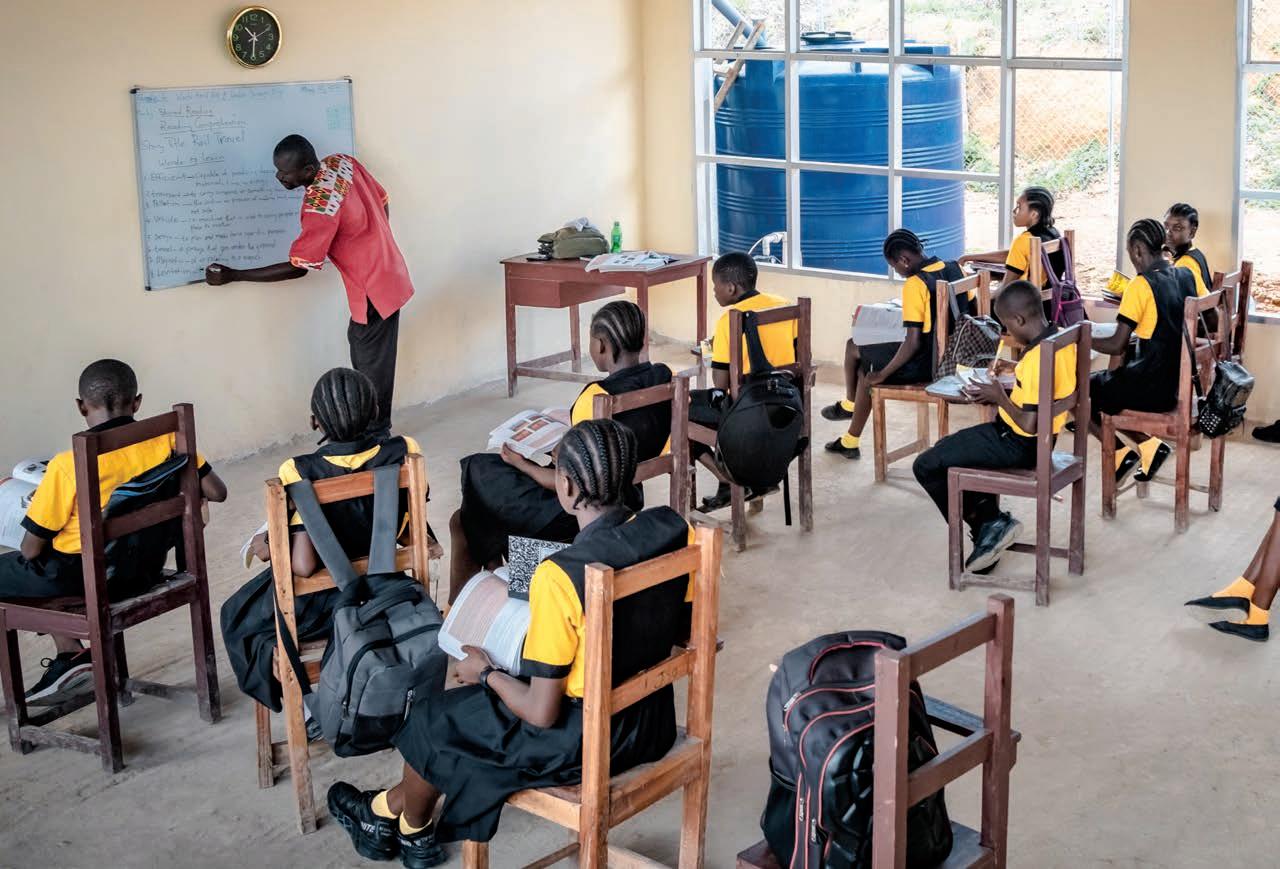
in Countries Around the World
Will Smith ’10 is the founder and executive director of LEAD Edu, a global nonprofit that aims to build a generation of ethical, empathetic and entrepreneurial leaders through education and athletics.
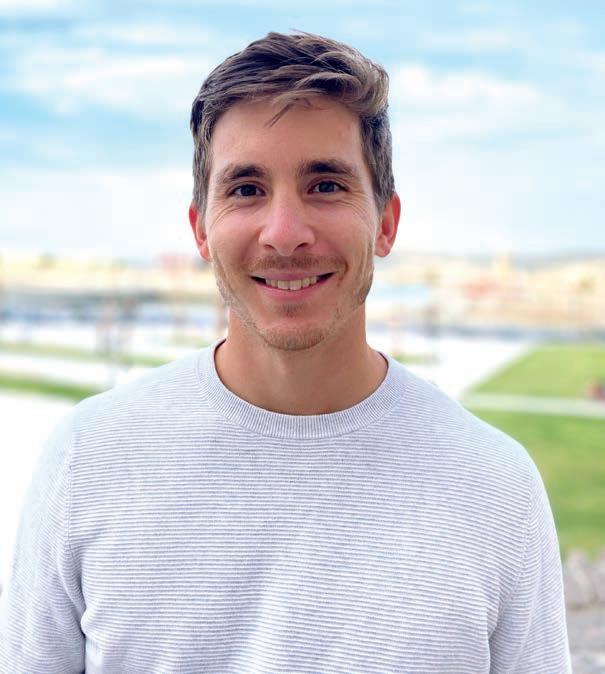
Westminster Bulletin 34 Alumni Voices
Will Smith ’10
When Will Smith was a star athlete at Westminster, he never imagined his passion for soccer would lead to a career empowering young scholar-athletes in countries around the world.
His journey from the Westminster soccer pitch to the playing fields in Liberia and Morocco, where he cofounded two soccer academies, began after he graduated from Westminster. Smith attended the College of William & Mary, where he played Division I soccer all four years. A two-year captain, he was named Scholar All-American and CAA Defensive Player his senior year. But it was during his junior year in college that soccer, quite unexpectedly, began to play a larger role in his life.
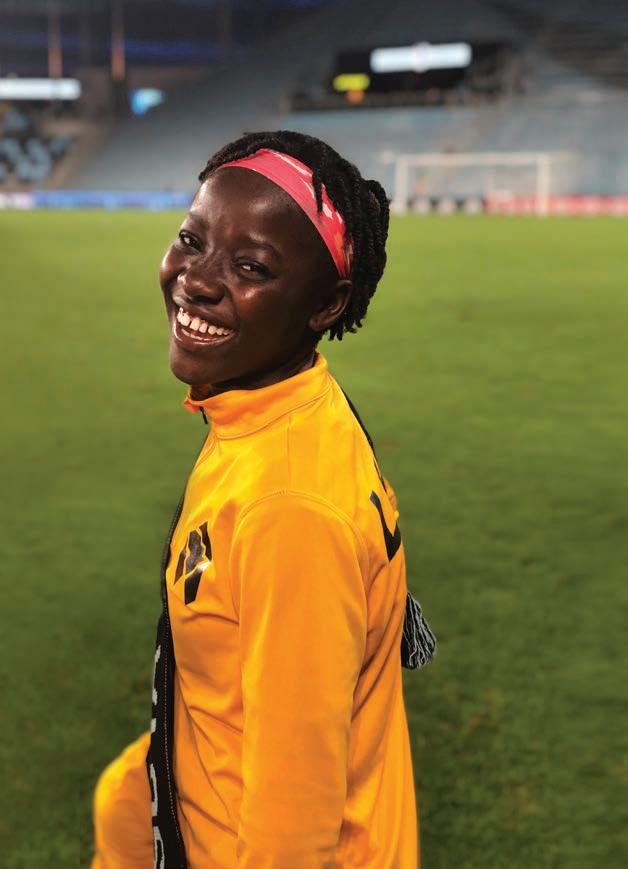
In the fall of his junior year, he signed up for a course in African politics, which opened his eyes to the coastal West African nation of Liberia, whose history is deeply intertwined with the United States. By the end of the course, Smith was
fascinated with Liberian history and eager to learn more about it. The following spring, in May 2013, he traveled to Liberia’s capital city, Monrovia, and spent three months conducting honors thesis research and completing an internship in the U.S. Embassy. Smith’s research brought him to fishing communities across Monrovia, localities rarely visited by non-Liberians. At first, he had difficulty connecting with community leaders, who didn’t fully understand or trust him. Then, one day, he saw a group playing soccer and asked one of them to pass him the ball. He did a few tricks and their faces lit up. Soccer then became an essential key unlocking the door toward a deeper relationship with the entire community. While he was in Monrovia, Smith continued training for his senior season at William & Mary. Through a friend, he was invited to Saturday morning pick-up matches with professional players, and he eventually received an invitation to play with George Weah. Today, Weah is the president of Liberia, but at the time he was better known as the only African ever named
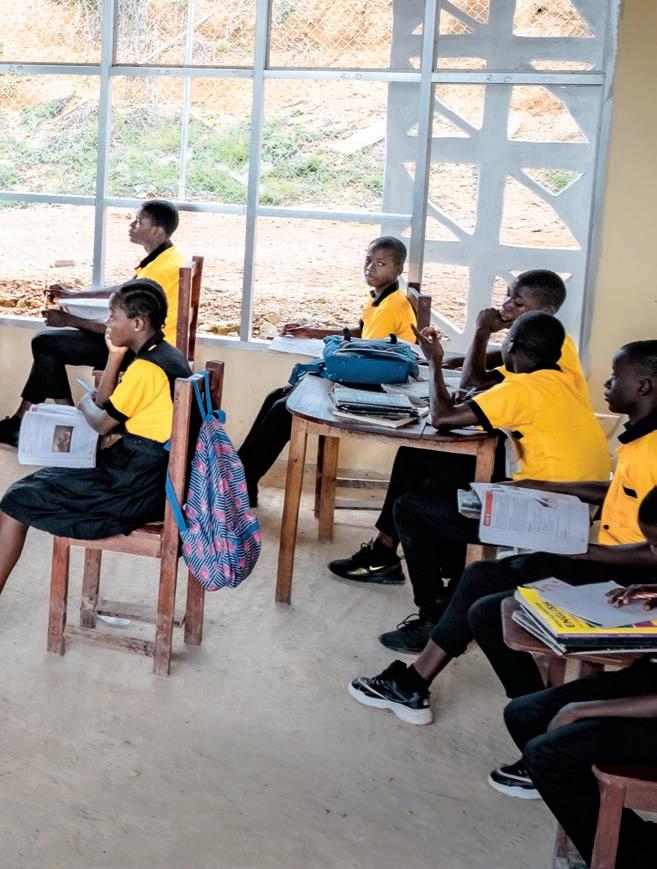
Spring 2023 35
“Our vision is to produce a generation of young people equipped with the leadership skills, values and tools required to drive positive changes.”
A classroom at LEAD MFA. Since founding it, Smith has started LEAD Morocco and is expanding LEAD Edu globally.
Blessing Kieh ’24
the FIFA World Player of the Year and “is arguably the greatest African footballer of all time,” said Smith.
Again, the soccer connection proved fortuitous. After playing together for the first time, Weah invited Smith to continue training with his friends and, a few weeks later, invited him to join several African soccer legends in a match organized to celebrate Liberia’s 10 years of peace, dubbed the Liberian Peace & Reconciliation Match. Smith jumped at the chance and soon found himself in Liberia’s national stadium, playing in front of 35,000 people with legendary soccer players he had grown up watching on TV. During that experience, Smith saw firsthand how young people rallied around soccer, and he realized the sport’s potential to be a force for good in the country.
Back at William & Mary for his senior year, Smith read everything he could find on Liberia’s history, focusing specifically on its education system. One year later, he enrolled in a master’s program in African Studies at Oxford University to study under Jonny Steinberg, a South African academic and writer who has written extensively on Liberia. Then Ebola
struck. In response, while studying at Oxford, Smith and his Liberian soccer colleagues began developing a concept to support the country’s recovery from Ebola. About 10 months later, in October 2015, Smith moved to Monrovia to cofound LEAD Monrovia Football Academy (LEAD MFA), the first school in Liberia to combine high-quality education with elite soccer training.
The concept was simple: Use soccer as an incentive for boys and girls to improve in the classroom, break down gender barriers and empower Liberia’s future leaders. Additionally, and critically, according to Smith, the goal was to build a sustainable organization that would be run by Liberians, for Liberians. From the outset, LEAD MFA committed only to hire Liberian staff.
LEAD MFA began with $99,000 in funding, operating in leased facilities and a rented soccer field in Central Monrovia. More than 275 children applied in the first year; 16 boys and 11 girls were accepted. The BBC would later call LEAD MFA “the first football academy in Africa to be founded on gender equality.”
Three years later, in 2018, Smith was approached by
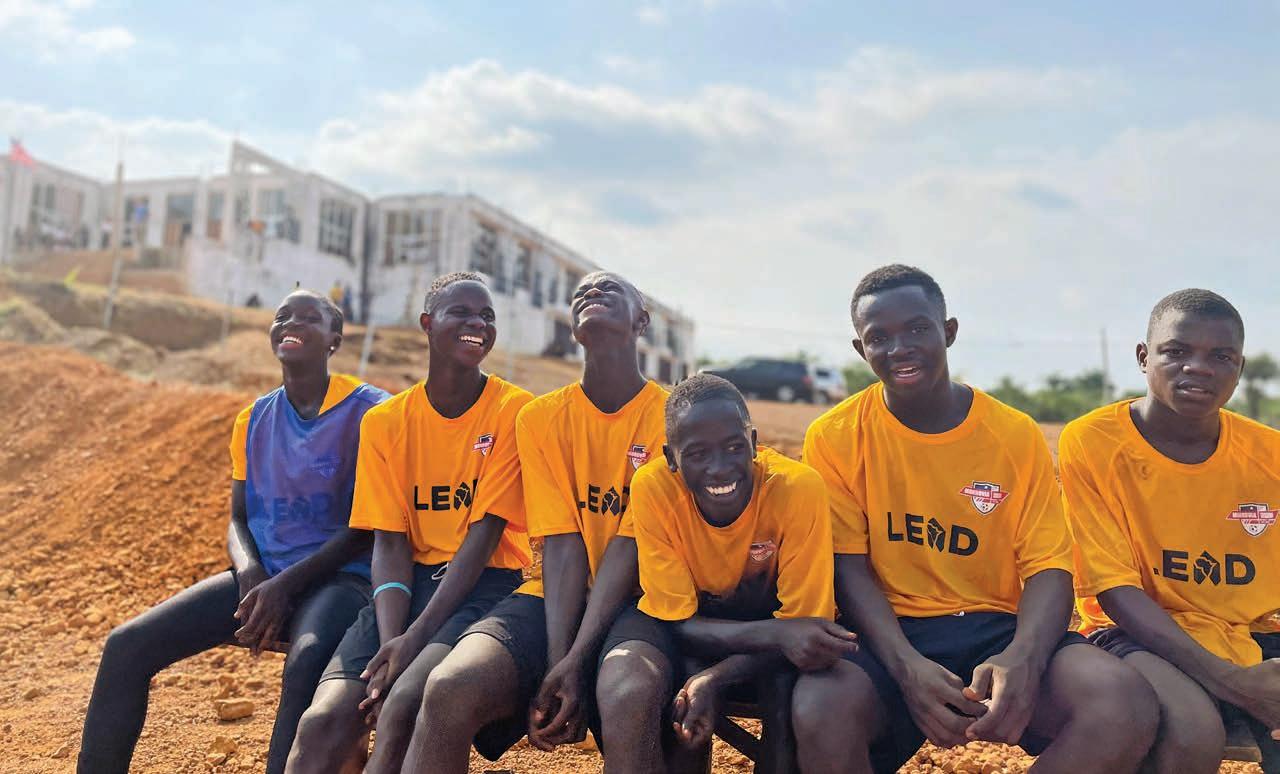
Westminster Bulletin 36
Voices
Alumni
“On the first day of school, we only had 16 boys and seven girls. We were committed to achieving 50/50 gender equity, so we had to go into the community and find girls who wanted to be part of the program.”
Students in the LEAD MFA program have the potential to become political, economic and social leaders in their communities.
philanthropists with a vision to expand leadership development programming globally. In response, Smith founded LEAD Edu to provide financial and technical support to LEAD MFA and incubate and help to grow new leadership academies in other places. The first two were LEAD Morocco, established by a group of Moroccan social entrepreneurs supported by LEAD Edu in 2019, and LEAD Learning, a leadership course that could be offered globally. Today, LEAD MFA and LEAD Morocco educate and train 240 full-time student-athletes and provide 3,000-plus children with sport and life skills-based programs annually. Additionally, LEAD Learning, an online leadership course that teaches young people core leadership values such as empathy, resilience, tolerance and perseverance, has reached more than 135,000 children in Liberia, Morocco and Bangladesh.
Combining academic classes and elite soccer training isn’t a new concept; in fact, there are several training centers across the African continent, and well-known global soccer teams have established academies to recruit and train talented children, often with the aim of producing professional soccer players.

But Smith said LEAD Edu’s core objective is different. Rather than recruiting boys and girls who might be candidates for professional soccer, the organization’s overarching mission is to identify youths who are passionate about both education Blessing Kieh
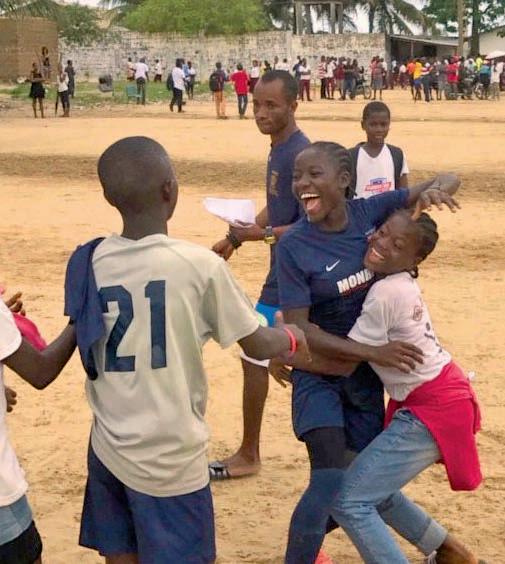
Spring 2023 37
LEAD MFA provides its students with quality education and elite soccer training.
’24 during a tryout match
Alumni Voices
and soccer and have the potential to become political, economic and social leaders in their communities.
“Our vision is to produce a generation of young people equipped with the leadership skills, values and tools required to drive positive change,” Smith said. “The way to effect real, systemic change — not only in Liberia and Morocco, but here in the U.S. and around the world — is by delivering opportunities to young people who come from under-served backgrounds and have significant potential.”
Leadership has always been a major focus of Smith’s life. The core values of athletics –– teamwork, respect, discipline and perseverance –– were instilled in him early on when he started playing soccer in grade school, and later at Westminster, where he captained the Varsity Boys’ Soccer team. He also came from a family that encouraged him to be creative and think independently.
Smith grew up in Avon, Conn., and his parents are Julliard-
educated classical musicians. He followed in the footsteps of his three older brothers by attending Westminster. All three were day students, and each of them would go on to pursue very different careers.
“My oldest brother, James ’01, is a professional oboist. My second-oldest brother, Chris ’03, owns and runs a brewery called the Virginia Beer Company in Williamsburg, Va., and my third-oldest brother, Ben ’06, is a professional hockey player,” Smith said.
While his family encouraged him to explore and try different things, he credits Westminster with helping to expand his horizons. “So often we think of New England prep schools as being entrenched and enclosed, but when I attended Westminster, there were 20 different countries represented in the student population. I learned from friends who came from different contexts and cultures and began to understand that one’s background significantly shapes one’s perspective — and we who come from relative privilege are much better off listening rather than telling. That was a hugely important lesson that helped guide my approach to starting LEAD MFA,” he said.
It proved critical when he and his Liberian colleagues ran into obstacles launching LEAD MFA. “On the first day of school, we only had 16 boys and seven girls. We were committed to achieving 50/50 gender equity, so we had to go into the community and find girls who wanted to be part of the program and bring the number up.”
Smith and his Liberian colleagues reached out to community leaders in West Point, a small coastal community in the heart of Monrovia where Smith had done his thesis research in 2013, and where he and his colleagues built relationships through soccer. They helped set up a soccer game on the beach with a few girls from the community who might be a good fit for the program.
Blessing Kieh ’24 was helping her mother at her food stand selling roasted cassava on the beach in West Point after school one day when she learned the academy was holding a tryout to recruit girls.
Smith recalled meeting her with his colleagues when they arrived.
“We set up a three-versus-three match in which Blessing participated. In the end, four of the girls passed the academic entrance exam and also showed real excitement about playing soccer, and so they were admitted, including Blessing. She has been with the academy since day two,” said Smith.
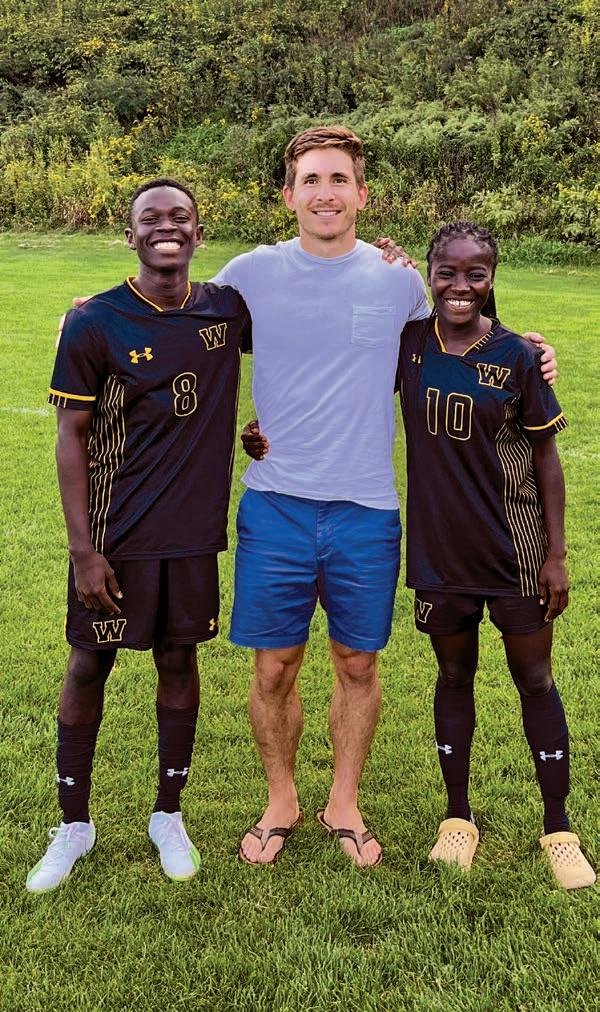
Smith’s successor and LEAD MFA’s current executive director, Sona Traore-Sesay, described Blessing as a student-athlete who from the very beginning had significant potential. “She has seized the opportunity. She is really driven, a very talented athlete who also thrives in the classroom,” said Traore-Sesay.
Since arriving at Westminster, Blessing has performed extremely well both in the classroom and on the pitch, maintaining a strong academic average and playing a starring role on a Varsity Girls’ Soccer team that has reached the New England semi-final last year and the finals this year.
Last fall, another LEAD MFA student, Abraham Monsee ’25, arrived on the Hill. Playing soccer has always been Abraham’s passion, and he’s excited to pursue it as part of his future.
Westminster Bulletin 38
Left to right: Abraham Monsee ’25 , Will Smith ’10 and Blessing Kieh ’24
And, thanks to his experience at Westminster, he is now also considering a career as a civil engineer.
While both students found leaving their homes in Liberia difficult at first, Blessing and Abraham are now fully engaged in the community. They’re grateful for the education they are receiving at Westminster and excited about the opportunity to pursue their dream of playing professional soccer. “It’s been great here at Westy. It has given me so many opportunities for me to see the world, academically and through soccer,” Blessing said.
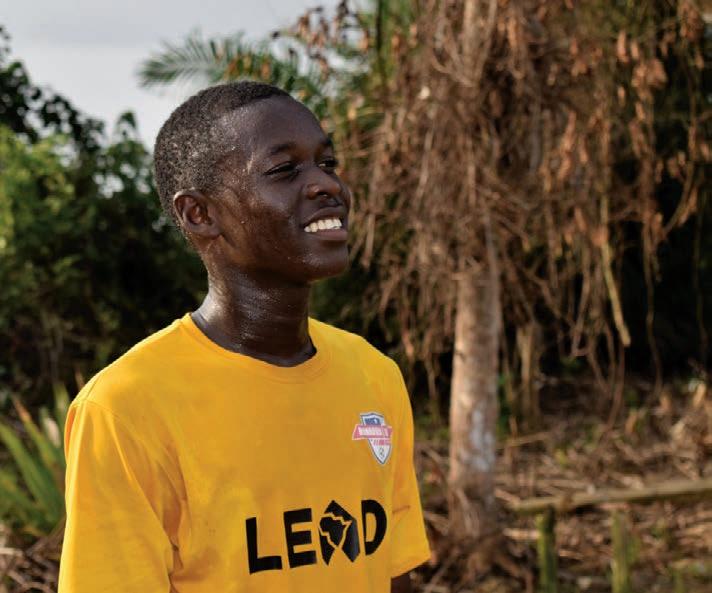
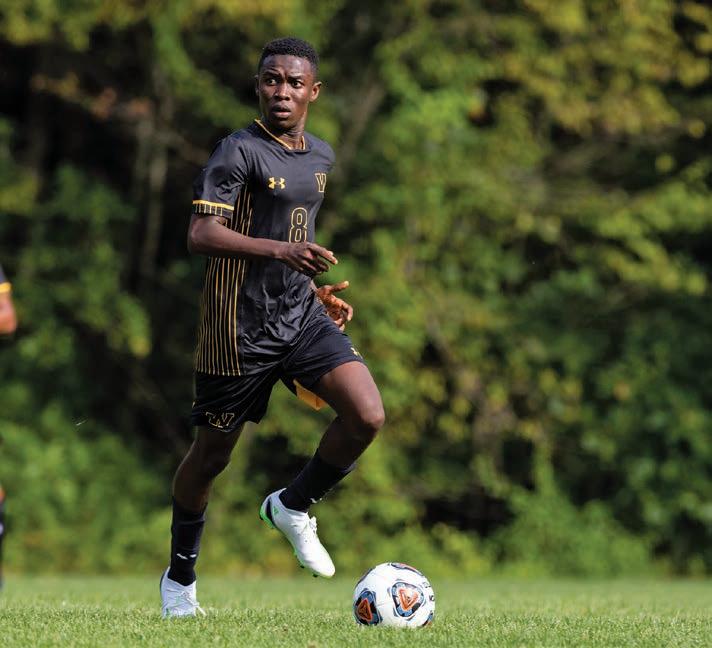
While some LEAD Edu students’ paths to leadership might be to attend an American boarding school, as Blessing and Abraham did, Smith and his colleagues want to dispel the narrative that they have to leave their countries to succeed.
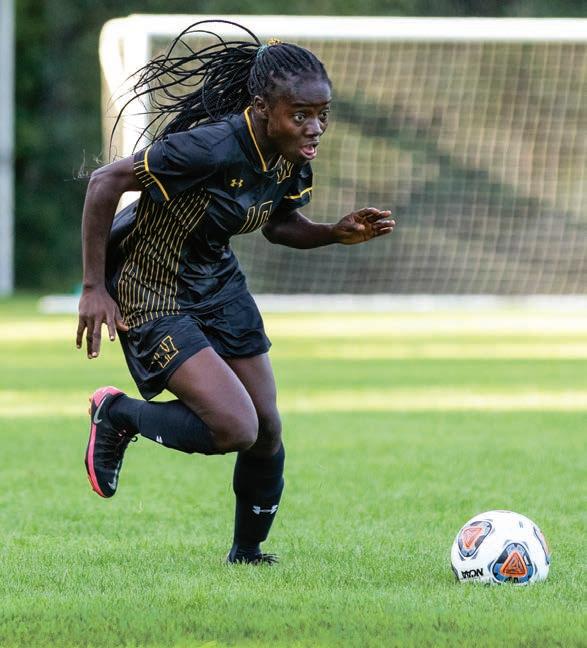
“There are so many fantastic opportunities across the African continent that we also want our students to be able to access, including the African Leadership Academy, a two-year course in Johannesburg, South Africa, and dozens of top universities such as Ashesi University in Accra, Ghana,” he said.
In 2023, LEAD Edu is looking forward to further developing the campuses in Liberia and Morocco, as well as revamping and expanding LEAD Learning into new countries.
Throughout his journey, Smith has drawn inspiration from his Westminster experience — in particular, from a Chapel Talk he gave his junior year.
“I was 16 or 17 years old, standing in front of hundreds of people and speaking about my own personal experiences. It was nerve-wracking and scary,” he recalled. “But that experience gave me
the confidence to step into public spaces and be able to share my own story. Today that is absolutely critical to what I do. I am much more comfortable speaking in front of folks, talking about my experiences around the world. I can draw a pretty clear line back to that moment in Chapel when I realized, ‘Okay, I can do this.’”
Scan to watch a video and learn more about LEAD Edu.

Spring 2023 39
Abraham Monsee ’25
Blessing Kieh ’24
Abraham Monsee ’25
BUILDING A SPACE FOR WOMEN IN CONSTRUCTION
Janet Bowler Bates ’01, P’24, is on a mission to get more women to join her in the construction field. “I want women to know that construction is an option. About 20 percent of people in the industry are women. But only three percent are tradespeople, while in sales and office, 71 percent are women,” she explained.

Westminster Bulletin 40
Alumni Voices
n fast-growing Charleston, S.C., Janet Bowler Bates is leading business development for JE Dunn Construction, one of the largest general building contractors in the country. She is the firm’s client solutions manager, working in the commercial office, education, hospitality and healthcare markets.
Soon JE Dunn will begin work on a transformative revitalization project that Bates brought to the firm — construction for the historic adaptive reuse of the Navy Yard Charleston, which was decommissioned in 1996. “I sell our team and the resources JE Dunn can offer,” she said.
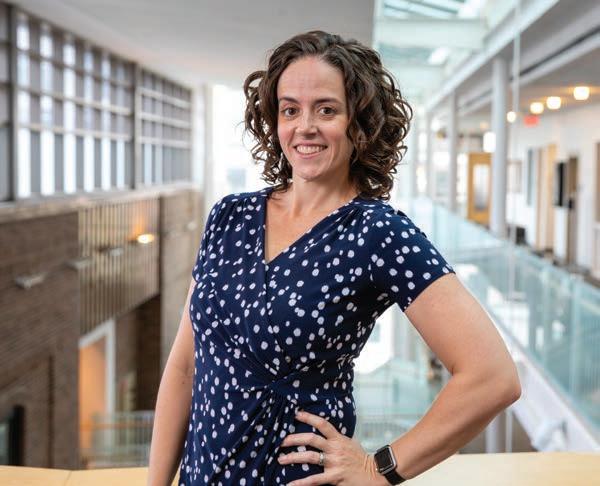
Bates is the past president and a founding member of the Palmetto Chapter of the National Association of Women in Construction (NAWIC) and works with local organizations to recruit new workers into the building trades. “My favorite part of my job is community engagement,” said Bates. Visiting local schools, she addresses primarily middle school-aged students, familiarizing them with opportunities in the construction industry.
“I spend a lot of time and effort speaking with girls and engaging the younger generation. They have so many questions: ‘What do you do? How much money do you make?’ They are so open and moldable. Boys and girls need to see that women can be in the construction industry,” she said.
Bates is a member of the board of directors of the Charleston Metro Chamber of Commerce. She is active in the Women’s Business Center, which offers free business development guidance to women entrepreneurs, and advocates at a statewide level about industry issues, including childcare.
“Organizations know that childcare is a business issue; we are working to find solutions,” said Bates. “For that single mother, who is going to watch the children when concrete is being poured at 2 a.m.? Where can a mother pump for breastfeeding? We need to create an environment where everyone can show up as they are and be supported.”
Bates entered the construction industry by chance. After Westminster, she attended The George Washington University, earning a B.A. in theater and dramatic literature in 2005, and moved to New York City, where she performed in a handful of off-Broadway productions and studied at Michael Howard Studios. “I didn’t like auditioning, and I didn’t want to end up living in a garbage can,” Bates recalled. By 2007, she decided to return to Connecticut, where her parents were then living.
“I knew that if I didn’t teach or act, I would go to business school,” she said. “My father suggested the Business Bridge Program at the Dartmouth College Tuck School of Business.” She completed the program and joined Hartford, Conn.-based Fathom as an account executive supporting website, logo and brand strategy for clients. “I knew that to advance, I needed to continue my education,” she said. She was accepted to the Kenan Flagler Business School at the University of North Carolina at Chapel Hill. “I hid there during the recession,” recalled Bates. She earned her MBA in 2011. As a student
seeking internship opportunities, Bates said that as a former actor, she was not on the top of anyone’s list. “I did handle rejection better than my classmates,” she said.
Among her many interviews was one with CF Evans, a residential construction firm in South Carolina that was seeking a brand and marketing intern. “The company had a good story. I walked in with their website printed on paper, all marked up, showing them what needed to be done. I used skills from Fathom. I had zero construction experience,” she recalled.
“I interviewed employees and fell in love with the environment. Seeing something go from a blank lot to something vertical is amazing. By the middle of the summer, I had a full-time offer,” said Bates. She returned to CF Evans, where she served as director of marketing, and then as director of business development and marketing before being recruited by JE Dunn in 2020.
Bates arrived at Westminster as a Fourth Former from the Singapore American School in Singapore. “We knew the family was going to be returning to Connecticut, and my parents felt I needed to spend three years in one school,” she said. “I immediately became involved in Belles, Chamber Choir, Chorale and Dramat.”
As a student, she was president of Belles and was awarded the Francis Hopkins Award for Drama. “The theater was my second home,” she said. “I was spoiled very early to be able to perform and learn in such a beautiful theater.”
She returned to campus recently — this time as a parent. Her stepson Elijah Bates ’24 came to Westminster as a Fifth Former. “We wanted him to get a more global world view. Coming from a city with an extensive history of race issues, we wanted our children to learn accurate history and attend a school making intentional diversity efforts,” said Bates.
History and Civics Teacher Todd Eckerson is Elijah’s advisor and someone who looms large in Bates’ Westminster experience. “To this day, I am nervous around him. One day, when my first class was cancelled, I left campus to get coffee. He placed me on final probation,” she recalled. “I’m sure he doesn’t remember — I was so scared of him!”
Spring 2023 41
I
“Organizations know that childcare is a business issue; we are working to find solutions. For that single mother, who is going to watch the children when concrete is being poured at 2 a.m.?”
Three Alumni Authors Write About the Value of Manners, Civility and Humility
Those virtues are timeless, and very much part of the Westminster ethos. But in today’s world, they seem threatened by economic inequities, anger, fear, finger-pointing and a disintegrating commitment to community. On the following pages, alumni build a case for how to practice and restore those values.
A Lesson in Humility
C. Evan Stewart ’70 P’11 Finds Westminster’s Values Reflected in a Little-Known Public Figure
The 20th-century industrialist Myron Taylor once said that personal publicity should be limited to “a brief mention of birth, marriage and death.” Taylor was, at the time, the chairman and chief executive officer of the United States Steel Corporation, one of the largest and most important commercial enterprises in the entire world. On Dec. 22, 1939, as the war mounted in Europe, President Roosevelt asked Taylor to serve in a diplomatic role as the president’s “ambassador extraordinary” to Pope Pius XII at the Vatican. As wartime statesman, Taylor grappled with some of the thorniest issues that arose over the course of World War II.

Industrialist, financier, philanthropist and diplomat –– Taylor was one of the most prominent Americans from the turn of the century through the Cold War. Despite the scope of his achievements, Taylor shunned publicity, and for most of his business career, the national press referred to him as the “man nobody knew.” But as Evan Stewart ’70 P’11 points out in his biography, “Myron Taylor: The Man Nobody Knew,” it was Taylor’s ability to lead with humility that proved crucial to his success in business and diplomacy.
As Stewart wrote in his biography, “Taylor’s diplomatic contributions to America (and the world) were many and significant, as he was thrust into numerous critical geopolitical matters, including efforts to keep Italy, Spain and Portugal from entering World War II (as Axis members); helping to secure LendLease aid to Russia (in its darkest hour against the Nazis); efforts to save European Jews and to deal with the Holocaust (and interacting directly with Pope Pius XII in those efforts); ensuring that the Vatican did not oppose the Allies’ unconditional surrender policy; efforts to block Germany from enlisting the Vatican to broker a
mediation for the European War; and helping to godfather the Bretton Woods Agreement and the creation of the United Nations.”
“Yet, all through his service,” Stewart continued, “his lack of interest in selfpromotion stemmed from at least two sources: first, as the reader of the book will see, Taylor was very much like a nineteenth-century, Victorian gentleman; and second, Taylor was so successful in everything he had undertaken in his life, he felt no need to convince others of how great he was. Taylor’s lack of a need for public ego-gratification would prove to be of immense importance in fulfilling his
Westminster Bulletin 42
Alumni Voices
diplomatic work, initially for President Roosevelt and later for President Truman.”
Stewart wrote, “By the time he was representing FDR as the president’s ‘Ambassador Extraordinary and Plenipotentiary’ to Pope Pius XII, Taylor was no longer ‘the man nobody knew.’ He was, in fact, internationally famous and regularly received worldwide media coverage. But his approach to his task[s] remained the same. Ultimately, the Pope would name Taylor a Knight of the Order of Pius IX, First Degree, in 1948. President Truman awarded him the Presidential Medal for Merit later that same year. Truman praised Taylor for having ‘earned the accolades of his countrymen whom he has served faithfully and well wherever duty called him.’ And, upon his death May 6, 1959, the New York Times, after reviewing his ‘extraordinary abilities’ and his multifaceted career, employed considerable understatement when it concluded that ‘[his] was, indeed, a useful life.’”
During his research for the biography, Stewart found Westminster’s core values of community, character, balance and involvement were the cornerstones of Taylor’s diplomatic career.
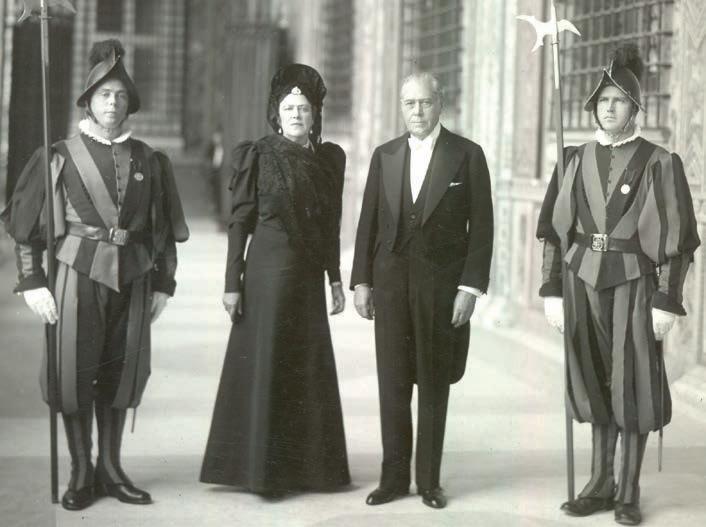
In April 1937, Taylor was given the unique honor of addressing the Gridiron Club in Washington, D.C. (by tradition, only the president of the United States and the leader of the opposition party were/are asked to speak). On the intersecting values of humility and civility, in an excerpt from the book, Taylor said: “Through the years
of my own experience, I have achieved the greatest results, small though they be and have attained the greatest happiness and great it has been, from considering the point of view of others and from fairly reconciling my own with theirs. Rarely have I found a man who had not some, and often many, good reasons for his own point of view, even though in the beginning to me it appeared wrong. For the permanent peaceful solution of all great problems, there must be a meeting of minds and an honest attempt to try to understand the objectives of the other side. Only by this frank method of approach can our problems be solved on a national scale, free of class distinction.”
A leading national columnist wrote of Taylor’s remarks how impressed he was “with the spirit of it, its tolerance,
A Deep Dive into Primary Sources
Stewart took on the task of completing Taylor’s biography for his former Cornell law professor, W. David Curtis Jr., who began writing it in the 1990s. (Myron Taylor was an alumnus of Cornell Law School, Class of 1894.) When Curtis became ill, he asked Stewart to bring the project to fruition. Stewart’s work required meticulous sleuthing to find more about “the man that nobody knew.” His search for primary sources led him to archival papers stored at Cornell; the Franklin D. Roosevelt Presidential Library and Museum in Hyde Park, N.Y.; the Library of Congress in Washington, D.C.; the National Archives and Records Administration in College Park, Md.; and the Harry S. Truman Presidential Library and Museum in Independence, Mo. Valuable
and its emphasis upon understanding the points of view of the men and groups with whom a man finds himself in controversy.”
“These values,” Stewart wrote, “also underscored Taylor’s leadership, not only in saving U.S. Steel during the depths of the Depression (when the company was operating at 17 percent capacity), but in also refusing to fire thousands upon thousands of underutilized U.S. Steel employees; in addition, he agreed to have U.S. Steel be the first major industrial company in America to reach an accord with organized labor (as all America gasped). Although many captains of industry blasted Taylor as a traitor, in J.P. Morgan’s view ‘[Myron’s] was the finest performance I have ever known.’”
content on Taylor’s life was also found in the Baker Library at Harvard University and the Oral History Project at Columbia University, as well as Vatican archival materials covering World War II.
“Doing archival research is somewhat similar to doing an archeological dig,” Stewart commented. “Oftentimes, I would find some memorandum in one location, but no response to it. Only by going to a different archive did I find the response.”
“Myron Taylor:
Knew” (Twelve Tables Press) is available on Amazon and Kindle and in hardcover.
Spring 2023 43
The Man Nobody
C. Evan Stewart is a senior partner with Cohen & Gresser LLP in New York City. He is also a visiting professor at Cornell University and an adjunct professor at Fordham Law School.
Myron and Anabel Taylor with Swiss Guards after a Papal Audience
Manners Maketh Martlets
Sage Advice from Across the Pond
Dr. Eve Poole ’90
Writing this as a Brit, I imagine many of you may associate civility with being posh. All those manners you see in costume dramas, and all that bowing and curtsying. So I am the perfect person to brief you on the subject, having attended the Lucie Clayton Finishing School in Kensington in the 1990s and having the rare distinction of sustaining a curtsying injury during a private audience with the Princess Royal (Princess Margaret) when I was the chair of Gordonstoun School, the Scottish boarding school that educated King Charles. I even go to the Royal Ascot and am about to go to the Palace to collect my OBE (Officer of the Most Excellent Order of the British Empire) for services to Education and Gender Equality. So, when — bizarrely — in the interview process for the Gordonstoun role, the nominations committee asked me if I could “Do Grand.” I was able — rather confidently and with the right amount of chin raised — to assure them that I most assuredly do “Do Grand.” Because the thing that people don’t tell you while they are hooting with laughter about dress codes and what to do with all that cutlery is that in life, this kind of thing matters far more than we would ever generally admit.
In my own career, I have often won jobs by being the candidate who could both ace the interview and shake hands, maintain good eye contact and make excellent small talk — all hallmarks of civility that are actually nothing to do with being “posh,” because they are actually all about kindness. I think we are so used to imagining that we are the only impostor in the room that we forget that for many people, maintaining their game face in any new situation with new people is a real challenge. Even interviewing can feel harder than being interviewed if you are trying to impress your own panel and make the perfect hire while not making a rookie mistake that could
Debrett’s, a British professional coaching company and publisher and authority on etiquette and behavior, advises anyone who meets a royal to: Put your right foot behind your left foot. Briefly bend the knees with one foot forward keeping the upper body straight.
open you up to challenges about bias. But if you have trained up your ‘Spidey Sense’ to be on red alert for anyone who is feeling uncomfortable or unhappy, it does not matter where you are. Your manners automatically kick in to save the day, and everyone relaxes again.
Civility is really kindness, because manners and etiquette, at heart, are no more than rules designed to put others at ease. The famous handshake was designed to demonstrate that your sword arm was not engaged and walking on the edge of the pavement was to make sure you got splashed by the traffic and not your companion. In Britain, we don’t talk incessantly about the weather because we actually care about it: It’s societal code for “I see you and I mean you no harm” when you encounter a stranger at the
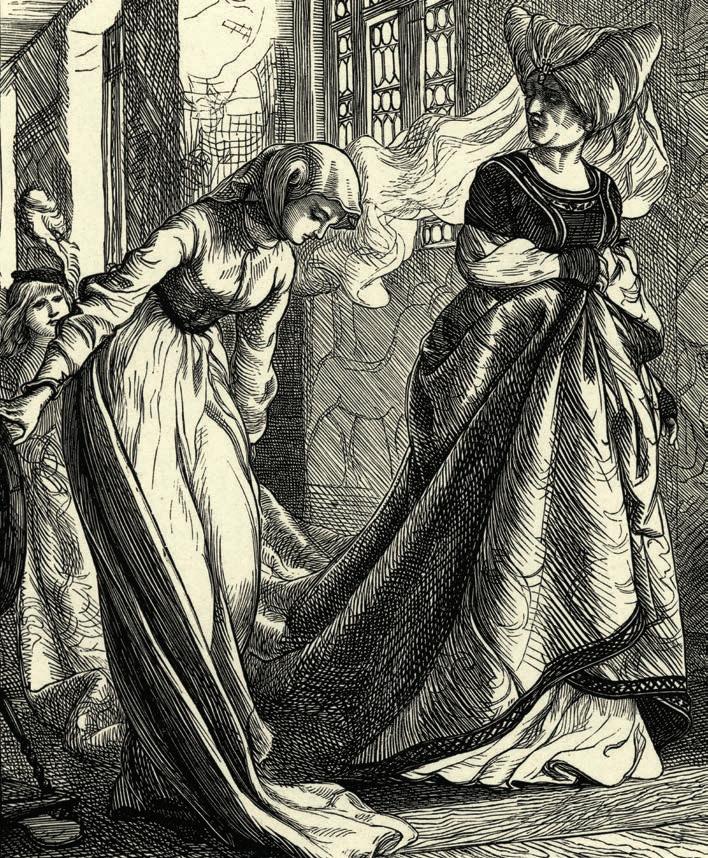
bus stop and can be a way of papering over awkwardness in conversation while everyone regains their equilibrium. It is good manners to be charming, because it makes everyone around you feel better. That is why it was perfectly proper for the Queen to hug Michelle Obama back, despite protocol, because kindness as the superordinate goal trumps any other formal rule of etiquette.
I imagine it is this deep training in civility that lies behind the huge global affection the world had for the Queen. Because civility is also a killer strategy: In business they now call it having high emotional intelligence, but really it is just all those good and true Westminster values about looking out for other people, being of service to them and behaving well. And the great thing about civility is that
Westminster Bulletin 44
Alumni Voices
it is like a muscle. If you acquire habits of kindness, they never desert you, even when you are hard-pressed and under pressure. So, at the same time as you are strengthening your other muscles through athletics, the Westminster community is a great place for the daily practice of the virtue of civility. Do you have that very common habit of greeting everyone you meet with a cheery “howyadoin” without waiting for the answer? Could you do it with eye contact next time, and a pause in case the person wants to tell you? Next time there is tension in a group, can you defuse it with an act of kindness? And when next you feel you want to lash out at someone, could you instead ask them how they are feeling?
In the development of character, practice really does make perfect. If you want the big guns on this, (courtesy of excellent teaching by Mr. Eckerson) here is Aristotle in “Nichomachean Ethics”: “We become just by doing what is just, temperate by doing what is temperate, and brave by doing brave deeds.” And the science of neurobiology bears this out.
Changes in our behavior literally remap our brains: The more you make and remake those synaptical connections, the stronger they become, and the faster your choices become habits. If you want a third reason to keep trying, here is a selfish one: Altruism triggers positive body chemistry, because it has been such a successful strategy in evolution that it is now hardwired for reward. So being lovely to others will quite literally make you feel better and improve your mood.
Civility is a key life skill that is about kindness and not about being posh. But of course, if you ever do need coaching on that tricky exit handshake-curtsydouble, without pulling your knee on the way back up because you were trying to impress by wearing unfeasibly high heels, I’m definitely your woman.
Eve Poole Percival is a British writer. She was interim Chief Executive of the Royal Society of Edinburgh (2022), Third Church Estates Commissioner (20182021), and Chairman of Gordonstoun (2015-2021).
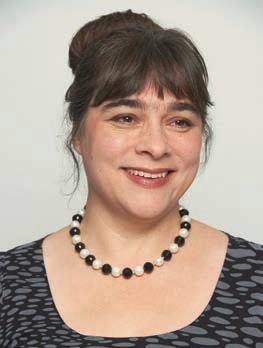
After Decades of Writing about Good Manners and International Protocol, Jay Remer ’69 Pens a Book on Civility
“The power is within all of us to open our minds and behave rationally. We can all be kind,” said longtime etiquette columnist for the New Brunswick TelegraphJournal Jay Remer ’69. Known as Canada’s Etiquette Guy, Remer has written almost exclusively on the importance of good manners and has produced how-to videos on a range of topics, including dressing appropriately for a funeral and tips for eating potentially messy dishes such as spaghetti. More recently, however, he has been consumed with bringing civility back into our increasingly chaotic world, which culminated in his recently published book, “The Six Pillars of Civility.”
The book is a curated collection of essays chosen from the more than 650 pieces that Remer penned for the Telegraph-Journal over the last two decades. “I had all of these essays — I thought writing the book would be easy, a slam dunk,” he recalled. The process proved more challenging than he anticipated.
While the subjects of his columns ranged from graciously managing holidays, dining and special events, he chose essays that related to the overarching theme of civility and touched on serious topics such as bullying and responding to incompetence or poor behavior — all with an emphasis on how the way we treat ourselves and others creates a more civil society.
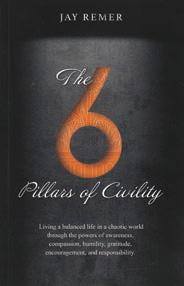
“The inspiration for each essay came from a situation that caught my attention, usually in a negative way,” said Remer, citing the tragedy and isolation of the COVID-19 pandemic and growing political unrest. “As stress went up, and people were more overtly behaving badly, my columns became more fundamental, encouraging readers to consider: ‘What can I do to make my life and the lives of others around me less stressful?’”
Writing the book was an act of humility for Remer himself. Though he has served as president of the Professional Writers Association of Canada, he grew up a self-professed slow reader. As a student, he says, he was a careful listener, allowing him to get through classes without reading — which made writing a challenge.
“I’ve gotten a lot better,” said Remer. “The process of creating this book
Spring 2023 45
“Civility is really kindness, because manners and etiquette, at heart, are no more than rules designed to put others at ease.”
– Dr. Eve Poole
translated to real-world homework.”
After some minor initial copy revisions, Remer sent his draft to a line editor, who recommended extensive changes. Remer finally read his own material word by word and returned more than 400 changes to his editor.
Homework is a central theme of the six pillars. Each chapter of the book focuses on one of the pillars and concludes with a series of exercises that asks readers to contemplate questions about their own tendencies and behavior. “Many people are not committed to making changes in their lives. This book is not for them,” said Remer. ”This book is for those who understand the need for the daily practice of self-reflection, and that is a rare club.”
His work illustrates an etiquette evolution. “Etiquette originally leaned in a top down direction, protecting a controlled social system,” explained Remer. His early work reflected those social conventions. Remer now focuses on encouraging interactions that normalize justice, equality and inclusion.
He stressed the need to be engaged in our communities, to become aware of those in need and to offer assistance. “Being of service,” he wrote,“teaches us all six pillars of civility. We learn to have compassion for others and ourselves. We practice humility and are aware of how we affect others and how they affect us. We become responsible citizens, helping to turn those in need in our communities into pillars of strength; gratitude becomes a driving force.”
Jay Remer’s Six Pillars of Civility
He extended his expertise to Westminster recently, when he participated in a civic engagement conversation with civics teacher Todd Eckerson, presented as part of Westminster’s Seventh Form, a series of virtual events for alumni who have celebrated their 50th reunion. “Civics and civility are so closely related. I feel so positive about Westminster and the fact that Todd, and Head of School Elaine White and Mental Health Director Amy Raskind, recognize the importance of
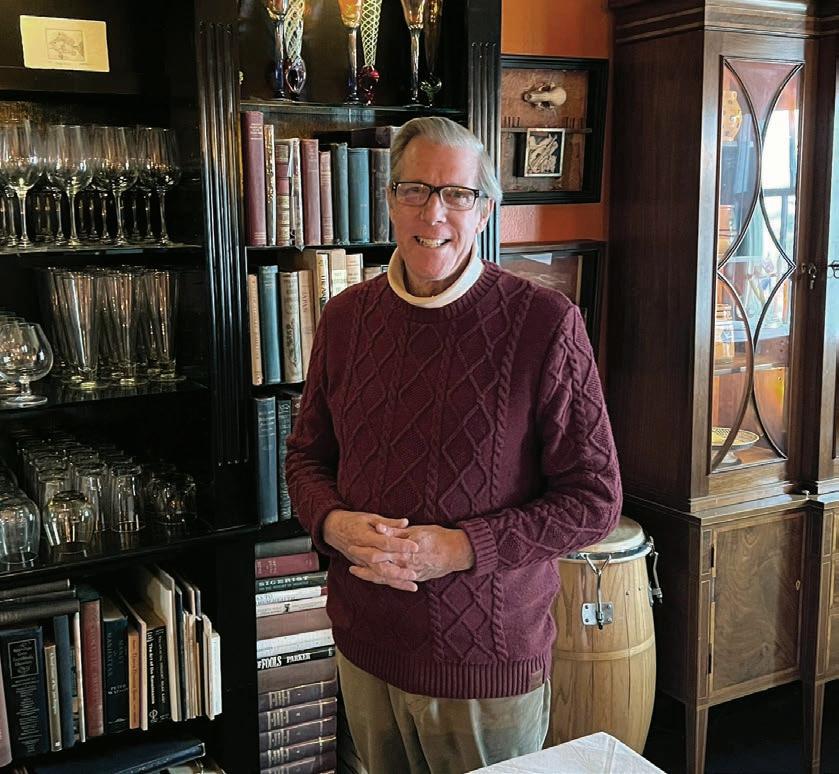
mental health and how it relates to civility and leadership and thinking critically. It is so important to see it in action,” he said.
Remer hopes that he can give people some takeaways from his book about what they can do to make their lives and the lives of those around them less stressful. “Over the last few years, people have been living in chaos and fear. It is not a healthy dynamic,” he said. “We need to relieve the fear and stress and be nice! If we don’t understand why people behave poorly, we can’t get out of the gate.”
Awareness: Being mindful of the people and things around us, primarily our effect on one another. If we are to build healthy lives and sustain vibrant communities, we must open our eyes.
Compassion: Having compassion for others and for ourselves allows us to handle our daily challenges and help others with theirs.
Humility: Humility and empathy remind us on every level that we are all equals.
Gratitude: Gratitude is important and plays a vital role in civil society. If we become numb to gratitude, a domino effect occurs and civility unravels, and with that we lose awareness, compassion and humility.
Encouragement: There is no better way to build a healthy and successful personal relationship or maintain a vibrant community or workplace than by encouraging each other.
Responsibility: Taking full responsibility for our words and actions is critical. When we all shirk our responsibilities, chaos ensues.
Westminster Bulletin 46
Alumni Voices
Every Martlet Can Make a Mark


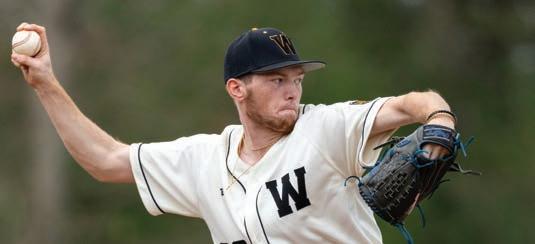
Make your mark on Westminster and support the present and future generations of Martlets who make their marks –at Westminster and on our world. You may direct your gift to any of these priorities. Visit

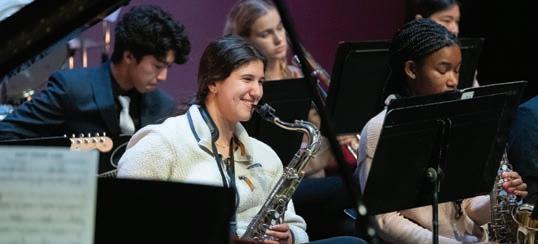
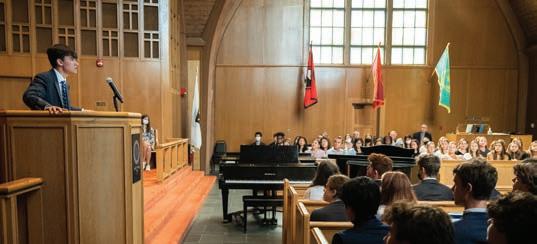
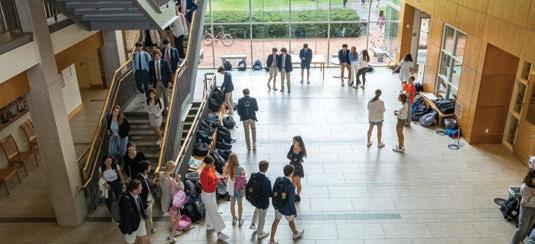
STUDENT
THE WESTMINSTER FUND
LIFE
THE ARTS FINANCIAL AID ATHLETICS FACULTY
gift.westminster-school.org or
Spring 2023 47
scan the QR code to make your gift online. The Westminster Fund closes on June 30.
The Harmonaires’ Voices Live on, Thanks to Two Rare Recordings
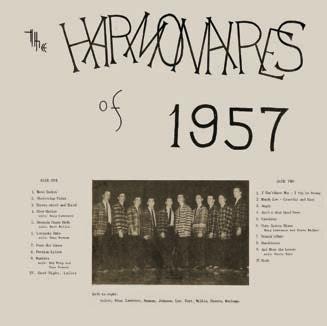
Vocal groups have been a part of Westminster since the school first opened its doors in 1888. Over the years, the names and types of groups have changed, but in the late 50s and early 60s, the Harmonaires reigned supreme. They performed at school functions and town events sporting their signature madras suit jackets and narrow black ties.
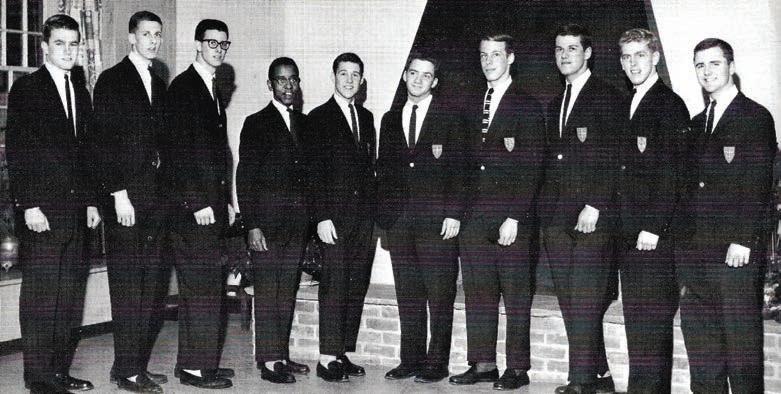
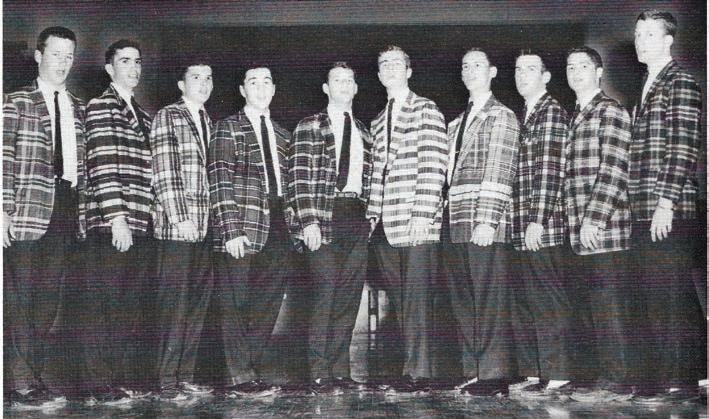
The group started in 1956 as an offshoot of the Glee Club. Former music director Larry Gilman arrived in 1957 and continued the tradition and built on it; his wife, former organist Ann Gilman, is often listed as the director of the group. Before the Harmonaires were the Octet and the Double Quartet. Always, it seems, there was the Glee Club, according to school archivist Scott Reeves.
The Harmonaires, however, were possibly the first and only vocal group in the school’s history to cut their own albums, one in 1957 and another in 1961. They sang favorites like “Mood Indigo” and “Good Night, Ladies.” Soloists crooned “Kentucky Babe” and “Bermuda Buggy Ride,” among others.

“I loved singing and that was a way to fulfill your Chapel requirement. I guess we thought we were pretty good,” says John Farr ’57, who sang tenor with the group for two years.
“There was a recording studio in Hartford. We went in there and if I remember correctly, we cut two records because our first attempt was before we were warmed up and we were pretty sour,” he quips.
Farr went on to sing in the choir when he was a student at Williams College, where he started his own vocal group. Recalls Farr: “We were known as the Farr Cries…we only lasted a very short time!”
To listen to The Harmonaires albums from 1957 and 1961, scan the QR codes below.


Westminster Bulletin 48 From the Archives
Left to right: Henry Hall, Bob Patrick, Pat Ellis, Jack Harvey, John Pomeroy, Peter Dilks, Mal Douglas, Turk Rose and Sam Gawthrop
Left to right: Steven Walker, Robert Wing, Douglas Lawrence, Anthony Newman, Richard Johnson, Walter Lee, James Farr, Everett Willis, Gordon Barnes and Peter Kellogg
Grit, Grace and Gratitude
Rennie Wilson Washburn ’82 remembers Bruce Burdett describing the forestry program: “In the fall, we cut. In the spring, we plant.” Forestry was an alternative to sports for the afternoon program, and the group operated chainsaws and drove an El Camino around campus; she loved it. Rennie also appreciated cleaning classrooms and distributing athletic uniforms to her teammates through the work program. These experiences instilled in her a sense of responsibility, hard work and grit.
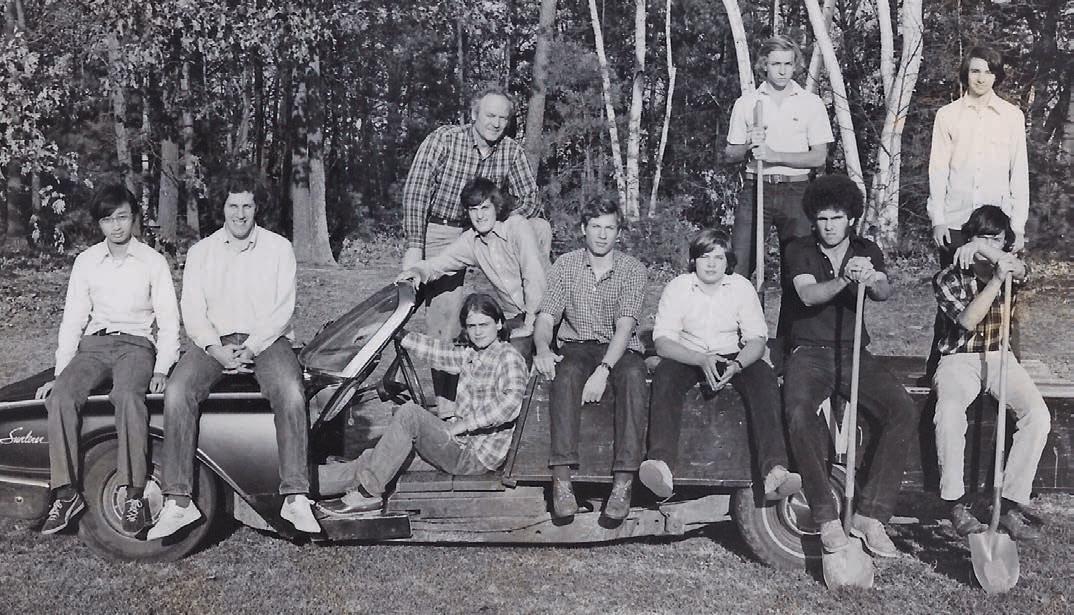
Faculty members such as Bruce and Peg Burdett P’70, ’83, Dick Hopley P’80, GP’02, Emmy Leavitt, Ann Gilman P’78, ’80, Gordon McKinley P’75 and others supported Rennie’s interests and encouraged her to try new things. She took full advantage of their advice. She played field hockey, danced, sang in the choir, performed with Dramat and participated in a number of clubs. The generosity of spirit across campus not only created a close and supportive community but also taught Rennie grace.
Rennie’s gratitude for her Westminster experience inspired her to join the Thring Society. “I want young people to have great opportunities and receive a solid education at Westminster,” she said. “The best way to support financial aid is to build the endowment. You don’t have to be incredibly wealthy to do this; most people have a retirement plan. My IRA is also the most tax-efficient way to leave something to the school.”
Rennie added Westminster as a beneficiary on her IRA
manager’s website, which took just a few minutes. Westminster welcomed her to the Thring Society when she shared the news. The Thring Society honors everyone who includes Westminster in their estate plans at any gift level.
If you feel gratitude for your Westminster experience, please consider joining Rennie in the Thring Society. Including Westminster in your plans is easier than ever. Here are three simple ways:
· Make Westminster a beneficiary of your 401(k) or IRA.
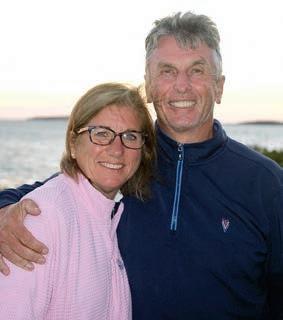
· Include Westminster in your will or trust. Make Westminster a beneficiary of a donor-advised fund.
If you would like to learn more about the Thring Society, contact Jennifer Keyo at (860) 408-3039 or jkeyo@westminster-school.org.
Spring 2023 49 Supporting Westminster
Edge Society Dinner
The Edge Society recognizes our most generous donors whose leadership gifts help to advance the school’s mission and core values and make possible the dynamic, diverse, and close-knit community that defines the Westminster experience.
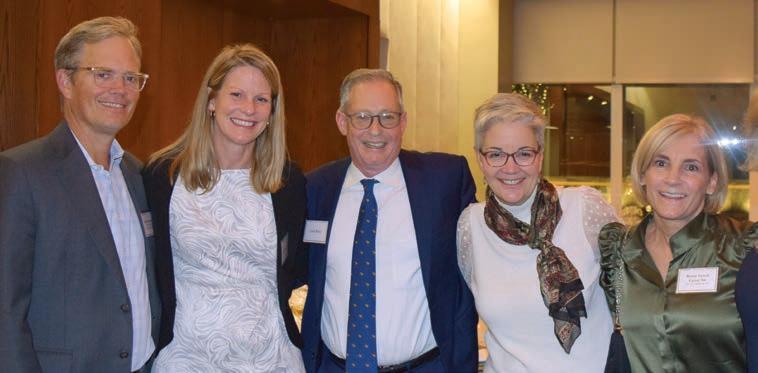
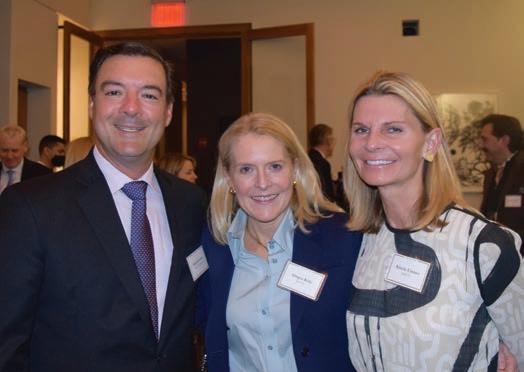
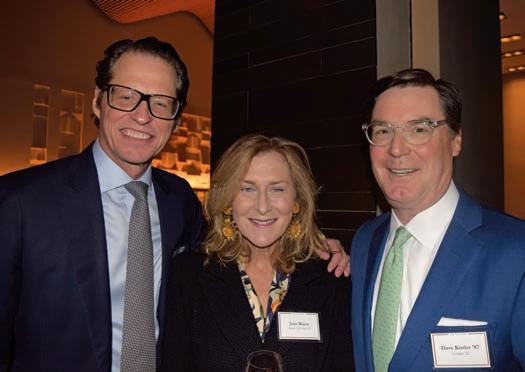

Jan. 18, 2023, New York, NY

Westminster Bulletin 50 Supporting
Westminster
John ’65 and Gaily Beinecke, Chris Beck P’08, ’13, Ted Dardani P’14, ’18, Melinda Shumway
Ben and Julie Wurts P’22, ’24, Dave Kistler ’87, P’22
Reha Kocatas P’25, ’26, Allegra Kelly P’22, Kristin Ursano P’23
Mark Hull P’26, Mary Peck ’90, Leslie Hull P’26
Brad Raymond ’85, P’19, ’20, ’24, ’24, Sara Whiteley ’91, Chris and Elaine White, Renée Lynch Carrel ’84, P’19, ’21
Alumni and parents gathered at Aquavit.
Boston
Gathering November 15, 2022
Alumni and parents gathered at Trillium Brewing.


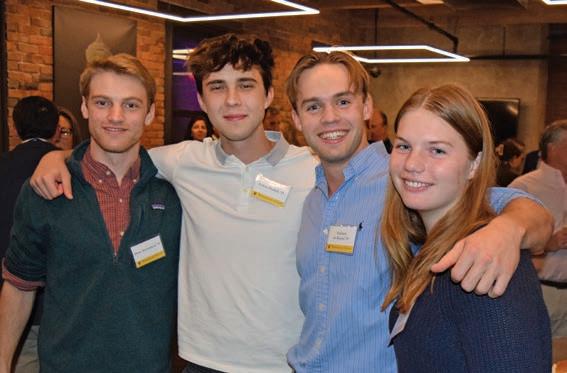
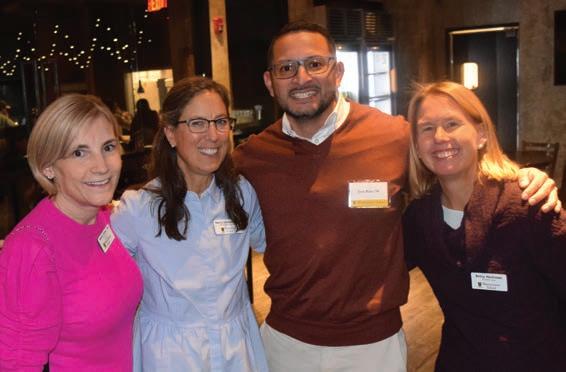
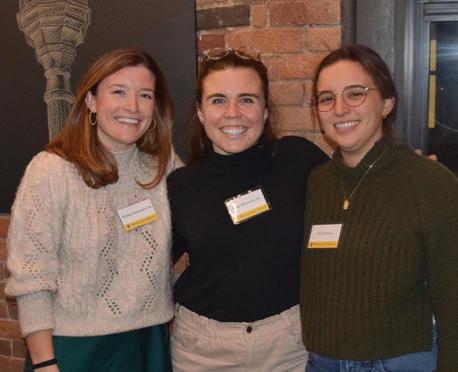
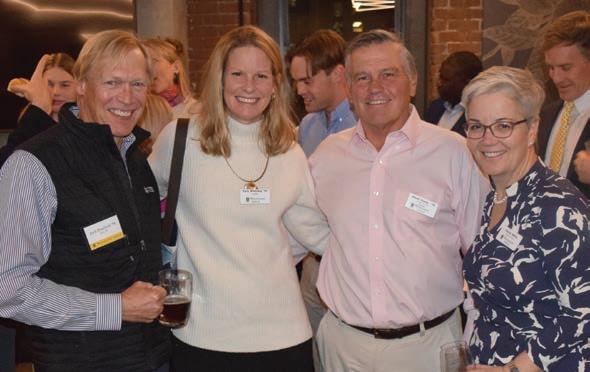
Spring 2023 51
Jock Danforth ’78 P’09, Sara Whiteley ’91, Dave Hovey ’78, P’09, ’11, ’14, Elaine White
Renée Lynch Carrel ’84, P’19, ’21, Nancy Urner-Berry ’81, P’11, ’16, Jose Ruiz ’94, Betsy Heckman
Thiele Schroeder ’14, Ellie Deveaux ’14, Kat Gaburo
Katie Hovey ’14, Tommy Hovey ’11, Leigh Hovey P’09, ’11, ’14
Drew Brownback ’19, Lukas Dudzik ’19, Emmett de Kanter ’19, Samantha de Kanter ’22 Tyler ’93 and Sandy Hill P’25, Miles Bailey ’94
New York City Reception December 5, 2022
Alumni and parents gathered at the New York Yacht Club.

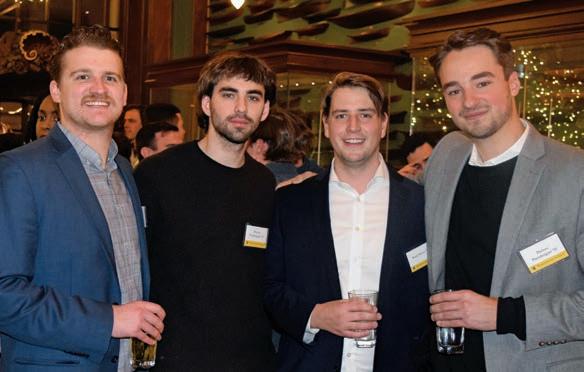
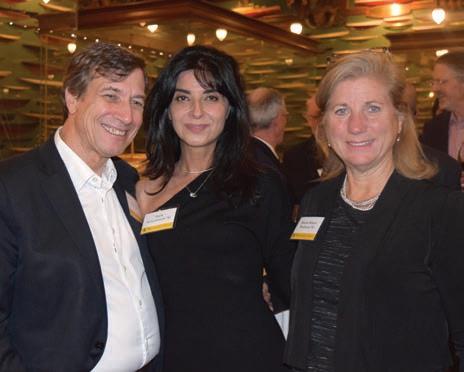
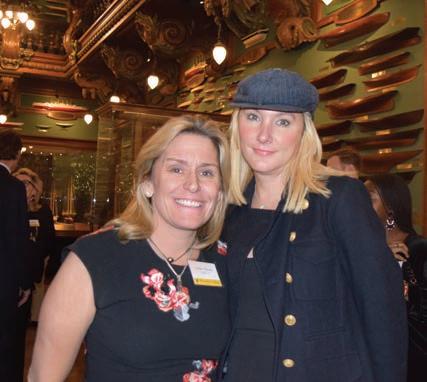

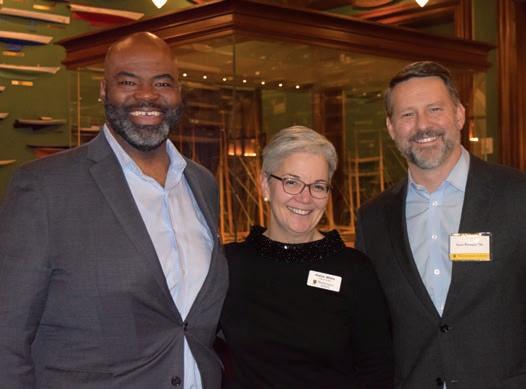
Westminster Bulletin 52
Supporting Westminster
Derrick Logan ’93, Elaine White, Sam Powers ’94
Chris White, Thao Do and Robert Seber P’26
Dale Lange, Shadi Mirfendereski ’82, Rennie Wilson Washburn ’82
Ashley Norton P’25, Alison Harmelin P’25
Mike McNally ’14, Payton Prendergast ’17, Mark Pfister ’14, Dalton Prendergast ’15
Kristen O’Rourke, Jordan Gabbidon ’17, Ellen Gyasi ’16, Remy Mason ’16
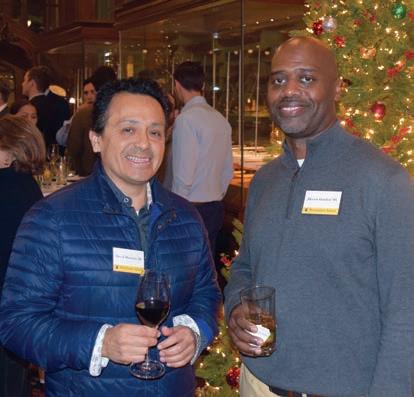
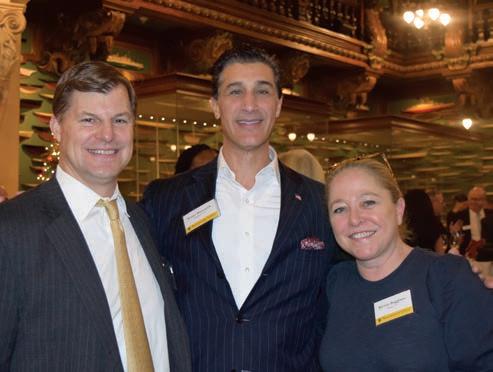
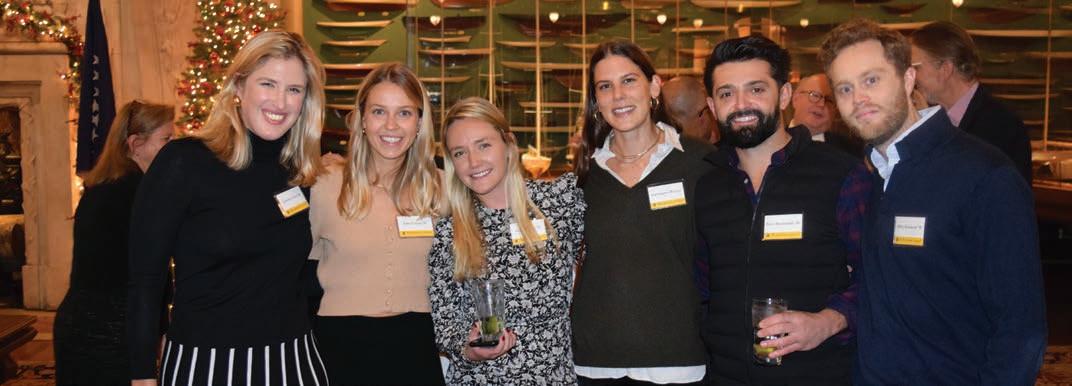


Spring 2023 53
Alex Norton P’25, Samer Hamadeh P’25, Kristin Boggiano P’25
Cameron Scott ’06, Julia Cooper ’15, Ginny Durfee ’15, Anmargaret Warner, Peter Michailidis ’10, Miller Robinson ’10
David Morocho ’86, Hector Gordon ’89
Jonathan Leathers ’05, Ned Reeves ’05, Brian Kwak ’06
Bill Brewer P’17, ’21, Chris Beck P’08, ’13, Melinda Shumway, Powell Holly ’82
Boston, MA Pop-Up October 11, 2022
Nashville, TN Pop-Up October 17, 2022
Our Pop-Up Gatherings
As Admissions and Advancement colleagues travel to meet with current and future Martlets, alumni and parents local to those regions have joined them for informal gatherings.
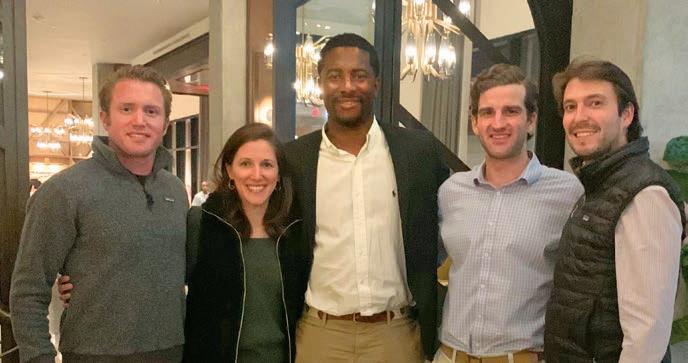
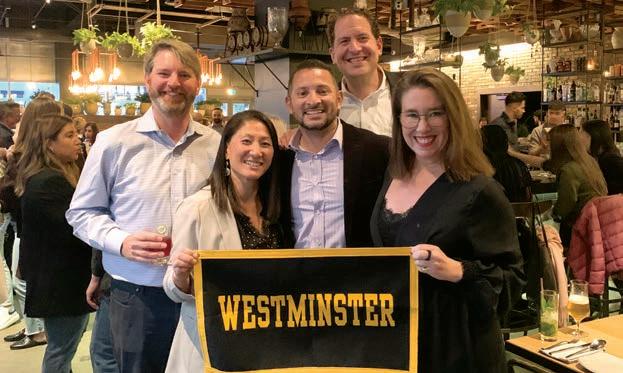
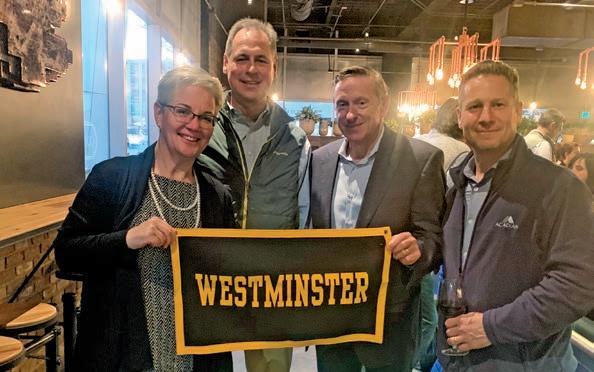
In addition to more formal and traditional receptions, this year the Advancement and Admissions Offices partnered up to host Pop-Ups in locations with current and future Martlets.
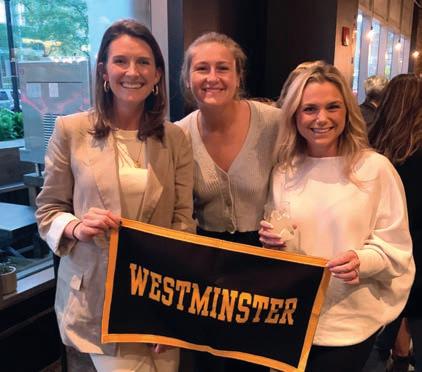
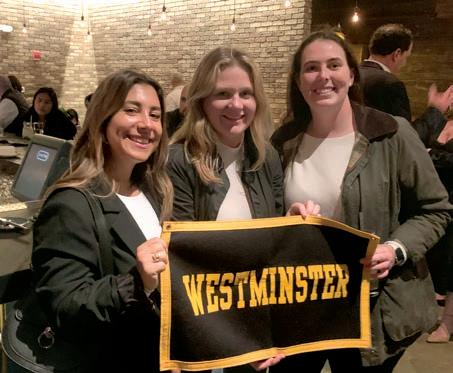
Westminster Bulletin 54 Supporting Westminster
Elaine White, Jamie Peterson ’89, Frankie O’Brien ’81, James Klapman P’26
Madeline Bologa ’17, Maddy Paro ’17, Cynnie White ’17
Emily Worcester Pope ’11, Margot Frank ’15, Olivia Frank Mills ’11
Michael Wiernasz ’94, Suzanne Daglio Armstrong ’94, Jose Ruiz ’94, Miles Bailey ’94, Martha Payne ’94
Ryan Higgins ’06, Robyn Nentwig Maxwell ’06, David Pringle ’05, Ben Ross ’10, Cris Gomez ’10
Los Angeles, CA Pop-Up October 26, 2022
Lexington, KY Pop-Up November 10, 2022

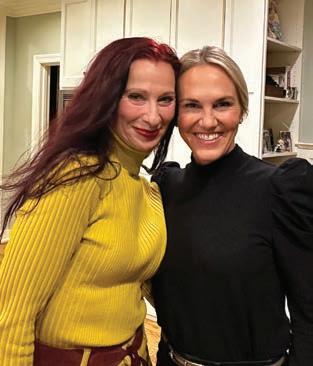

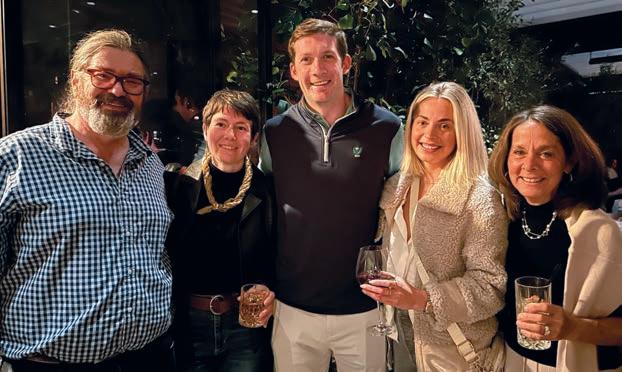

Coral Gables, FL Pop-Up March 13, 2023
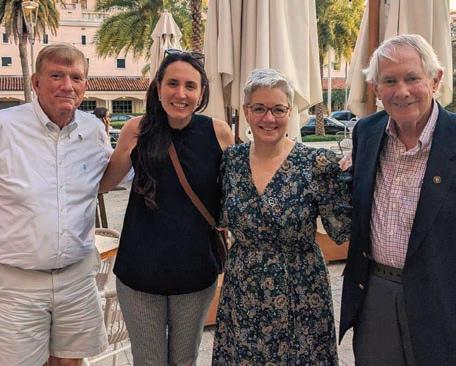
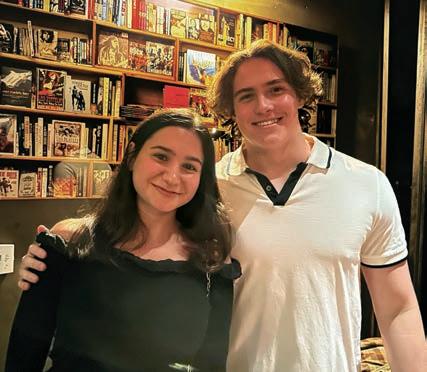
Spring 2023 55
Jason Manasse ’93, Matt Schwarz ’93, Liz Doenges Winkler ’93, John Ryan ’93
David Pope P’12, ’15, ’16, Ann Ulrich ’09
, Kevin O’Leary ’16, Mimi Connelly ’15, Jayne Connelly P’15
Aleyna Baki ’21, John Clofine ’22
Eric and Tina Johnson P’21, ’22, Peter Haight ’55
Marie-Noelle Serafini Siegel ’80, Juli Neuman P’25
Muffy Lyster P’97, ’99, Gray Lyster ’99
Bill Johnston ’60, Mercedes Fernandez-Edge ’01, Elaine White, Peter Palin ’57
The Flock is Gathering!
On Williams Hill, you created friendships within your class and with Martlets in other class years — teammates, prefects, club members and in residence halls.
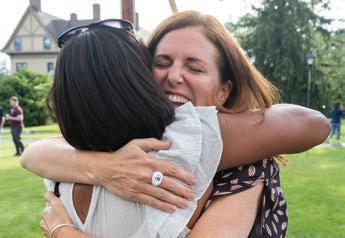
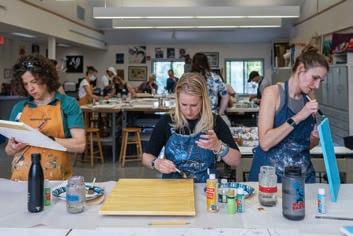
Those relationships may have been some of the most memorable and enduring of your time at Westminster. The incredible energy and sense of togetherness during the Mega Reunion last June inspired us to create “Flock Reunions” which will allow more Marlets from different classes to gather and reconnect on Williams Hill!
Upcoming Flock Reunions:
2024 Flock Reunion: June 7–9 Classes ending in 3, 4, 5, 8, 9 & 0
2027 Flock Reunion Classes ending in 1, 2, 3, 6, 7 & 8
2030 Flock Reunion Classes ending in 4, 5, 6, 9, 0 & 1
Visit www.westminsterreunion.org for scan the QR code for additional information. Please contact Thea Leach, Director of Advancement Programs and Events, at tleach@westminster-school.org or 860-408-3724 with any questions.
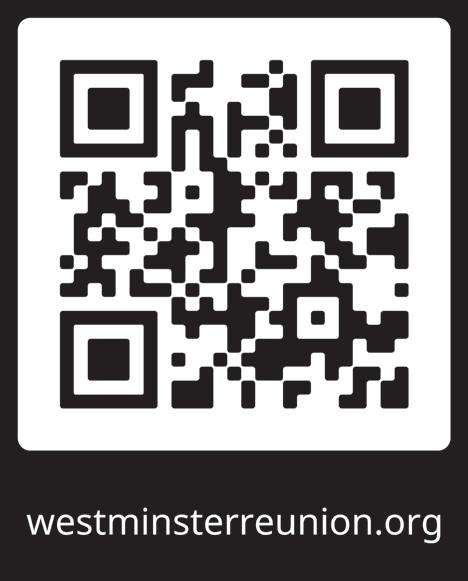
We can’t wait to see you on the Hill!
Save the date for the first Flock Reunion scheduled for June 7–9, 2024 with a celebration of classes ending in 3, 4, 5, 8, 9 & 0.
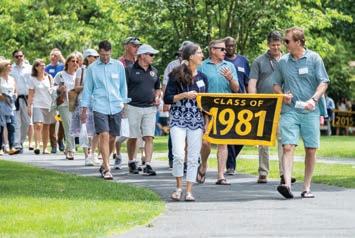
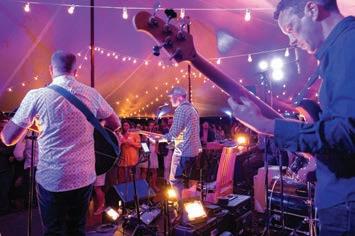
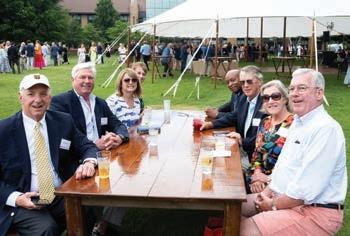
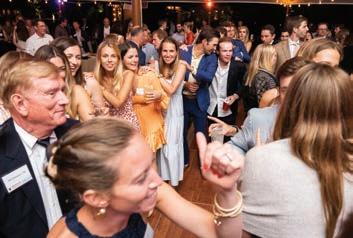
Westminster Bulletin 56
FLOCK REUNION WESTMINSTER June 7–9 2024
Class Notes
Send alumni news and class notes via email to classnotes@westminster-school.org
Send updates to contact information to spierson@westminster-school.org
1958
Michael Shapiro published a new book, “Aesthetics of Equality” (Oxford University Press). The book is primarily a work of political theory and a guide to aesthetic methods. It focuses on how one can conceive equality issues critically through conceptual engagements with diverse artistic genres: literature, film, music, photography and architecture.
1961
Tom Turton ’61 (right) and his wife, Cathy, celebrated their 60th wedding anniversary and Tom’s 80th birthday with their children Jonathan ’82, Gregory ’83, Daniel ’85 and Joshua ’88 and grandchildren, including Shaw ’25.

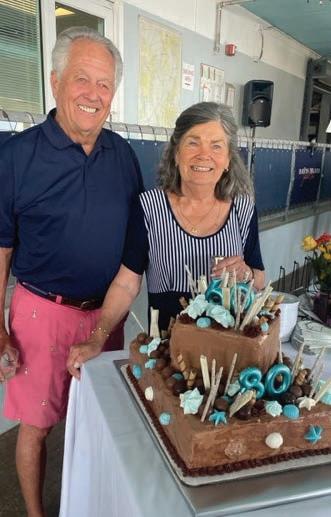

1971
Above, from left to right, classmates Chris Beale, Harold Hoegberg, and Doug Dobbin gathered at Harold’s house last winter to watch the World Cup.
1966/1967/1968/ 1970/1971
The Seventh Form holds both virtual and in-person programs and gatherings throughout the year.
Standing: Hunter Smith ’68, Jeff Cook ’66, Bruce Burdett ’70, Peter Briggs ’71, P’01, ’05, ’07, Seated: Dick Stewart ’66, Bob Hawes ’66 and Jim Ladd ’67
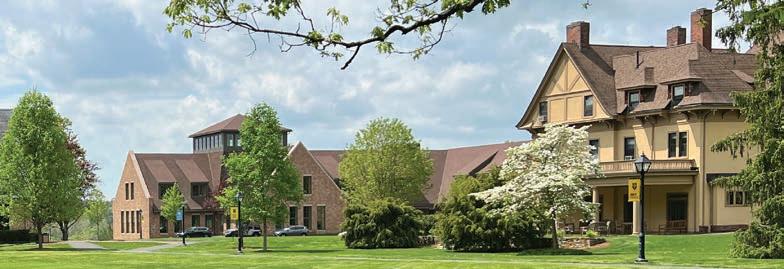
Spring 2023 57
1970/1974/1976/1978
A Westminster crew gathered on the slopes at Wasatch Peaks in Utah for a day of skiing. From left to right: John Armour ’76 , faculty member Scott Stevens P’07, ’09, ’12, Tim Armour ’78, P’17, Piper Stevens ’70, Paul Armour ’74, P’17 and Dave Hatch ’76.
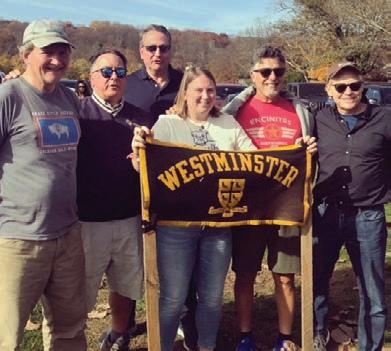
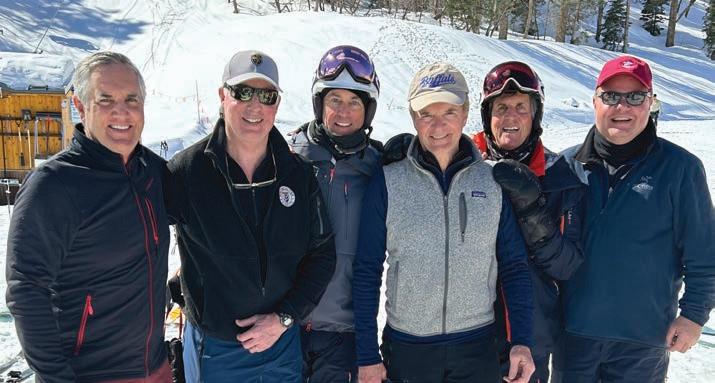
1986/1987
1973/2006
The Classes of 1973 and 2006 held a minireunion at the Yale Bowl in New Haven during a Yale vs. Brown game. From left to right: John McGrath ’73, Hilary Kumnick ’73, Frances McGrath ’06, John Kebabian ’73, Bentley Boger ’73 and Scott Coburn ’73
In February, Martlets traveled with Paul McLaughlin ’86 to Colorado, where Paul’s son Owen McLaughlin is a University of North Dakota Fighting Hawks hockey forward and Philadelphia Flyers prospect. The team played in two games against the University of Denver. Pictured left to right are: Dan Lynch ’86, Paul McLaughlin ’86, Larry Green ’86, Mark St. Amant ’86, Jeff Tindall ’87, Micky Terry ’86 and Mark McKay ’86.
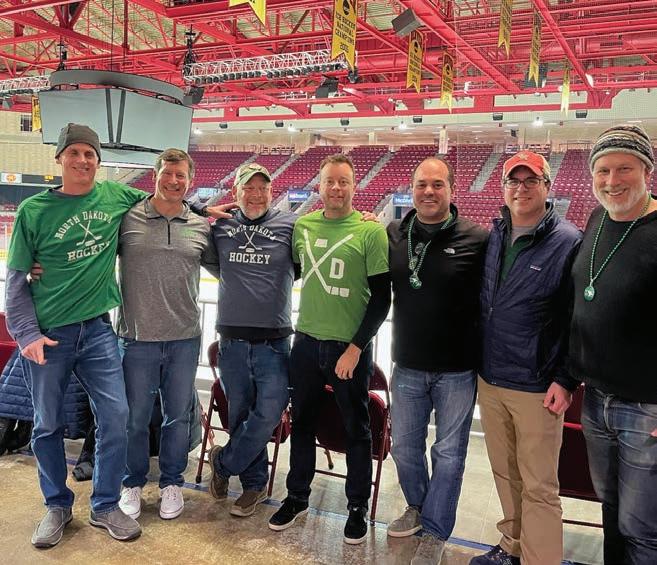
1988
Laing Foster Rikkers ’88 writes: “In 2019, my professional life and my personal life tragically collided when my younger sister, Ginna Foster Cannon ’91, died suddenly in atrial fibrillation, a consequence of untreated obstructive sleep apnea (OSA).
Since then, I’ve doubled down on my commitment to ProSomnus® Sleep Technologies, a company I co-founded in 2016 to treat OSA. We took the company public in 2022 (Nasdaq: OSA) and I joined full-time as executive chair. I have also published a book, “Morning Leaves: Reflections on Loss, Grief and Connection” that is filled with poetry and art, information about OSA, and how I moved through the loss. With an estimated one in five adults having OSA and 80-plus percent undiagnosed, there’s a lot of work to do. I’m committed to doing everything I can to make a dent in those numbers. The silver lining of losing Ginna is that I can educate and help others. Raising awareness about OSA is one of my most important goals for 2023 and I welcome ideas and suggestions on how to get the word out.” Pictured at right is Ginna with Laing’s son, Leander.
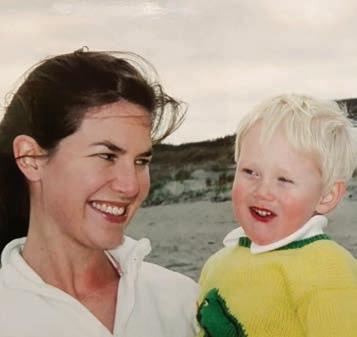
Westminster Bulletin 58 Class Notes
1994
Malcolm Auchincloss ’94 and his wife, Polly, welcomed their daughter, Lucinda “Lucy” Katherine Auchincloss, on April 20, 2022. Lucy is pictured here with her brother, Will, 3.
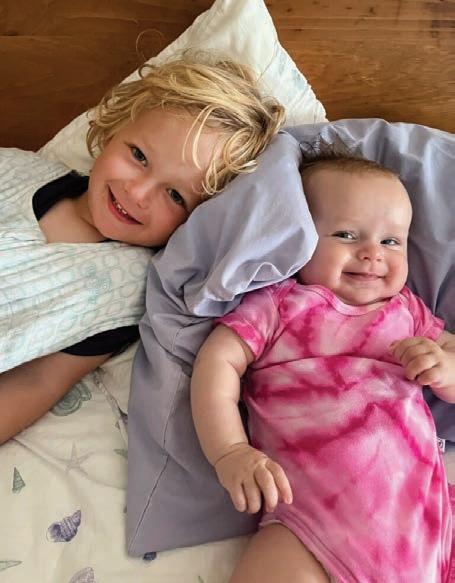
1990
Eve Poole Percival ’90 was awarded an OBE (Order of the British Empire) in King Charles’ first New Year’s Honors List. It is for services to Education and Gender Equality, in recognition of her leadership as Chairman of Gordonstoun School. She is pictured here beside her official portrait as the first female chair of governors.

1996
Rebecca Brooks ’96 and Dolph Clinton announced the birth of August Brooks Clinton, born Oct. 15, 2022.
2001
Janet Bowler Bates ’01, P’24 and her husband, Joshua Bates, welcomed their daughter, Isobel Margaret Bates, on July 22, 2022. Their son, Elijah (above), joined the Westminster community this year as a part of the class of 2024 and their daughter, Olivia, has already decided she will be a Martlet as well. Over the summer, Janet was recognized at the Charleston Metro Chamber of Commerce Honors Awards as “The One to Watch” for her work promoting diversity in the construction industry.
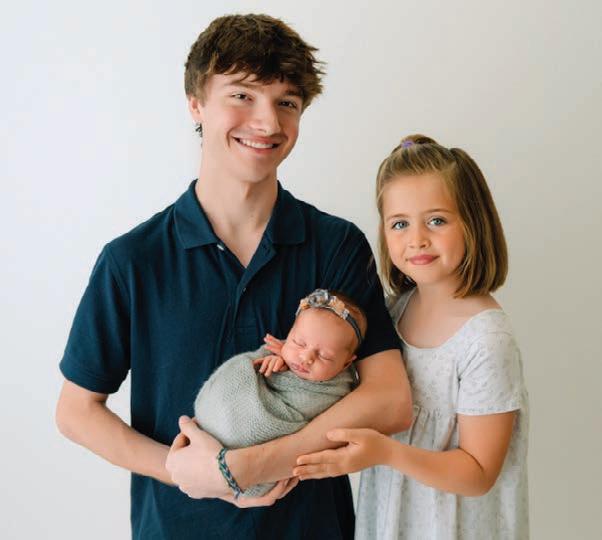
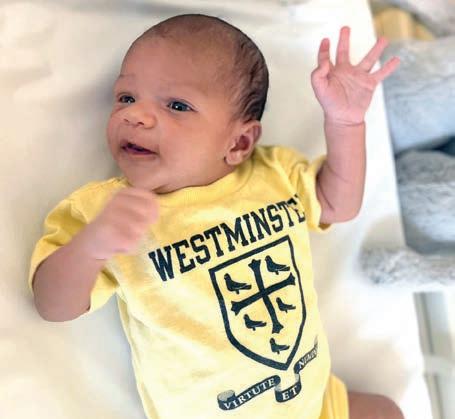
Spring 2023 59
2003
Kim Sullivan ’03 got engaged to attorney Carl Mazzone in September 2022. Kim is currently vice president of People & Culture at Fund That Flip, a real-estate focused fintech platform. Carl is assistant county prosecutor in the Major Trial Unit for Cuyahoga County. They both reside in Cleveland with Carl’s two children, Ben, 9, and Adrienne, 4. They plan to wed in the fall of 2023.
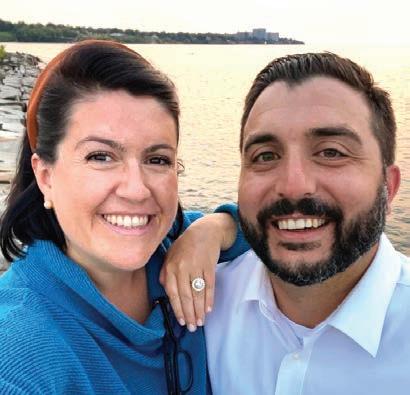
2005
Samantha Leland Walker was born October 10, 2022, to Andrea Seymour Walker ’05 and Colby Walker. Logan is enjoying being a big brother and Andrea says they are adjusting to being a family of four.

2010
Will Smith ’10 and Camila Keller got married on February 19, 2023, in Patagonia, Argentina. It was a truly magical celebration!
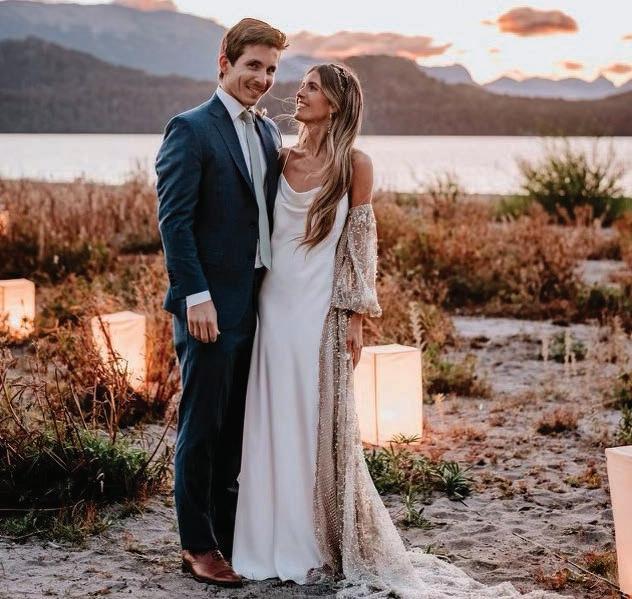
2011
Tyler Mink ’11 is proud to announce the birth of Townsend “Townes” Treadway Mink III, born on Nov. 25, 2022.
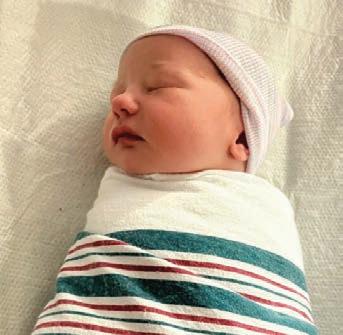
2020
Hobart College first-year forward Iggy Belov ’20 was a member of the Statesmen hockey team that captured the 2023 NCAA Division III Men’s Ice Hockey Championship with a 3-2 overtime victory against third-ranked Adrian College in the title game March 26. Belov scored in Hobart’s 5-1 quarterfinal victory over Curry College.
Hobart finished the season with a 292-0 record, shattering the program record for wins in a season. It is the college’s first national championship in hockey. Belov played in 28 games this season, producing 14 points on 11 goals and three assists.
Westminster Bulletin 60
Class Notes
OBITUARIES 1944
Kirk (Richard) Jewett passed away on Aug. 3, 2022. He was 96. Kirk was a 2014 Reunion Committee member and a Class Agent since 2000. After Westminster, he graduated from Yale University. He was predeceased by a brother, Freeborn Jewett Jr., Class of 1945.
1950
James (Jim) Pinchot Gaston died peacefully with family present in New York City on Nov. 13, 2022, at the age of 90. The son of Rosamond Pinchot and William A. Gaston, Jim was born on Dec. 14, 1931, in New York City. He attended Bronxville Academy, New Canaan Country School, Westminster School and Bowdoin College (’54), where he developed a passion for flying. A highlight was his solo flight across the Atlantic in 1962 in a Piper Super Cub. After McGill Medical School and training at Memorial Sloan Kettering Cancer Center, Jim served two tours at a civilian hospital in Nha Trang, Vietnam, during the TET Offensive. In addition to his private practice, he was an attending surgeon at Doctors Hospital and New York Hospital, where he pioneered breast cancer surgery as a distinct specialty. A man of many interests, he could be found managing his real estate, at his restaurant on the Upper East Side, biking around Central Park, or at his home on Hurricane Island, Maine. Jim is survived by his wife Gail, his children Pierre, Amanda, Jamey and Frances, his brother Tom, sister Gigi and many grandchildren, great-grandchildren, nieces and nephews. He was predeceased by his brother Bill and son Robin.
Tom Hunt ’50 submitted the following remembrance on the passing of his classmate:
“My memories of Jim begin in the early to mid-forties. We attended the same school and together with some other boys engaged in some ‘not very smart’ activities. We obviously survived and Jim, a very bright and gifted young man, went
on to Bowdoin, and then McGill Medical School.
He leased part of an island off the Maine coast and flew his own plane to a nearby airport to check on the construction of a house on the island, which he also leased to the Outward Bound group. Jim also flew to Simsbury to attend Westminster alumni gatherings. The last time I saw Jim was meeting his family at their NYC house and having lunch at his Hurricane Island Restaurant just around the corner of his house. Lobster was the featured offering. Jim’s patients were served well by his skills as an oncology surgeon. I am glad we shared a part of our life together.”
Charles Hiram Upson III passed away peacefully in Waterbury, Conn., where he was born on Dec. 9, 2022. He was 90 years old. He leaves an extended family, as well as legions of friends and colleagues to whom he brought joy, laughter, love, support and the highest example of living a life of goodness and purpose.
Born on Oct. 12, 1932, to Gertrude Whittemore Upson and Charles Hiram Upson Jr. of Middlebury, Conn., Hiram, as he was known, grew up on Tranquility Farm and Lake Quassapaug. His early passions for competitive sailing, skiing, golfing, education, conservation and the arts were shared by his sisters, Justine and Thyrza. He was cherished for his goodness, fine character, unconditional love for his family, constant congeniality, exemplary citizenship and love for his country.
Hiram attended Waterbury’s McTernan School, later the Chase Collegiate School, in Waterbury, and went on to attend Westminster School and Phillips Academy-Andover. From there he enrolled at Yale University, graduating with a degree in economics and serving as class agent. Hiram then served in the United States Air Force as a jet fighter pilot, and his call sign was “Malibu.” He successfully flew over Eastern Europe during the Cold War and when he had time off, he enjoyed ample skiing and hiking opportunities available in Germany’s terrain near the Alps.
After spending a year in Zermatt, Switzerland, Hiram entered the University
of Virginia School of Law in 1960. The very next summer, he met his future wife, Anne Clark Cullen, known as “Dancy” on Fishers Island. They married in 1962, welcomed two sons, Ty and Peter, and made their home in Greenwich, Conn.
Hiram chose a career path in the financial world, and his legal training was especially valuable for the work. Starting out at Brown Brothers Harriman, then working at both Donaldson, Lufkin and Jenrette and Fiduciary Trust, Hiram went on to become senior equity portfolio manager at General Motors in New York. Hiram retired from financial management and General Motors in 2000.
Upon retirement, Hiram returned to central Connecticut, where he met Martha Barhydt, who would become his partner. A perfect match, they embraced a partnership based on respect, friendship, a mutual delight with the outdoors and shared friends, a disposition for civic duty and the seamless overlapping of two large and loving clans.
Hiram focused his considerable talents and energy on philanthropic endeavors in his communities. The McTernan/Chase Collegiate School, Westminster School, Yale University, University of Virginia Law School, Phillips Academy-Andover and the WhitemanSteamboat Mountain School all benefited from Hiram’s generosity, expertise and consideration.
As a lifelong New England resident, Hiram honored his family’s history of civic responsibility. Hiram was a strong supporter of conservation initiatives, generously supporting the Friends of White Deer Rock, the Fishers Island Conservancy and the Connecticut Community Foundation, as well as many other organizations with missions to preserve nature and open space. Most recently, in his role as a senior board member for Waterbury’s Mattatuck Museum, Hiram was instrumental in realizing a capital campaign goal that resulted in transforming the Mattatuck and in the dedication of a gallery in his name.
Hiram leaves behind his sons, Charles Hiram Upson IV (Ty) of Steamboat Springs, Co. and Peter Scott Upson (Sarah Tuttle) of Redding, Conn.; his partner,
Spring 2023 61 In Memoriam
Martha Barhydt of Watertown, Conn.; five grandchildren — Zinnia Anne, Kain Tuttle, Atticus Hiram and Thyrza Wesley Upson and Hayden Whittemore Upson Entress. Hiram was predeceased by his sisters, Justine (Teenie) Upson Arnold and Thyrza Upson Christel. He leaves a raft of nieces and nephews who loved and cherished him.
Tom Hunt ’50 writes in remembrance on behalf of his classmate Hiram Upson:
“We shared physical size, but his brain was better than mine; he was a very modest man, not inclined to boast about anything pertaining to himself; revealed a sense of graciousness in demeanor, coupled with a spirit of generosity in giving of himself to others. He was comfortable to be with. A very fine man and friend.”
1952
John Denison Barlow died on Jan. 10, 2023, at the age of 88. He was born on Sept. 28, 1934, in Brooklyn, N.Y., to parents George Barton Barlow and Alice Denison (Fisher) Barlow. His younger brother, Peter Bassett Barlow, born in 1936, passed away in 1994. John enrolled in a year of studies at Williams College before joining the U.S. Army and serving from 1953 to 1955. Following honorable discharge from military service, he enrolled at New York University, where he completed his B.A. (1958), M.A. (1961), and Ph.D. (1967) in German. John was one of the founding faculty members of Indiana University-Purdue University at Indianapolis (IUPUI), serving as a professor of German literature and teaching courses in German, English, communication and theater, film, women’s studies and philanthropic studies. He served as dean of IUPUI’s School of Liberal Arts from 1987 until he retired in 1998, after 31 years with the university. That same year, the John D. Barlow Lecture in the Humanities series was established to celebrate his contributions to IUPUI and the School of Liberal Arts. His greatest joys came from reading literature, especially poetry; studying languages, particularly classical languages; and music, particularly classical music and especially that of the 20th century. He is
survived by his wife, Patricia (Keating); his three children, Aaron, Deborah and Jessica; his daughter-in-law, Priscilla Stearns (Baybutt) Barlow; and two grandchildren, John and Alice.
Tad Harvey submitted this note regarding his classmate John Barlow:
“John entered Westminster as a Fourth Former in 1948 and quickly established himself as an original with wide-ranging and passionate intellectual skills and pursuits. His roommate for his first two years was future U.S. Senator [John] Varick Tunney. For reasons known only to the headmaster (and probably other faculty), we were asked to be roommates in the Sixth Form.
Without John’s tutorship, I might never have passed the formidable John Gow’s physics course. Nor come to admire the bizarre work of Ambrose Bierce, one of John’s favorite American writers, who vanished mysteriously into Mexico, never to be seen or heard again; nor come to understand what Samuel Beckett was all about; nor come to appreciate what 20th-century music composers were trying to do; nor see the emotion in abstract expressionism. Nor be the first to read a draft of his essay, ‘On Lamp-Posts,’ which beguiled our Sixth-Form English teacher.
After Westminster, John lasted a year at Williams, served his two years in the Army, mostly in Germany, and then began to hit his stride at NYU, where he got his B.A., M.A., and Ph.D., surviving on coffee and dry Cheerios on Charles St. in Greenwich Village, in a tiny dungeon-like apartment he rented, if memory serves, for $18/month. Always short on cash, he once heard from a Westminster classmate (who had gone to work for a New York publisher) that St. Martin’s Press was looking for someone to translate (for a ‘reasonable’ fee) the German translation of a novel originally published in French, called ‘La Fontaine Rouge’ (‘The Red Fountain’ in English), St. Martin’s having acquired rights to the German translation because they were cheaper than rights to the original French. For this, John was paid $500, which even then was meager — BUT represented for John more than two years of rental payments.
I cannot resist adding that John was ever what used to be called a ‘boon companion’ despite regular episodes of being ‘down in the dumps’ or raging high dudgeon at the words or deeds of some esteemed expert or authority figure he considered unpardonably senseless. Always his raucous laughter would soon return — or his abiding wonder at the natural world, or his enjoyment of fine food and drink, or his delight in meeting any new dog and winning its affection, or any one of his dozens of passionate interests that would overwhelm all his negative feelings.
Truly an original, I hope such as John are still passing through Westminster on their way to enriching the world with deeper accomplishments than a knack for making money and acquiring material possessions. And I hope such friendships as John’s and mine are still forming on Williams Hill.”
1954
Charles Towie Cozier, 87, of South Lyon, Mich., passed away on March 12, 2023. He was born on July 20, 1935, to John and Mary Cozier in Cleveland, Ohio. Charles honorably served his country in the United State Marine Corps from 196066. Before retiring, he was an insurance risk manager for several large oil and gas companies. He enjoyed boating, skiing and reading fiction. Charles was an avid sports fan and a season ticket holder at the University of Michigan football, Detroit Lions and Detroit Red Wings. He also served as a board member to the Farmington Hills Community Center. He was a member of the Bernese Mountain Dog Club, St. Andrews Society of Detroit, Yankee Air Museum, and First Presbyterian Church of Farmington Hills, MI. Charles also volunteered at the Detroit Zoo butterfly house, Readings for the Blind and the Detroit Society for the Blind. He is survived by his loving wife of 60 years, Eileen, his sons Chuck Cozier, Jr., and Curtis Cozier; and grandson, Tristan E. Cozier.
Westminster Bulletin 62 In Memoriam
William (Willy or Bill) Charles Brumder passed away Jan. 9, 2023, at Peninsula Hospital in Burlingame, Calif. He was 86. He was born to parents William George Brumder and June (Sissy) J. Brumder April 11, 1936, in Milwaukee, Wis. He attended Milwaukee Country Day School, Westminster School and Stanford University. Willy always enjoyed being physically active and outdoors all year long. In the winter, he made many memories with family and friends on ski trips to the slopes of Aspen, weekend ski trips to Holy Hill, and time spent cross country skiing. He spent summer weekends with friends and family camping, kayaking, canoeing, biking, motorcycle riding and windsurfing in Wisconsin. As “Uncle Willy,” he taught nieces and nephews how to appreciate the outdoors. He had a great sense of humor, loved laughing with others and making people laugh, even if it was at their own expense. The best years of his life were spent with his soulmate TT. He also loved every minute he spent with his grandchildren, often sharing his passion and enthusiasm for all types of airplanes with them. He will be remembered by many for giving them opportunities to try new sports, encouraging them to push their physical limits, and for wanting to live life to its fullest potential. One of his favorite things to do was having a cocktail with family and friends while watching the sunset together, so the next time you see a beautiful sunset, raise a glass to Willy Brumder.
He is survived by his three daughters and their spouses: Tia and Steve Cilia of Belmont, Calif., Nora and Jagen
Twichell of Portland, Ore., and Alyssa and Ty Daniels of Helmville, Mont.; his sisters Mousie (Tom) Fitzgerald and their children Laura, Lisa, Kina, and Chip, Valerie Brumder, and Christina (Chris) Voorhees. He is survived by Christopher Brumder of Madrid, Spain and William
G. Brumder of San Juan, Puerto Rico, as well as many other relatives and friends. Known as “Pops,” he has left behind four grandchildren: Nicolas, Ellie, Emily, and Wyatt. He was preceded in death by his wife Susan (TT) Brumder, brother,
H. Christopher Brumder, ’60 and sister, Cecelie Brumder. William Holbrook, ’66 is his surviving cousin.
1958
Steven Steuart Walker passed away Aug. 12, 2022. Born in New York City on Feb. 11, 1940, he was the last remaining child of Joe and Sue Walker’s seven children. His twin, Tony, predeceased him. He is survived by his wife, Dale Philippi Walker, and his three children, Steven S. Walker, Jr. of Ross, Calif., Stewart S. Walker of Barrington, R.I., and Alix Walker Schacht of Milwaukee, Wis. After attending Westminster School and Babson College, Steve worked in finance with Hayden Stone and Stifel Nicolhaus. His last position was with ATS Electrolube of Seattle, Wash., where his brother Tony managed global sales. His greatest achievements were found in helping others; his greatest talent was listening. He was happiest on any farm and loved all creatures great and small. He became a valued member of AA wherever he resided. Music was always his soul. He sang with the Harmonaires at Westminster, and his last and most favorite musical groups were the Greater Tiverton Chorus and his own Little Compton Congregational Church Choir.
1973
Donn Chandler Innes, 68, of Weatherly, Pa., passed away unexpectedly on Monday, Jan. 16, 2023. He was the son of Carolyn H. Innes and the late Donn Innes of Dallas. Donn attended Wyoming Seminary and graduated from Westminster School and Babson College. Having earned the designation of Certified Commercial Investment Member from the National Association of Realtors, he developed Chandler Real Estate Services and Tier 1 Appraisal, a commercial appraisal firm with its office in Stroudsburg, serving the northeast Pennsylvania area. He is survived by his wife, Theresa DaSilva Innes; mother, Carolyn H. Innes; stepdaughter, Victoria; stepson, Alfred; and his sisters, Tracy Innes Riccetti and Christie Innes Resnick as well as a niece and nephew.
John Gregg submitted this note in remembrance of his classmate:
“I was saddened to hear the news about Donn. Donn and I were good friends during our tenure at Westminster. It’s been over half a century, but I remember Donn’s laugh as clear as day. It was loud and infectious, you just had to laugh with him. He invited me to a sumptuous dinner at his parents’ home, a nice break from the shepherd’s pie at school. I grieve with his wife, Theresa, his mother, Carolyn, and the rest of the family. May God bless them.”
1978
Allen F. Steeber, 63, died peacefully on Jan. 27, 2023, at Bon Secours Community Hospice House, Richmond, Va., with his family by his side. Born to Donald Edgar Steeber and Margaret Stevens Townley Steeber in Morristown, N.J., on May 13, 1959, he was a graduate of Westminster School. Allen embodied his school motto: “Grit and Grace”, which he infused into every aspect of his personal life and professional career. Upon graduation, he soon teamed with his father to form Steeber & Father Co., Inc., General Contractors. They successfully operated in Richmond, Va., from 1981 to 2014. He was predeceased by his parents, beloved nephew Michael Richard Clements; and cherished granddaughter, Eliana Ruth Meeks. He is survived by his wife of 26 years, Deborah Jayne Davis Steeber; his beloved stepchildren Joel Richard Meeks of Richmond, Va. and Shelley Davis Janse van Rensburg of Brooklyn, N.Y.; daughter-in-law, Kelly Rae Gring; son-in-law, Jurgens Johannes Janse van Rensburg; sisters, Heidi (Michael) Clements of Richmond, Va., Robin Steeber-Powers of Pittsfield, Mass.; aunts, Virginia Sandhusen, of Summit, N.J., and Elizabeth Townley, of Goodyear, Ariz.; grandchildren, nieces, nephews and cousins. The family would also like to acknowledge the people with whom Allen developed especially treasured friendships over the course of his life, including Caitlin Woolwine, Dodi and Marc Alloca, Sarah and Don Slaght, Will and Eva Clarke and his lifelong esteemed friends from Westminster School.
Spring 2023 63
1955
Through Chapel Talks, a Faculty Member Finds Her Footing in the Community
 By Shana Russell P’26 Associate Director of College Counseling, John Hay Society Advisor, Chapel Coordinator
By Shana Russell P’26 Associate Director of College Counseling, John Hay Society Advisor, Chapel Coordinator
When I was first invited to interview at Westminster for a college counseling position in early March 2020, I spent the days leading up to my interview watching several Chapel Talks on YouTube to get to know the school, the students and the community.
While I was originally intending to watch these talks as a way to figure out how to harness my expertise and make a case for why I would fit into this community, I found myself drawn to the incredible maturity of these students and the courage it took to share their stories. Some talks were sad and some were funny, but they were all inspiring. I knew immediately that I wanted to be a part of this community.
By the time I arrived on campus in August 2020, we were in the middle of COVID, and most of my day was spent online, teaching Fifth Form English and conducting college counseling meetings. Most introductions to my colleagues and students were either through a computer screen or from behind a mask. I desperately needed a way to connect with those around me and feel like I belonged at Westminster.
To find my footing in the community, I turned to watching the Chapel Talks again, and I felt like they allowed me to understand and grow into life on the Hill.
Then, at the beginning of this year, I had the honor of becoming the faculty advisor to the John Hay Society, a studentrun program of about 25 students from the Fourth, Fifth and Sixth Form who manage the Andrews Memorial Chapel, from straightening the hymnals in each row to directing students into the chapel and being the heart and soul of the candlelight service every winter. The Chapel Talk program would not be what it is today without the commitment of the students in John Hay and our school’s culture of kindness.
While many schools have student speaker programs, I feel that our chapel talks, held every Tuesday and Friday, are more intimate and compelling — and far less scripted. Giving a chapel talk can be a significant rite of passage in a student’s Westminster career because it highlights his or her courage, writing and public speaking skills. Each student works exceptionally hard on their talk. There isn’t a formula or a template for the talks. Students can speak on any topic, but many choose to discuss their growth during their time on the Hill. They often include favorite songs and quotes. Some feature musical performances by friends; this year, several students read poems.
Our students feel at home at Westminster, so they are compelled to share their stories and to make sure others feel at home, too. It is this sense of belonging, of mutual support, understanding and compassion that gives each of our speakers the courage to tell their unique stories.
As the advisor to John Hay, I work one-on-one with student speakers to home in on the message they would like to convey and how best to address their fellow students. Sometimes this process is easy, as with Sixth Former Tia McDonald’s beautifully written and performed chapel talk in January about the death of her cousin and finding her place on the Hill. Sometimes it takes many more hours of writing, rewriting and practicing. That said, chapel talks are a beautiful representation of who students are and who they have become.
Sixth Former Maggie McCarthy’s talk at the beginning of the school year is one of my favorites this year. As the president of the John Hay Society, the oldest student organization on campus, she spoke about how Andrews Memorial Chapel is her happy place. While Maggie is always bubbly and talkative, her talk was more measured when she spoke about how the chapel has grounded her in her most difficult moments on the Hill and lifted her up during some of her happiest moments.
My predecessor, Amy Stevens P’07, ’09, ’12, did an incredible job growing the chapel program into a hallmark of the Westminster experience, and I am committed to tending the garden that she has planted. It is an honor to oversee a program that has allowed me to feel that I, too, belong in this community.
Westminster Bulletin 64 Closing Thoughts
John S. Armour ’76 Emeritus
Palos Verdes, Calif.
Elisabeth M. Armstrong P’04, ’06, ’07 Emerita Dallas, Texas
Jeffrey H. Artis ’72 Atlanta, Ga.
Stephen W. Bailey ’89, P’21 McLean, Va.
Elisabeth Gailun Baird ’98, P’26, ’26 New Canaan, Conn.
Christopher M. Beck P’08, ’13 Ex officio Harpswell, Maine
William L. Beckford ’89, P’23 Baltimore, Md.
William D. Brewer P’17, ’21 New York, N.Y.
Christopher J. Campbell ’91, P’24 London, U.K.
Renée Lynch Carrel ’84, P’19, ’21 Vice Chair of the Board Boston, Mass.
John H. Davis P’05 Emeritus
Longmeadow, Mass.
Harvey C. DeMovick III ’90, P’24, ’26 Westerly, R.I.
William C. Egan III ’64, P’92, ’95, ’00, ’02 Emeritus Jackson, Wyo.
TRUSTEES 2022–2023
Madeleine Ekholm P’19, ’20 New York, N.Y.
Joseph L. Gitterman III ’55, P’86, ’86, ’90, GP’24 Emeritus Washington Depot, Conn.
Eunice J. Han-van Vredenburch ’84, P’21 White Plains, N.Y.
Powell W. Holly III ’82 Fredericksburg, Va.
David H. Hovey Jr. ’78, P’09, ’11, ’14 Chatham, Mass.
Martin R. Irani ’83 Encino, Calif.
Martin Kelly P’22 New York, N.Y.
Katherine B. Kelter ’14 Ex officio Bozeman, Mont.
David W. Kistler ’87, P’22 Tiburon, Calif.
Bryan R. Martin ’86 Larchmont, N.Y.
Thomas W. McCargo ’82, P’21 Sewickley, Pa.
Suzanne N. Melan ’90 Ex officio Dunwoody, Ga.
T. Treadway Mink Jr. ’77, P’11 Emeritus Greenville, S.C.
Ian M. Morton ’87, P’22 West Hartford, Vt.
Westminster Bulletin
SPRING 2023
Published by: Westminster School 995 Hopmeadow St. Simsbury, CT 06070 (860) 408-3000
Contact Information:
Admissions: (860) 408-3060
Head of School: (860) 408-3012
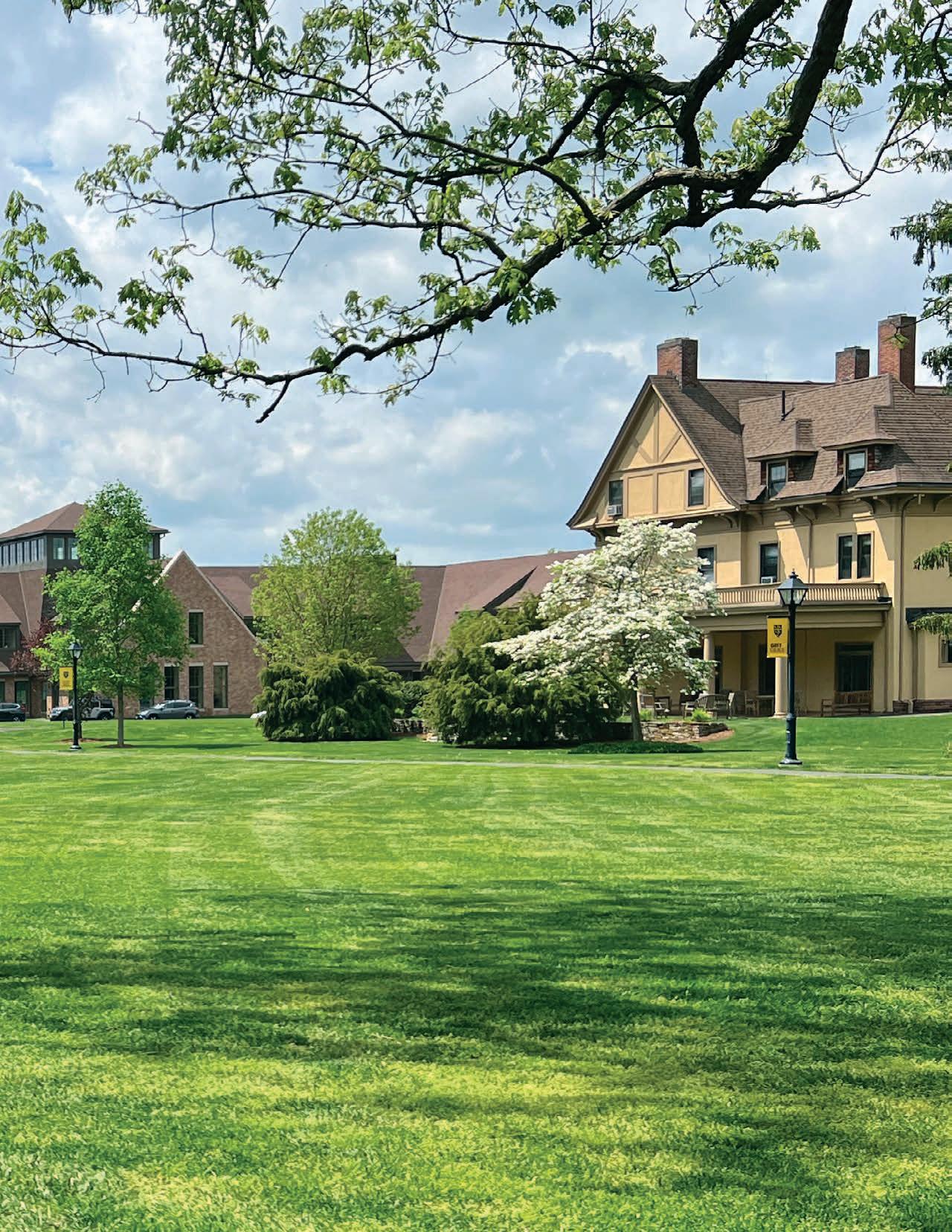
Advancement: (860) 408-3123
This magazine is produced twice a year by the Marketing and Communications Office.
Send Class Notes via email to classnotes@westminster-school.org
In keeping with our support for a diverse community, Westminster abides by all applicable federal and state laws and does not discriminate on the basis of any protected characteristic, including race, color, religious creed, sex, sexual orientation, gender identity or expression, national origin, ancestry and/or disability.
Moyahoena Ogilvie ’86 Emerita Bloomfield, Conn.
Mary Minns Peck ’90 Denver, Colo.
C. Bradford Raymond ’85, P’19, ’20, ’24, ’24 Chair of the Board New York, N.Y.
Thomas D. Sargent II ’77, P’10 West Hartford, Conn.
Helen Lin Sun P’24 Wanchai, Hong Kong
Samuel Thorne ’46, P’74, ’76 Emeritus Bedford, Mass.
Kirsten Sichler Webb ’98 Greenwich, Conn.
Elaine White Ex officio Simsbury, Conn.
Sara L. Whiteley ’91 West Chatham, Mass.
Benjamin D. Williams IV ’81 Carpinteria, Calif.
Julie Wurts P’22, ’24 Ex officio Stanfordville, N.Y.
Ben Wurts P’22, ’24 Ex officio Stanfordville, N.Y.
Editor Wendy Carlson
Associate Director, Publications & Communications wcarlson@westminster-school.org
Director of Marketing and Communications Jeff Kennard P’19
Photography
Seshu Badrinath, Wendy Carlson and Kelly Lucas
Design
John Johnson Art Direction & Design Riverton, Conn.
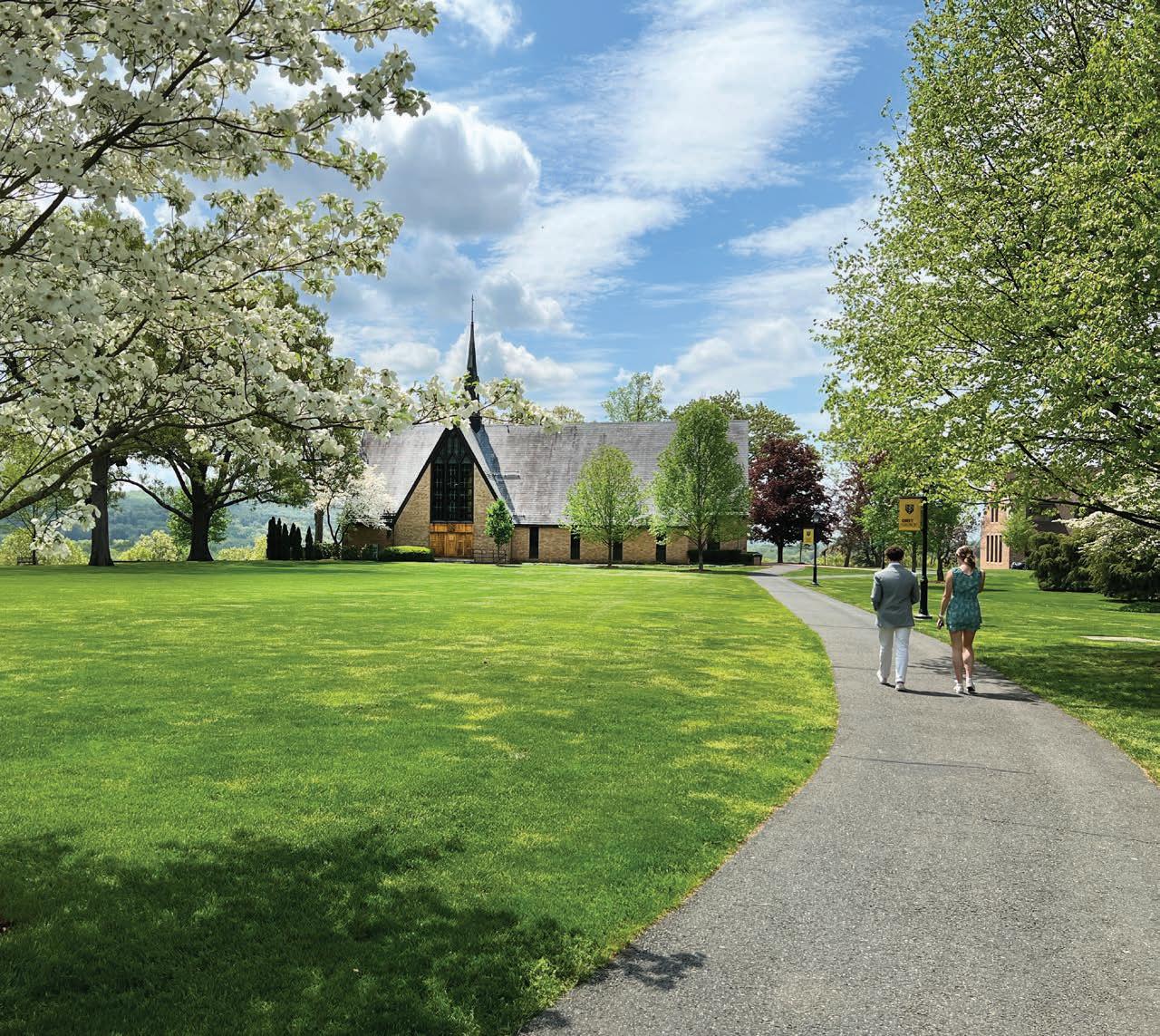
www.Westminster-School.org
995 Hopmeadow Street
The Trustees of Westminster School, Inc.
Simsbury CT 06070







 Elaine White Head of School
Elaine White Head of School
































































































































































 By Shana Russell P’26 Associate Director of College Counseling, John Hay Society Advisor, Chapel Coordinator
By Shana Russell P’26 Associate Director of College Counseling, John Hay Society Advisor, Chapel Coordinator

